Freedom to Write Index 2021
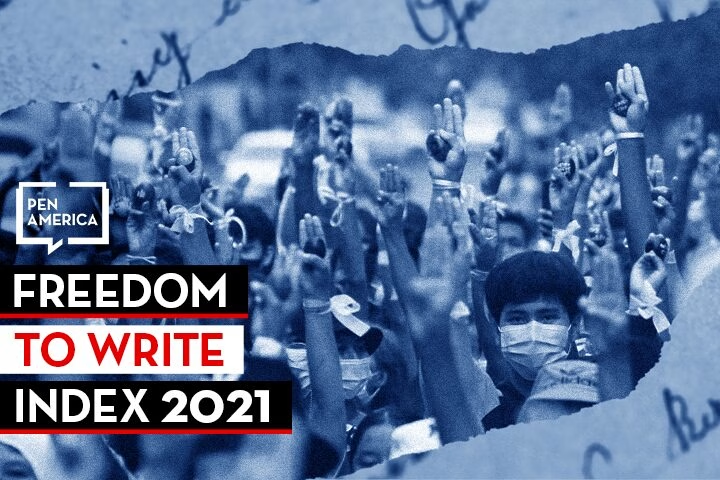
Key Findings:
Finding 1
Finding 2
Finding 3
This report reflects PEN America’s 2021 Index findings. For our complete, up-to-date database, see the Writers at Risk Database.
Introduction
On February 1, 2021, a military coup violently disrupted Myanmar’s fragile and uncertain experiment with civilian rule. Writers and filmmakers were among those immediately imprisoned. Protesters and poets were soon shot in the streets. As this report goes to press, the world’s eyes are on Russia’s brutal, devastating assault on Ukraine—its people, language and culture, and democracy. Putin’s unbridled aggression, however, is part of a larger resurgence of authoritarianism around the globe.
The past year has repeatedly seen authoritarian forces seek to reclaim powers and territories that had previously passed outside their control; the echoes of the past are heard not only in Europe, but in Myanmar, where the military’s naked attempt to retrieve its lost power brought shock, horror, and then resistance; and in Afghanistan, where the Taliban’s swift recapture of the country following U.S. military withdrawal seemed to—almost overnight—decimate the progress Afghans had painstakingly made over the last 20 years and are struggling to uphold, including with regard to women’s rights, freedom of expression, cultural and artistic creativity, and the development of independent media. From Tunisia to Sudan to Nicaragua, old forces re-exerted themselves and moved to quash democratic progress. And in Hong Kong, a city with a robust history of vibrant freedoms, the reach of the Chinese government has been extended, most formally in the application of the National Security Law against writers and independent media. This has not only led to a crackdown, but also created a climate of looming fear and a sense that safety may only lie in silence, or exile. In Russia, a concerted effort to eliminate what remained of independent media and the space for dissent over recent years laid the groundwork for Putin to maintain total information control in wartime.
In democracies as well, authoritarian tactics are being employed. Censorship and intimidation of dissenting voices is rife in India. In the United States, efforts to ban books and enact laws that would bar discussion of certain topics in classrooms spiked in 2021. Much of this debate centered around the freedom to contend with and openly debate the complexities of history. This, too, has echoes around the globe. Just before Russian troops began this latest incursion into Ukraine, Putin gave a speech in which he attempted to rewrite Ukraine’s history to suit his own ends. For years now, Putin has held in prison the historian Yury Dmitriev on specious charges of child pornography; Dmitriev’s true crime was uncovering and documenting mass graves from the Stalinist era, a historical truth that contradicted Putin’s attempts to whitewash and glorify the memory of Stalin. Government attempts to silence those who study, document, and debate history are typically also an attempt to exert a sole narrative over the past, one that serves the interests of the present.
Yet in all of these cases, authoritarian regimes have been met with resistance. In Myanmar, widespread and sustained civil disobedience—including the creative resistance of writers and artists—followed the coup. Afghan women refused to be silenced and they, too, have taken to the streets. Belarusians have continued their resistance against a president holding onto power despite an election he seemed to think he could steal without a fight. And today, Putin must contend not only with the fierce resistance of the Ukrainian people, but also Russians inside the country and around the world who persist in speaking the truth.
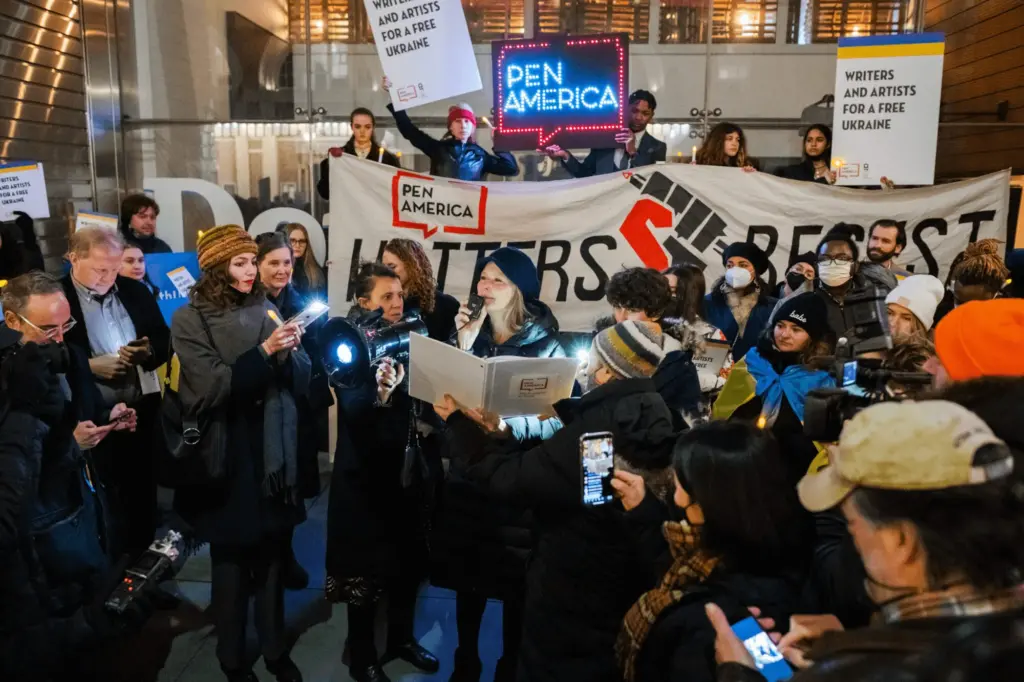
As truth-tellers, creative visionaries, and documentarians, writers have been at the forefront of these movements to resist authoritarianism, and they have been targeted as a result. The Iranian Writers’ Association has become a prime target of its government for its persistence in celebrating literature, condemning censorship, and commemorating past attempts to silence Iranian writers. PEN America’s sister organization PEN Belarus, despite being formally dissolved by a Belarusian court in August 2021, perseveres in documenting its government’s assaults on writers, artists, and all those who insist on their right to speak freely.1PEN America, “Court Formally Dissolves PEN Belarus,” press release, August 9, 2021, pen.org/press-release/court-formally-dissolves-pen-belarus/ Myanmar’s creative community has braved brutal violence and used their writing and artwork to resist the coup and represent the public’s demands for freedom.2“Stolen Freedoms: Creative Expression, Historic Resistance, and the Myanmar Coup,” PEN America, December 16, 2021, pen.org/report/stolen-freedoms-creative-expression-historic-resistance-and-the-myanmar-coup/ Cuban artists and writers have persisted, despite repeated arrests, in critiquing their government and calling for change.
In these countries and others, and as PEN America’s Freedom to Write Index documents, writers and public intellectuals have been unjustly locked up for their exercise of free expression; dozens are currently serving sentences of 10 years or more for their words. In countries notorious for poor prison conditions, the mistreatment of political prisoners through solitary confinement or torture has been compounded by the grave threats to their health posed by COVID-19 and its spread inside jails. But governments’ attempts to muzzle dissent have failed to extinguish individual writers’ voices. In the face of repression, literary communities have come together in defense of writers under threat; writers in prison have gone on hunger strikes—not to call for their own release, but on behalf of others unjustly jailed. Translators have made threatened writers’ words available to a global audience. And across the world, advocates and allies have read aloud the words of those whose governments would see them silenced, and shared the work of those whose governments would see it destroyed. And that work has offered hope to all who seek to push back against the forces of repression.
In the face of an authoritarian resurgence, writers are at the forefront of the defense of free expression and also have an essential role to play, pushing back against attempts to control the narrative; sustaining cultures and languages under threat; holding governments to account—on issues as varied as corruption, their response to COVID-19, or upholding basic rights; and envisioning new possibilities for the future. The freedom to write guarantees our collective ability to imagine and to inspire, and it demands our defense.
During 2021, at least 277 writers, academics, and public intellectuals in 36 countries—in all geographic regions around the world—were unjustly held in detention or imprisoned in connection with their writing, their work, or related advocacy.
The Global Picture
During 2021, according to data collected for the Freedom to Write Index, at least 277 writers, academics, and public intellectuals in 36 countries—in all geographic regions around the world—were unjustly held in detention or imprisoned in connection with their writing, their work, or related advocacy. This number is slightly higher than the 273 individuals counted in the 2020 Freedom to Write Index, and significantly higher than the total in 2019 (238). By far the most significant increase was seen in Myanmar, as a result of the crackdown that followed the military coup there on February 1, 2021, which has included the deliberate targeting of writers and the broader creative community. The numbers of those detained in Saudi Arabia, Turkey, and Belarus dropped from 2020, although many of those released from prison in Saudi Arabia continue to face draconian, unjust conditions on their release, including constraints on their freedom of movement and expression. In Belarus, the sharp uptick in detentions—many of them short-term—that accompanied the protests after the stolen election of August 2020 dropped off, though 2021 increasingly saw targeted arrests of writers and others who continued to speak out, and longer-term detentions.
Writers Imprisoned Globally: 2021
A worsening and in some cases violent closure of civil society in many countries led to a reshuffling of the world’s top jailers of writers and public intellectuals. Two countries, however, remained stable in their notoriously high rankings: China and Saudi Arabia remained the first and second-worst jailers of writers, with 85 and 29 writers detained, respectively. Myanmar escalated to the third-worst jailer of writers and public intellectuals, with 20 individuals newly detained in 2021 and 26 total behind bars; Myanmar was jointly ranked ninth last year with 8 detentions. These three countries alone accounted for half of all cases, just over 50 percent of the total. Myanmar catapulted into third place due to a widespread crackdown on civil society and free expression in the wake of the February 2021 coup, in which the military seized power and prevented the elected parliament from forming a new government. Many writers, creative artists, and influential cultural figures were targeted during the first hours of the coup; over the course of 2021, at least 26 detentions of writers and intellectuals were documented.
In Iran, a significant uptick was also documented: at least 21 writers were in prison or detention during the year, remaining the fourth-worst jailer of writers around the world as documented in 2020. While some writers counted in Iran in the 2020 Index have been released, at least 8 writers were newly jailed during 2021. Rounding out the top five with 18 writers held in detention—compared to 25 last year—is Turkey, where a decline was documented due to the welcome release of writers; some had been detained for more than four years. Other prevalent threats against writers in Turkey such as physical attacks and protracted legal trials, even against writers in exile, were documented throughout 2021, though not captured in this figure.
As has been documented previously in the Freedom to Write Index, the overwhelming majority of writers and public intellectuals held behind bars during 2021 are men. This disparity has widened: women comprise 12 percent of the 2021 Index count, as compared to 16 percent in 2019. Countries that have detained the highest number of women writers and public intellectuals track closely with those who have jailed the highest total number of writers. Collectively, authorities in China, Myanmar, Saudi Arabia, Iran, and Turkey—the top five countries that jailed the most writers during 2021—accounted for 27 of the 33 women writers in the 2021 Index. The remaining six women writers were jailed in Egypt, Belarus, India, and Vietnam, all countries ranking in the top 10 worst jailers of writers.
While many writers included in the Index hold multiple professional designations and are, for example, both literary writers and poets, the most prevalent professions of those incarcerated in 2021 were literary writers (111), scholars (59), poets (68), singer/songwriters (27), publishers (12), editors (9), translators (8), and dramatists (4). Notably, the number of poets jailed during 2021 increased compared to the 57 jailed during 2020, likely reflecting the bold stance many poets have taken on sensitive political and social themes, as well as the key role they have played in pushing back against authoritarianism in countries like Myanmar. Of the 277 individuals counted in this year’s Index, 4 died while in custody and 197—nearly three-quarters—remain in state custody at the time of this report’s publication. By holding these individuals behind bars, their governments are depriving them of their individual right to free speech, while also robbing the broader public of access to their innovative and influential voices of dissent, criticism, creativity, and conscience.
The majority of the writers and intellectuals included in the 2021 count were initially imprisoned or detained prior to 2021, or had faced previous detention or imprisonment. Of the 277 in prison or detention during 2021, roughly 72 percent had also spent multiple days behind bars in 2020. A smaller but significant subset of these writers, roughly 53 percent, were counted in the 2019 and 2020 Indexes as well. In addition to long-term imprisonments, this percentage includes cases of writers who have been repeatedly detained and released over the course of the past three years, indicating the continued pressure and repression many writers face. This year’s count of 277 also includes 15 cases of individuals who were detained or imprisoned prior to 2021 but whose status, or further information about their case and writing only became publicly known during the past year. Such cases are common, especially in environments where there is little transparency to the judicial process, extensive surveillance and self-censorship, and extremely limited access to information or media freedom; for example, China, including Tibet and Xinjiang, accounts for 7 of these 15 cases. In many such cases, detention is not confirmed until formal charges are brought. The 2021 Index includes 60 writers and intellectuals, in 20 different countries and territories, who were newly detained or imprisoned in 2021—a decline in new detentions and imprisonments in comparison to 2020.
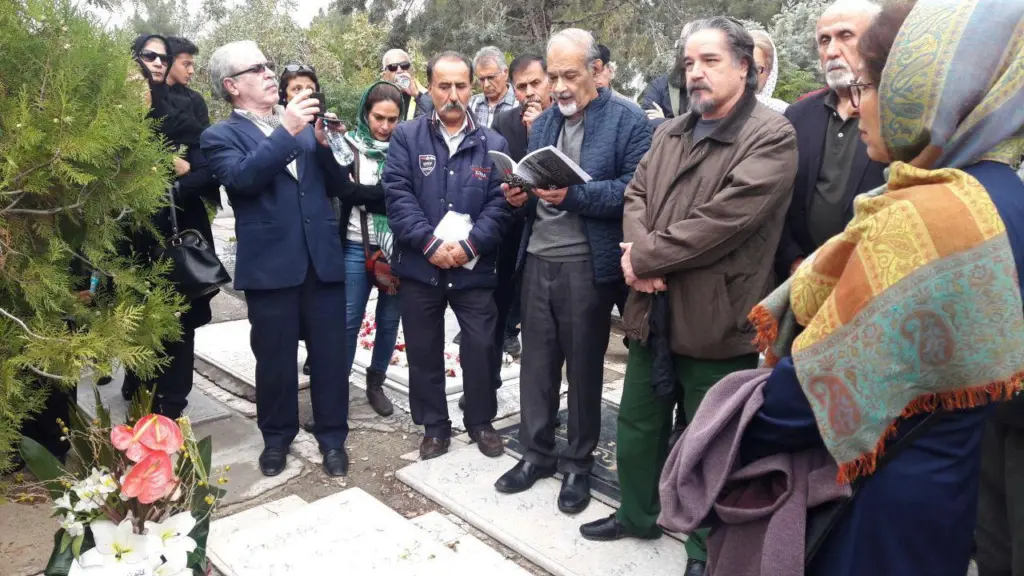
Regarding the types of legal charges brought against jailed writers, many of the trends documented in the 2019 and 2020 Freedom to Write Indexes persisted in 2021. Threat to national security remains the primary category of legal charges that authorities around the world use to justify jailing writers and public intellectuals: at least 55 percent of detentions are based on allegations that writers have undermined national security. Examples of these charges include “membership in a banned group,” which are in some cases levied against writers for belonging to writers’ associations or cultural organizations; and “conspiracy to seize” or “subversion of” state power, often levied against writers who analyze politics, participate in public discourse, or write critically about government affairs. Other less widespread but frequent charges wielded against writers and public intellectuals include illegal assembly and organizing; retaliatory criminal charges such as tax crimes, fraud, and “resistance”; and criminal insult or defamation laws.
Situations in which charges are undisclosed or have yet to be brought against a writer—otherwise known as arbitrary detentions—made up at least 22 percent of the cases in this year’s Index. Arbitrary detentions represent a total lack of due process and deny writers and public intellectuals any recourse to challenge the claims against them; in some cases, they can last for decades. All eight of the cases counted in Eritrea are considered arbitrary, as few details have been disclosed in these cases, and the writers have been held incommunicado, several of them since 2001. Cases of arbitrary detention are also particularly common in Saudi Arabia, where at least 66 percent of the writers and public intellectuals jailed in 2021 were held for no stated reason. This staggering fraction is identical to the percentage documented in 2020, indicating that the prevalence of arbitrary detention has seen no change over the past year. Roughly 53 percent of the writers and public intellectuals in the Xinjiang Uyghur Autonomous Region of China have been detained or imprisoned without legal justification. In contrast, China—when excluding autonomous and special administrative regions—has only one case of arbitrary detention: poet Cui Haoxin, also known as An Ran.
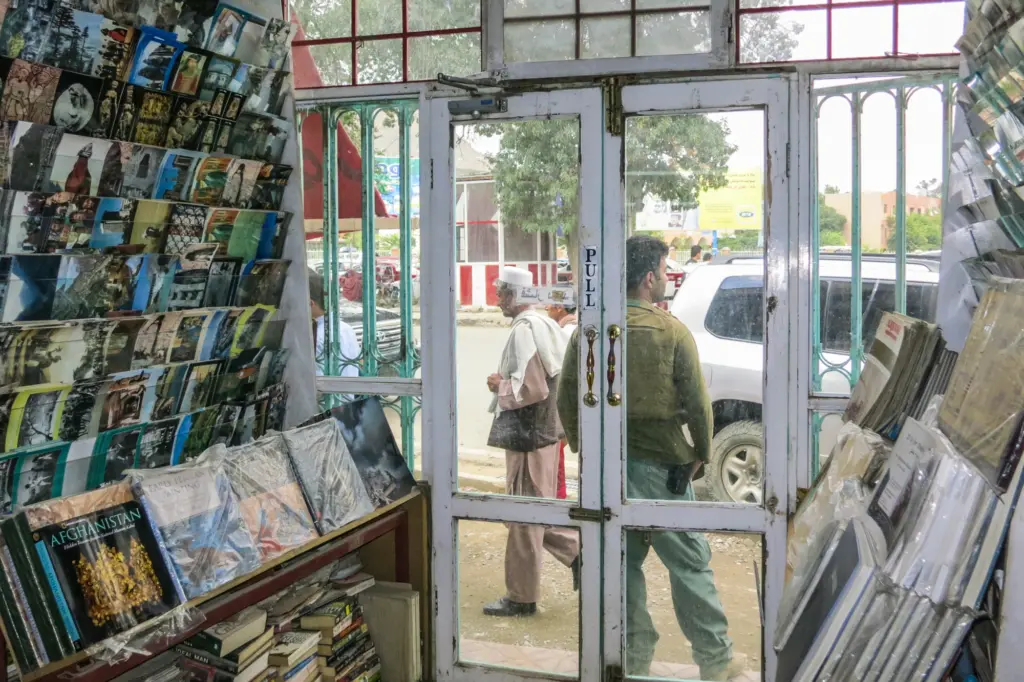
Several places where free expression was severely under threat in 2021 nonetheless do not make a significant appearance in the Index. The return to power of the Taliban in Afghanistan has had a devastating impact on freedom of expression and placed writers, artists, and public intellectuals—especially women and members of ethnic and religious minority groups—in grave danger, yet few detentions have been recorded in the initial months following their takeover. The introduction of the oppressive National Security Law in Hong Kong in 2020 has seemingly only led to a handful of new cases of writers behind bars, and despite the further crackdown on free expression in Russia, it does not appear among the countries most responsible for detaining writers and intellectuals. This illustrates that while these numbers are an important indicator of the gravity of threats writers and intellectuals face for exercising their freedom of expression, they tell only part of the story of how free expression may be chilled.
While the COVID-19 pandemic has not, by and large, led to the more dramatic society-wide crackdowns on free expression that initially seemed possible, it has nonetheless had an insidious effect on writers and public intellectuals around the world, with the introduction of new “fake news” laws targeting dissent, new and subtle forms of surveillance, reduced opportunities for global connection and income, and the erosion of support systems that individuals under threat rely on to continue their work. It has also continued to vastly increase the health risks for writers behind bars. As the difference in the pandemic’s trajectory across countries becomes more stark, it is essential for advocates to keep top of mind the impact it continues to have on writers under threat, and especially those from already vulnerable communities.
Regional Breakdown
Governments in the Asia-Pacific region continued to jail the most writers and intellectuals for their writing or expression, with their share of the global total increasing in 2021, largely due to the crackdown in Myanmar. In total, 137—or nearly half of the global count—were jailed in countries in the Asia-Pacific, with the vast majority of those, 85, held in China. Following the February 2021 coup, Myanmar catapulted up to second in the region, with 26 held, while significant numbers continued to be jailed in Vietnam (10) and India (8). Countries in the Middle East and North Africa have also jailed significant numbers of writers and intellectuals, most notably Saudi Arabia (29), Iran (21), and Egypt (14). Countries in this region made up nearly 30 percent of the global count of imprisoned and detained writers, at least 82 individuals, in 2021.
Detentions and imprisonments of writers and intellectuals in Europe and Central Asia—accounting for 14 percent of the global total—occurred largely in two countries: Turkey and Belarus. Turkey moved to the fifth-place position, having held 18 of the 39 prisoners and detainees in Europe and Central Asia during 2021. The ongoing crackdown against those who have vocally opposed Belarus’s stolen 2020 presidential election continued to result in arrests and detentions in 2021, placing Belarus in seventh place worldwide, with 10 writers counted in the Index. Countries in sub-Saharan Africa contributed to roughly 4 percent of the 2021 Index, with 11 writers and public intellectuals detained or imprisoned. The vast majority of those were in Eritrea, which placed 10th with 8 writers behind bars. In the Americas, only Nicaragua and Cuba are represented, making up 3 percent of the 2021 Index total. Detentions of writers and public intellectuals in Cuba account for 7 of the 8 writers detained or imprisoned.
Top 10 Countries of Concern
China continued to top the list of countries detaining writers and intellectuals, with 85 detained or imprisoned in 2021, far more than any other country. Following China, the other top jailers of writers and intellectuals were Saudi Arabia, Myanmar, and Iran, each of which engaged in a concentrated targeting of dissenting voices in 2021 and held 20 or more writers behind bars. Saudi Arabia’s overall numbers decreased slightly from 2020 due to significant numbers of political prisoners being conditionally released during 2021, as did overall numbers in Turkey, where a handful of writers were additionally released upon completion of their years-long sentences. There was a considerable jump in detentions in Myanmar in the wake of the February 2021 coup, after which writers and creative artists were targeted for arrest alongside politicians and other influential figures. A smaller increase was apparent in Iran due to an ongoing crackdown against dissenting voices in which a number of writers were newly detained or summoned to serve previously imposed sentences in 2021.
China
During 2021, China remained stable in its position as the top jailer of writers and public intellectuals in the world. The total number of writers and public intellectuals in China, which includes the Xinjiang and Tibetan Autonomous Regions and Hong Kong, increased slightly from 81 to 85. The vast majority of these 85 writers have been in prison for at least several years, with 53 of them having been counted in both the 2019 and 2020 Freedom to Write Index reports as well. The myriad reasons that the authorities jail writers in China vary; writers whose words question prevailing public opinions or challenge the Chinese Communist Party (CCP) narratives are especially at risk of detention and imprisonment. And the Chinese government’s response to writers and public intellectuals exercising their universal rights to free expression is swift and wide-ranging.
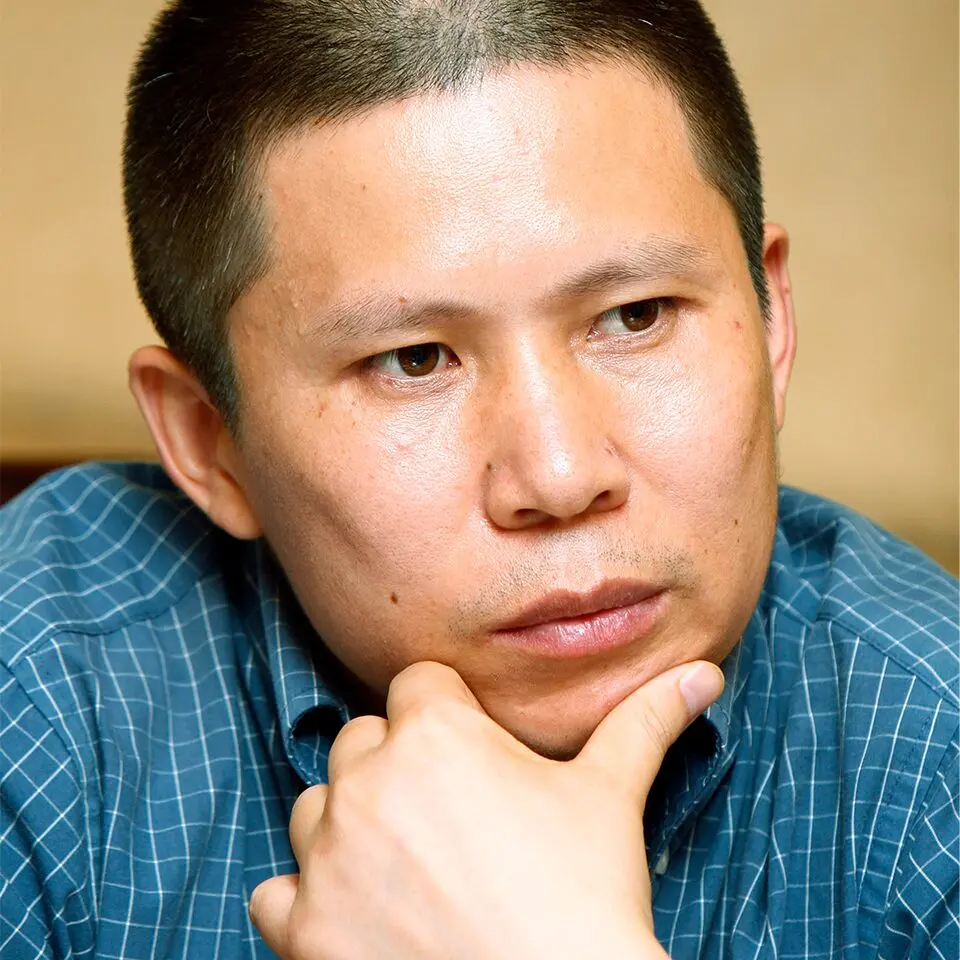
Xu Zhiyong was arrested after publishing critical online commentaries of Chinese government policies and President Xi Jinping. (Photo by AP/Greg Baker)
Within China (excluding Tibet, Xinjiang, Hong Kong, and Inner Mongolia3The Inner Mongolia Autonomous Region has been included in previous publications of the Freedom to Write Index, but PEN America did not identify cases of detained or imprisoned writers or public intellectuals in the Inner Mongolia Autonomous Region during 2021 according to our methodology.), PEN America places the number of imprisoned writers or public intellectuals at 38. This number includes many writers and dissidents who have criticized government policy or the CCP’s leadership. The initial rationales for detaining these writers are often unstated or unclear, demonstrating the outsized scope of writing, speech, and other forms of expression that can be potentially considered “criminal.” Detained dissident writer Guo Quan’s trial for criticizing the government’s response to the COVID-19 pandemic online began in September 2021. According to Guo’s lawyer, the prosecution cited almost 20 articles Guo wrote in its case against him for “inciting subversion of state power.” His articles criticized the CCP’s response to the pandemic, but his writings about social injustice and government corruption were also cited as evidence.4Debi Edward, “The missing number behind China’s coronavirus crisis,” ITV News, February 21, 2020, itv.com/news/2020-02-21/the-missing-number-behind-china-s-coronavirus-crisis; Xue Xiaoshan, “Veteran Chinese Democracy Activist Stands Trial For ‘Subversion’ Over Articles,” Radio Free Asia, September 10, 2021, rfa.org/english/news/china/trial-09102021103820.html In 2020, Xu Zhiyong, an essayist, legal scholar, and critic of President Xi’s policies, was initially detained on the same charge; but during January 2021, authorities escalated the charges from “inciting subversion” to “subversion,” increasing his potential sentence to life in prison.5PEN America, “Reports: China to Escalate Charges Against PEN America Honoree Xu Zhiyong,” press release, January 22, 2021, pen.org/press-release/reports-china-to-escalate-charges-against-pen-america-honoree-xu-zhiyong/ Artist, activist, and online writer Chen Yunfei was detained on March 25, 2021, on the charge of “picking quarrels and provoking trouble,” after he published his thoughts on China’s nine-year compulsory education law based on his visits to schools in the Sichuan province. In contrast with President Xi’s declared emphasis on “rule of law,” the law against “picking quarrels” has been used by authorities as a catch-all criminal provision that is unclear, broad, and confusingly applied.6Guo Rui, ‘Picking quarrels and provoking trouble’: how China’s catch-all crime muzzles dissent,” South China Morning Post, August 25, 2021, scmp.com/news/china/politics/article/3146188/picking-quarrels-and-provoking-trouble-how-chinas-catch-all In December 2021, Chen was ultimately convicted of a different crime—he was sentenced to four years in prison for a retaliatory charge of “child molestation.” Chen vehemently rejects the charge as intended to discredit his work and slander his reputation.7Sun Chen, “Court in China’s Chengdu jails veteran rights activist on ‘trumped-up charge’,” Radio Free Asia, December 6, 2021, rfa.org/english/news/china/charge-12062021141519.html
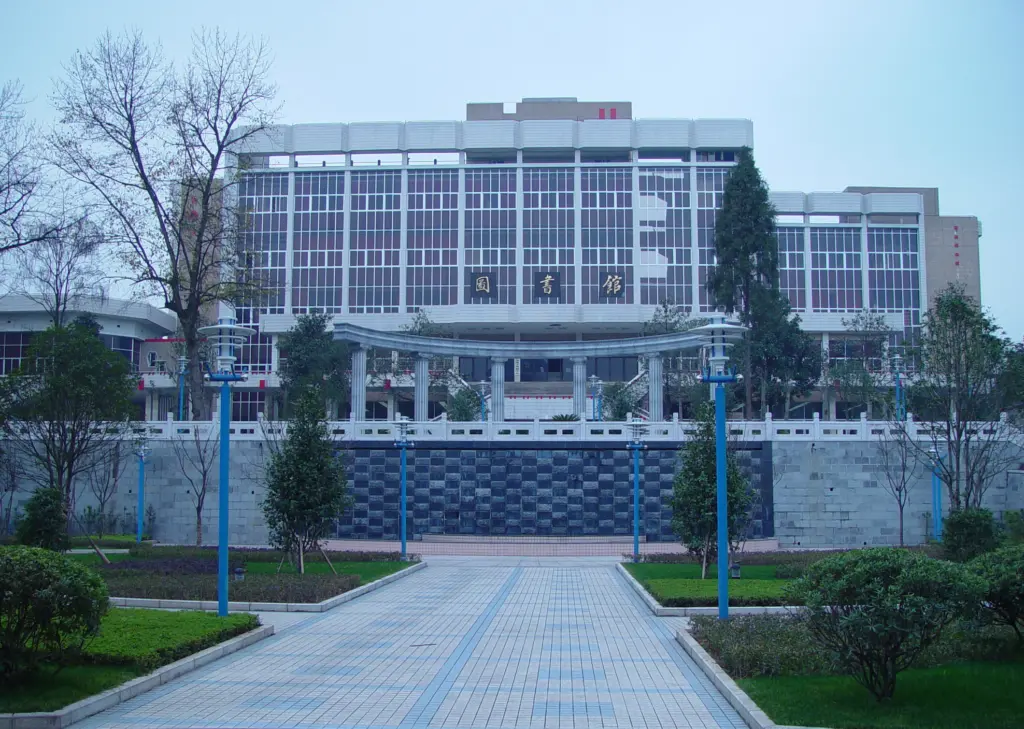
In some cases, a writer’s mere public stature and past history as a person critical of the government is reason enough for Chinese authorities to jail them. In May 2021, writer and former Guizhou University economics professor Yang Shaozheng went missing. Though no reason has yet been disclosed for his arrest, Yang had been dismissed from Guizhou University in 2018 for writing two articles that questioned the CCP; specifically, the monetary costs of the party’s millions of official personnel.8Editorial Board, “Opinion: A professor dared tell the truth in China—and was fired,” The Washington Post, August 23, 2018, washingtonpost.com/opinions/a-professor-dared-tell-the-truth-in-china–and-was-fired/2018/08/23/9fd81eee-a653-11e8-a656-943eefab5daf_story.html In June 2021, Yang was charged with “inciting subversion of state power” and placed under residential surveillance in a designated location (RSDL),9“Locked Up: Inside China’s Secret RSDL Jails,” Safeguard Defenders, October 5, 2021, safeguarddefenders.com/sites/default/files/pdf/Locked%20Up%20%28High%20Res%20version%29.pdf a form of extrajudicial detention. At the end of 2021, he was formally arrested and reported to be held at a detention facility in Guiyang City.10“前贵州大学教授杨绍政被正式批捕 (Yang Shaozheng, former professor of Guizhou University and critic of government policies, is formally arrested),” Radio Free Asia, November 11, 2021, rfa.org/mandarin/Xinwen/6-11112021115902.html Outspoken poet Zhang Guiqi, also known as Lu Yang, was arrested on the same charge for undisclosed reasons. He was detained throughout 2021 in Shandong, after a secret trial in September 2020 in which no sentence was announced.11“256. Zhang Guiqi,” Independent Chinese PEN Center, accessed February 24, 2022, chinesepen.org/english/256-zhang-guiqi Experts suspect his detention is related to a video in which he called on President Xi to resign, but reiterate that the lack of legal transparency makes the exact reason difficult to discern.12“Police in China’s Shandong Detain Outspoken Poet For ‘Subversion’,” Radio Free Asia, May 14, 2020, rfa.org/english/news/china/poet-detained-05142020134933.html Hui Muslim poet Cui Haoxin, also known by his pen name An Ran, was arbitrarily detained in early January 2020 and has not been heard from since. Cui used online platforms and poetry to write about and protest the Chinese government’s mistreatment of Muslim minorities, including the mass detentions of Uyghurs in Xinjiang.13“China Detains Hui Muslim Poet Who Spoke Out Against Xinjiang Camps,” Radio Free Asia, January 27, 2020, rfa.org/english/news/china/poet-01272020163336.html; Associated Press, “Chinese Muslim poet Cui Haoxin fears his people will suffer as history repeats itself in wave of religious repression,” South China Morning Post, December 28, 2018, scmp.com/news/china/politics/article/2179831/chinese-muslim-poet-fears-his-people-will-suffer-history-repeats Employing arbitrary detention and vague charges—many of which international jurists have decried as in contravention with rights to free expression and due process—Chinese authorities continue to demonstrate their sweeping ability to jail writers and public intellectuals.
妻子的遭际令我痛彻心肺,每延迟一天于我都是精神酷刑。诸位公仆亦为人夫,想必亦有常人共情同理之心,应该能够想象和体谅我的这份锥心之痛。
My wife’s experience brought deep sorrow upon me, and every delay of a day is a mental torture. Your public servants are also husbands, and you must have empathy with ordinary people. You should be able to imagine and understand my heart-wrenching pain.
After being detained even once, writers can face intensified surveillance and restrictions on their travel and must essentially continue to live with targets on their backs, under constant threat of being captured again. Writer and democracy activist Yang Maodong, also known by his pen name Guo Feixiong, was detained at Pudong International Airport in Shanghai in late January 2021, when he tried to visit his ailing wife in the United States.14Chris Buckley, “A Chinese Dissident Tried to Fly to His Sick Wife in the U.S. Then He Vanished,” The New York Times, February 2, 2021, nytimes.com/2021/02/02/world/asia/china-dissident-yang-maodong.html Authorities in Guangzhou had confiscated Yang’s passport after his 2019 release from a politically motivated prison sentence. The day before he planned to fly, Yang had written an open letter to President Xi Jinping and Premier Li Keqiang, urging them to allow him to travel on humanitarian grounds. Instead, authorities forcibly disappeared him; a year later—and two days after his wife’s death—Yang was formally arrested for “inciting subversion of state power.”15Helen Davidson, “Chinese activist told he could not visit dying wife is re-arrested,” The Guardian, January 18, 2022, theguardian.com/world/2022/jan/18/chinese-activist-yang-maodong-told-he-could-not-visit-dying-wife-is-re-arrested Writer and #MeToo activist Sophia Huang Xueqin, who previously served four months in detention for her public support of sexual assault victims, was also forcibly disappeared while trying to leave China, en route to study at the University of Sussex in England in September 2021. Despite returning Huang’s passport earlier in 2021 and continuing to surveil her for a year after her release, Chinese authorities secretly detained Huang in RSDL and later transferred her to a Guangzhou detention facility for “inciting subversion of state power.16Alice Su, “They helped Chinese women, workers, the forgotten and dying. Then they disappeared,” Los Angeles Times, December 1, 2021, latimes.com/world-nation/story/2021-12-01/china-disappearances-gender-labor-class The trial of writer and poet Xie Fengxia, for “picking quarrels and provoking trouble,” began in April 2021. Just two years prior, Xie was released from prison; but he was surveilled, followed by local authorities, and “invited” for questioning at police stations following his release. After posting a poem commemorating Lin Zhao, a dissident of the Cultural Revolution, he was promptly detained again.17“185. Xie Fengxia,” Independent Chinese PEN Center, accessed February 24, 2022, chinesepen.org/english/185-xie-fengxia
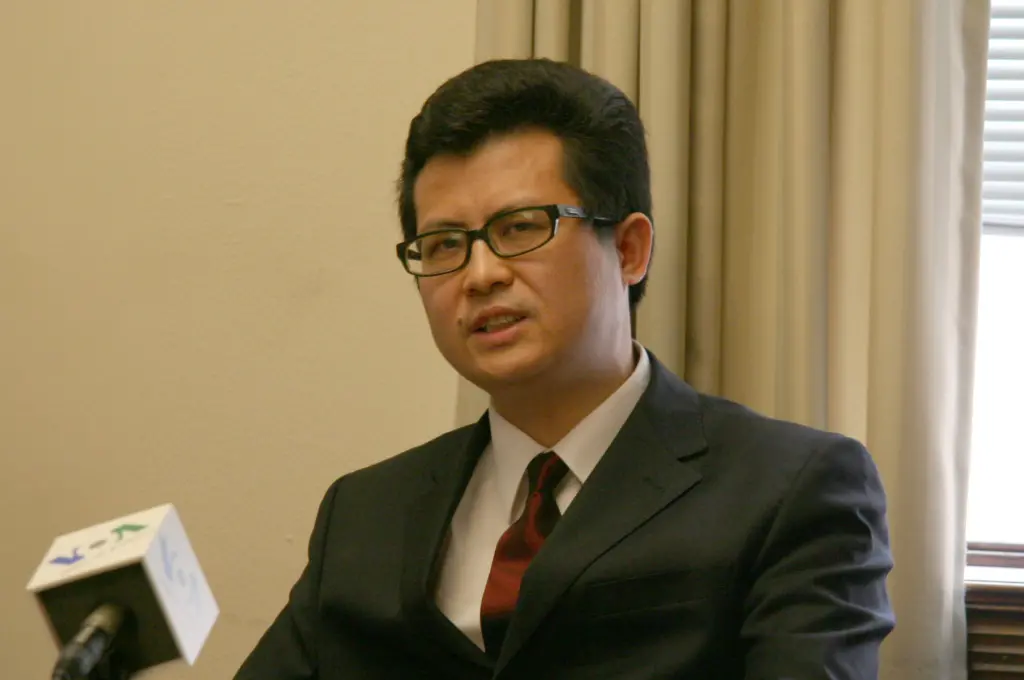
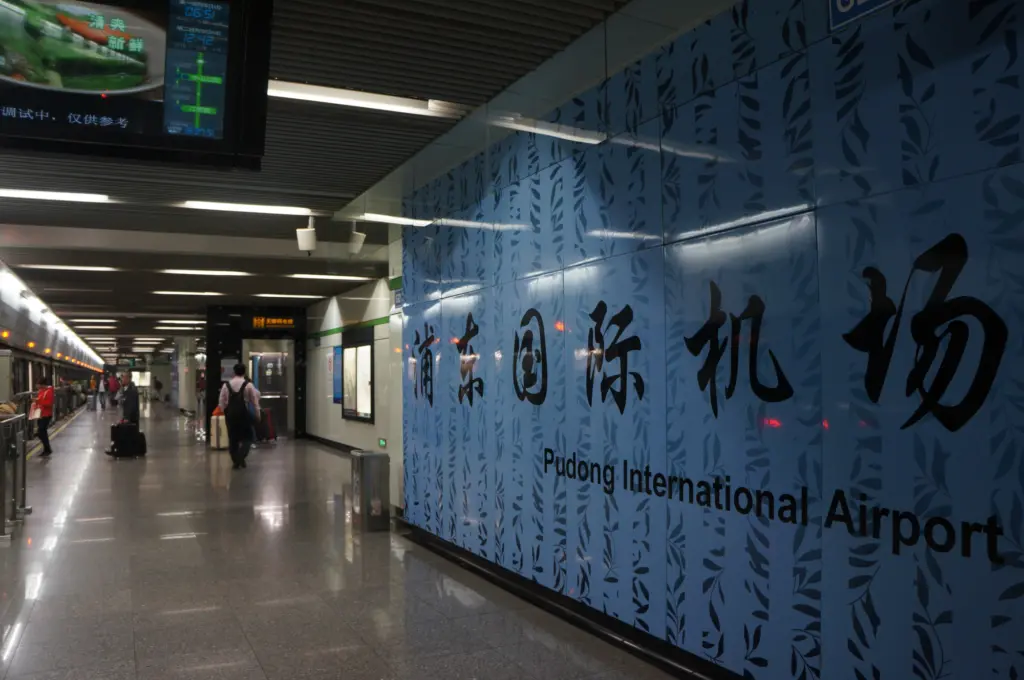
In Hong Kong, several writers were newly detained in 2021, raising the number of writers and public intellectuals jailed from last year’s three to five. The crackdown under the draconian National Security Law borrows a tactic from Beijing’s repression of free expression, resting on ambiguously defined national security crimes.18Javier C. Hernández, “Harsh Penalties, Vaguely Defined Crimes: Hong Kong’s Security Law Explained,” June 30, 2020, nytimes.com/2020/06/30/world/asia/hong-kong-security-law-explain.html Under the law’s provisions, Hong Kong authorities have detained columnists, academics, and public intellectuals who have written in support of pro-democracy protests, and levied heavy penalties against the institutions that stand by them. A number of individuals who were prominent in the 2014 Occupy Central Movement in Hong Kong were also re-detained or newly charged under the repressive provisions of the National Security Law. Legal scholar and influential pro-democracy writer Benny Tai Yiu-ting was re-detained after a revocation of his bail stemming from a 2019 politically motivated detention.19Jasmine Siu, “Benny Tai sent back to jail to await Hong Kong court’s ruling in Occupy Central appeal,” South China Morning Post, March 4, 2021, sg.news.yahoo.com/benny-tai-sent-back-jail-095645191.html Social media activist and writer Joshua Wong, who rose to prominence as a youth activist when he was first charged in 2015, faced a slew of new charges brought against him during the year under the National Security Law, in addition to past charges that kept him imprisoned throughout the year.20Reuters, “Hong Kong activist Joshua Wong jailed an additional 10 months over June 4 assembly,” CNBC, May 6, 2021, cnbc.com/2021/05/06/hong-kong-activist-joshua-wong-jailed-an-additional-10-months-over-june-4-assembly.html
The highly publicized closure of pro-democracy newspaper Apple Daily served as a bellwether of media censorship and arrests of writers. On June 17, 2021, 500 police officers raided the newspaper’s office, seized journalistic materials, and froze millions of assets.21“HK’s Apple Daily raided by 500 officers over national security law,” Reuters, June 17, 2021, reuters.com/world/asia-pacific/hong-kongs-apple-daily-newspaper-says-police-arrest-five-directors-2021-06-16 One of the first targets of the law when it was first implemented in 2020 was Apple Daily’s founder, publisher, and opinion writer Jimmy Lai, who spent the entirety of 2021 in jail. The paper’s five most senior staff were eventually arrested.22Iain Marlow, “The Assault on Apple Daily,” Bloomberg, February 3, 2022, bloomberg.com/features/2022-apple-daily-china-hong-kong-crackdown Apple Daily chief editorial writer Yeung Ching-kei and columnist Fung Wai-kong were detained less than 10 days after the raid and arrested on suspicion of violating the National Security Law.23Helen Davidson, “Hong Kong police arrest editorial writer at Apple Daily newspaper,” The Guardian, June 23, 2021, theguardian.com/world/2021/jun/23/hong-kong-police-arrest-editorial-writer-at-apple-daily-newspaper; Helen Davidson, “Hong Kong police arrest senior Apple Daily journalist at airport,” The Guardian, June 27, 2021, theguardian.com/world/2021/jun/28/hong-kong-police-arrest-apple-daily-journalist-airport-fung-wai-kong Eleven days later, the reader-funded and independent Stand News preemptively removed all of its columnists and opinion writing published before May. At the end of 2021, Stand News was also raided and shut down by the Hong Kong authorities.24“Security law: Stand News opinion articles axed, directors resign amid reported threats to Hong Kong digital outlets,” Hong Kong Free Press, June 28, 2021, hongkongfp.com/2021/06/28/security-law-stand-news-opinion-articles-axed-directors-resign-amid-reported-threats-to-hong-kong-digital-outlets/; “Hong Kong pro-democracy Stand News closes after police raids condemned by U.N., Germany,” Reuters, December 29, 2021, reuters.com/business/media-telecom/hong-kong-police-arrest-6-current-or-former-staff-online-media-outlet-2021-12-28
Hong Kong police have also targeted libraries in an attempt to bar access to pro-democracy writing and quash the potential spread of public dissent. When the law was first implemented in the summer of 2020, books by Wong were swiftly removed.25Agence France-Presse, “Democracy books disappear from Hong Kong libraries, including title by activist Joshua Wong,” Hong Kong Free Press, July 4, 2020, hongkongfp.com/2020/07/04/democracy-books-disappear-from-hong-kong-libraries-including-title-by-activist-joshua-wong In the summer of 2021, an inquiry was launched into Shek Tong Tsui Public Library after it featured books written by Jimmy Lai on a “librarian’s choice” shelf. The inquiry resulted in one unnamed librarian’s suspension and the prohibition of lending any book titles that a government department believed breached the National Security Law.26Ng Kang-chung, “Hong Kong librarian suspended after books by jailed Apple Daily founder Jimmy Lai put on recommended reading shelf,” South China Morning Post, July 1, 2021, sg.news.yahoo.com/hong-kong-librarian-suspended-books-114304238.html Later in the summer, five unnamed members of a speech therapists’ union were arrested for creating and publishing three electronic children’s books that illustrated the 2019 pro-democracy protests using imagery of sheep and wolves.27Agence France-Presse, “Five arrested in Hong Kong for sedition over children’s book about sheep,” The Guardian, July 22, 2021, theguardian.com/world/2021/jul/22/five-arrested-in-hong-kong-for-sedition-over-childrens-book-about-sheep In the face of these detentions and imprisonments, concerns about running afoul of the ambiguously defined crimes of the National Security Law have resulted in a tangible atmosphere of self-censorship. At the 2021 Hong Kong Book Fair—the first since 2019—books that could potentially be considered politically risky were culled from display, as publishers and exhibitors reportedly exercised a new spirit of self-discipline in curating their selections.28Sara Cheng and Joyce Zhou, “Self-censorship expected as Hong Kong book fair held under national security law,” Reuters, July 13, 2021, reuters.com/world/asia-pacific/self-censorship-expected-hong-kong-book-fair-held-under-national-security-law-2021-07-13 In preparation for the fair, one participating publisher said, “[W]e self-censor a lot this time. We read through every single book and every single word before we bring it here.”29Associated Press, “Self-censorship hits Hong Kong book fair in wake of national security law,” The Guardian, July 15, 2021, theguardian.com/books/2021/jul/15/self-censorship-hits-hong-kong-book-fair-in-wake-of-national-security-law
Legal charges brought against writers in the Tibetan Autonomous Region are often related to spurious national security crimes, or undisclosed to the public.
In Tibet, the number of writers and public intellectuals detained or imprisoned during 2021 increased from six to eight. Writers and public intellectuals are commonly detained for reasons ranging from critically responding to state encroachments on Tibetan language and education, to alleged displays of support for the Dalai Lama, to broader expressions of support for free expression or denunciations of censorship. The charges brought against them are often related to spurious national security crimes, or are undisclosed to the public. In March 2021, writer Gangkye Drubpa Kyab—a poet, teacher, former political prisoner, and author of books on the 2008 Tibetan unrest—was arrested in Kardze, but his whereabouts and the charges against him remain unknown.30Choekyi Lhamo, “Chinese police detain six noted Tibetans in Kardze,” Phayul, April 15, 2021, phayul.com/2021/04/15/45489 Prominent writer Go Sherab Gyatso disappeared in October 2020, and later appeared in state custody in the Tibetan Autonomous Region. In 2021 the Chinese government responded to a United Nations request for further information about Go Sherab Gyatso’s incommunicado detention and reasons for his arrest, claiming that he was detained for “inciting secession.” Four months later, he was sentenced to 10 years in prison on the charge, which rights groups and his relatives believe is in connection with his writing that touched on Tibetan politics and free expression.31“Arbitrarily detained Tibetan Scholar, Go Sherab Gyatso covertly sentenced to 10 years,” Central Tibetan Administration, December 16, 2021, tibet.net/arbitrarily-detained-tibetan-scholar-go-sherab-gyatso-covertly-sentenced-to-10-years; Lhuboom, “Tibetan writer given 10-year prison term in secret trial,” Radio Free Asia, December 10, 2021, rfa.org/english/news/tibet/trial-12102021135859.html; “China: Release Tibetan scholar Gō Sherab Gyatso from arbitrary detention,” Tibetan Centre for Human Rights and Democracy, April 16, 2021, tchrd.org/china-release-tibetan-scholar-go-sherab-gyatso-from-arbitrary-detention In a similarly clandestine fashion, poet and writer Gendun Lhundrub has remained in detention without trial or public information about his arrest since December 2020.32“Qinghai monk writer missing for more than a year after Chinese ‘arrest’,” Tibetan Review, January 26, 2022, tibetanreview.net/qinghai-monk-writer-missing-for-more-than-a-year-after-chinese-arrest
The majority of cases in Tibet include writers who have been imprisoned for multiple years. Well-known online writer and editor of the first-ever Tibetan literary website Chomei, Kunchok Tsephel Gopey Tsang had been in prison since 2009 for “leaking state secrets.” While no evidence for this charge has been made public, it is likely related to his website and writing focused on Tibetan literature; Chomei had been censored online prior to Kunchok Tsephel Gopey Tsang’s imprisonment.33“Founder of Tibetan cultural website sentenced to 15 years in closed-door trial in freedom of expression case,” International Campaign for Tibet, November 16, 2009, savetibet.org/founder-of-tibetan-cultural-website-sentenced-to-15-years-in-closed-door-trial-in-freedom-of-expression-case; “Tibetan Literary Website Founder Sentenced to 15 Years in Prison,” Free Tibet, accessed March 11, 2022, freetibet.org/freedom-for-tibet/political-prisoners/case-studies/kunchok-tsephel/ Monk and online writer Jo Lobsang Jamyang has been serving a seven-year and six-month sentence for “leaking state secrets” since 2015. Tibetans familiar with Jamyang’s writing suspect that his articles on free expression and environmental degradation and debates with other Tibetan writers may have led to his imprisonment.34“Lobsang Jamyang,” Committee to Protect Journalists, accessed March 22, 2022, cpj.org/data/people/lobsang-jamyang Further details are unknown, as Jamyang was convicted in secret by a Wenchuan county court in Ngaba prefecture.35Yeshe Choesang, “Tibetan writer Lomig is handed 7-year term on unknown charges,” The Tibet Post, May 9, 2016, thetibetpost.com/en/news/tibet/5000-tibetan-writer-lomig-is-handed-7-year-term-on-unknown-charges; Tenzin Gaphel, “Tibetan writer Lomig arbitrarily arrested in restive Ngaba County,” Tibet Express, April 22, 2015, tibetexpress.net/1265/tibetan-writer-lomig-arbitrarily-arrested-in-restive-ngaba-county Multiple songwriters, including Trinley Tsekar, Khado Tsetan, and Lhundrub Drakpa, also remain detained for writing lyrics that explore Tibetan identity, culture, and critical opinions of the Chinese government’s policies.36“China imprisons two Tibetans for song praising His Holiness the Dalai Lama,” Central Tibetan Administration, July 21, 2020, tibet.net/china-imprisons-two-tibetans-for-song-praising-his-holiness-the-dalai-lama; “China sentences Tibetan singer to six years in prison,” Central Tibetan Administration, October 30, 2020, tibet.net/china-sentences-tibetan-singer-to-six-years-in-prison
Many writers and public intellectuals at the helm of institutions like magazines and publishing houses have been detained or imprisoned, effectively criminalizing institutions of literature and culture.
In Xinjiang, the brutal repression of Uyghur and other Turkic minorities alongside the crackdown on cultural institutions has continued. At least 34 writers and public intellectuals were detained or imprisoned for their writing and work in the region during 2021, almost as many as in the rest of China. However, as noted in previous years’ reports, this figure is certainly an incomplete accounting of the actual number. As human rights groups actively work to document the scale of internment in Xinjiang, efforts are stymied by the government’s censorship of domestic media, restricted foreign media access, and pervasive surveillance.37For additional information on the detention of writers, intellectuals, and other cultural figures in Xinjiang, see the following reports from the Uyghur Human Rights Project: Detained and Disappeared: Intellectuals Under Assault in the Uyghur Homeland, March 25, 2019, uhrp.org/report/detained-and-disappeared-intellectuals-under-assault-uyghur-homeland-html; UHRP Update: The Persecution of the Intellectuals in the Uyghur Region Continues, January 28, 2019, uhrp.org/report/persecution-intellectuals-uyghur-region-continues-html; UHRP Report: The Persecution of the Intellectuals in the Uyghur Region: Disappeared Forever?, October 2018, uhrp.org/report/persecution-intellectuals-uyghur-region-disappeared-forever-html During 2021, information leaks from a police database in Ürümqi further revealed how Muslims and ethnic minorities—such as Uyghurs, Kazakhs, and Kyrgyz—are systematically surveilled through the collection of online communication, mobile phone data, and location data.38Yael Grauer, “Revealed: Massive Chinese Police Database,” The Intercept, January 29, 2021, theintercept.com/2021/01/29/china-uyghur-muslim-surveillance-police Writers who publish in their native languages and support literary institutions have been detained on spurious national security crimes of “extremism” and “separatism,” or have yet to be given any reason at all for their arrest.
Many writers and public intellectuals at the helm of institutions like magazines and publishing houses have been detained or imprisoned, effectively criminalizing institutions of literature and culture. Qurban Mamut, a Uyghur poet and longtime editor of culture journal Xinjiang Civilization, went missing in 2017 and was later confirmed to have been detained. Despite working within the confines of state censorship at Xinjiang Civilization, Mamut went missing a few months after he visited his son Bahram Sintash, who lives in the United States.39Austin Ramzy, “China Targets Prominent Uighur Intellectuals to Erase an Ethnic Identity,” The New York Times, January 5, 2019, nytimes.com/2019/01/05/world/asia/china-xinjiang-uighur-intellectuals.html; “Qurban Mamut, a retired Uyghur editor held incommunicado in China,” Uyghur PEN, accessed March 1, 2022, uyghurpen.org/qurban-mamut-a-retired-uyghur-editor-held-incommunicado-in-china Tashpolat Tiyip—the former president of Xinjiang University, geography professor, and author of five books—also went missing in 2017 after he left Xinjiang for Germany to attend a conference. Two years after his disappearance, the UN urged the Chinese government to disclose his location and clarify the terms of his imprisonment. He has reportedly been held on separatism charges, and his family has received reports that he received a suspended death sentence, though the Chinese government has refuted this, claiming he was detained under corruption charges and not subject to a death sentence.40“China urged to disclose location of Uyghur academic Tashpolat Tiyip,” Office of the High Commissioner for Human Rights, December 26, 2019, ohchr.org/en/press-releases/2019/12/china-urged-disclose-location-uyghur-academic-tashpolat-tiyip; Amy Anderson, “Death sentence for a life of service,” Art of Life in Chinese Central Asia, January 22, 2019, u.osu.edu/mclc/2019/01/25/death-sentence-for-a-life-of-service; “President of Xinxiang University Arrested Four Years Ago. Whereabouts Unknown to This Day,” Committee of Concerned Scientists, May 5, 2021, concernedscientists.org/2021/05/president-of-xinxiang-university-arrested-four-years-ago-whereabouts-unknown-to-this-day At least five writers and public intellectuals who worked at the Kashgar Publishing House remained in detention during 2021. Deputy editor-in-chief Ablajan Siyit; editor Memetjan Abliz Boriyar; two retired editors-in-chief, Osman Zunun and Abliz Ömer; and retired editor and poet Haji Mirzahid Kerimi were all arrested in 2017 and 2018 for their involvement in publishing books deemed “problematic.”41Shohret Hoshur, “Veteran Editor of Uyghur Publishing House Among 14 Staff Members Held Over ‘Problematic Books’,” Radio Free Asia, November 26, 2018, rfa.org/english/news/uyghur/editor-11262018155525.html Tragically, retired editor Kerimi died on January 9, 2021 while serving his prison sentence.42Shohret Hoshur, “Prominent Uyghur Poet and Author Confirmed to Have Died While Imprisoned,” Radio Free Asia, January 25, 2021, rfa.org/english/news/uyghur/poet-01252021133515.html
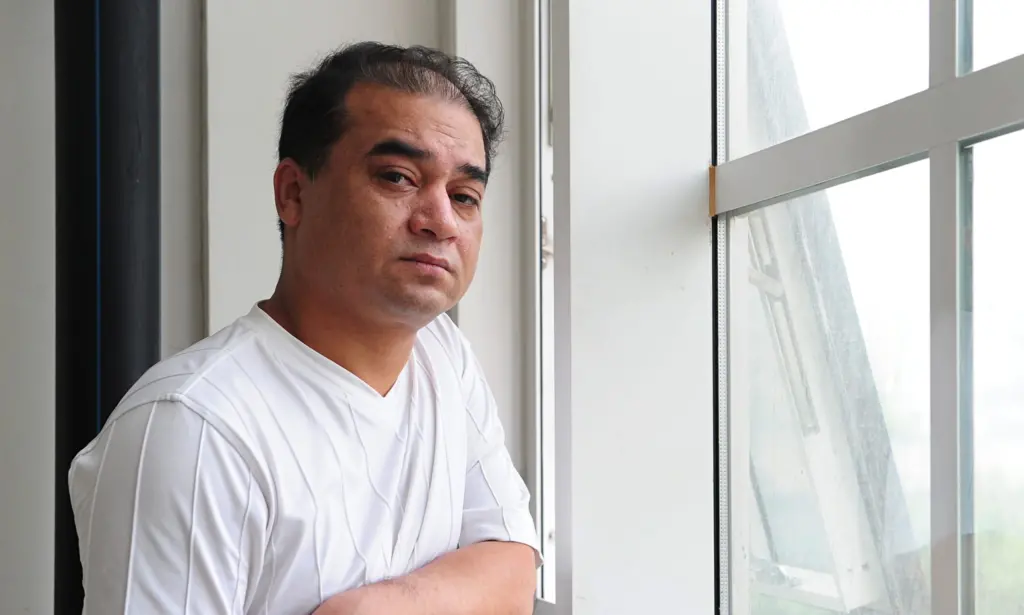
A sizeable 16 of the 34 writers PEN America documented as detained or imprisoned in Xinjiang in 2021 are also scholars of Uyghur literature, folklore, and politics. Historical researcher, literary critic, and writer Yalqun Rozi has been in prison since 2016 and is serving a 15-year sentence for his role in compiling and editing Uyghur literature textbooks that Chinese authorities claimed were “separatist.”43Helen Davidson, “China hands death sentences to Uyghur former officials,” The Guardian, April 9, 2021, theguardian.com/world/2021/apr/09/china-uyghur-death-sentences-xinjiang-education-directors Prominent folklorist and ethnographer Rahile Dawut has been in detention since 2017 after she attempted to travel from Ürümqi to Beijing. Dawut’s scholarship focuses on minority cultures and sacred Islamic sites in Central Eurasia; she founded the Minorities Folklore Research Centre at Xinjiang University and has authored several books and scholarly articles.44“Uyghur Scholar Rahile Dawut Named Honorary Professor in the Humanities by the Open Society University Network,” Bard News, December 8, 2020, bard.edu/news/rahile-dawut-named-first-osun-honorary-professor-in-the-humanities-2020-12-08 Former coworkers of Dawut’s confirmed her imprisonment in July 2021, while the Chinese government has yet to release information to the public or her family.45Shohret Hoshur and Gulchehra Hoja, “Noted Uyghur Folklore Professor Serving Prison Term in China’s Xinjiang,” Radio Free Asia, July 13, 2021, rfa.org/english/news/uyghur/rahile-dawut-07132021175559.html Reported retaliation for speaking publicly about these cases coupled with a lack of press freedom in Xinjiang results in delayed public knowledge around many cases of jailed writers. In August 2021, three coworkers of another Xinjiang University professor, Gheyratjan Osman, confirmed that Osman was detained in 2018 and currently serving 10 years in prison for “separatism.” Osman was a literature professor who published dozens of books and hundreds of scholarly articles on Uyghur language and folklore.46“Urgent Actions Needed to Stop Cultural Rights Violations Against Uyghurs,” Chinese Human Rights Defenders, October 5, 2021, nchrd.org/2021/10/urgent-actions-needed-to-stop-cultural-rights-violations-against-uyghurs Finally, 2021 marked the seventh year that Uyghur economist, online writer, and 2014 PEN Freedom to Write honoree Ilham Tohti has been held in Chinese state custody for his writings intended to foster understanding between Uyghurs and Han Chinese.47Andrew Jacobs, “China Charges Scholar With Inciting Separatism,” The New York Times, February 26, 2014, nytimes.com/2014/02/27/world/asia/ilham-tohti.html While Tohti is not imprisoned in Xinjiang, his unjust imprisonment is emblematic of the treatment many Uyghur writers face. He has been imprisoned incommunicado for the last five years and has been permitted no contact with his family or lawyers. Tohti’s daughter Jewher Ilham has nevertheless advocated fervently for his release, bringing attention to tragically similar accounts of unjustly detained Uyghurs and other political prisoners in Xinjiang.48Colm Keena, “‘We don’t know if he is alive’: Uighur woman speaks out on jailing of father in Xinjiang,” Irish Times, April 29, 2021, irishtimes.com/news/world/asia-pacific/we-don-t-know-if-he-is-alive-uighur-woman-speaks-out-on-jailing-of-father-in-xinjiang-1.4551124
Saudi Arabia
In Saudi Arabia, the number of writers either detained or imprisoned during 2021 remained high but stable, with a slight decrease to 29 behind bars and only one new detention counted during the year. Eminent scholar Saud Al-Sarhan, who has written commentary on Saudi public affairs and Yemeni politics, went missing in late October 2021. It was revealed only on December 7, 2021, that Al-Sarhan had been held incommunicado by Saudi authorities without published cause.49“Saudi academic Saud al-Sarhan missing since October,” ALQST, July 12, 2021, alqst.org/en/post/saudi-academic-saud-al-sarhan-missing Human rights groups surmise that his arrest was due to an article he wrote commenting negatively on the leadership of Crown Prince Mohammed bin Salman.50Saud Al-Sarhan, “Vision 2030: A dawn that dispels doubts,” Al Arabiya News, April 26, 2021, english.alarabiya.net/in-translation/2021/04/26/Vision-2030-A-dawn-that-dispels-doubts; “Saudi academic Saud al-Sarhan missing since October,” ALQST, July 12, 2021, alqst.org/en/post/saudi-academic-saud-al-sarhan-missing
The majority of cases in Saudi Arabia represent writers and public intellectuals who have been in prison for extended periods of time;51“Abuses Under Scrutiny: Human Rights in Saudi Arabia,” ALQST, accessed March 17, 2021, alqst.org/uploads/Abuses-Under-Scrutiny-En.pdf many have been in custody for five years or longer. Saudi authorities have held blogger Fadhel Al-Manasef, for example, in some form of state custody since 2011 and he is currently serving a 14-year jail sentence, slightly reduced from the original 15 years handed down in 2014.52“Case History: Fadhel Mekki Al-Manasef,” Front Line Defenders, accessed March 22, 2021, frontlinedefenders.org/en/case/case-history-fadel-mekki-al-manasef Raif Badawi, a blogger and creator of the Free Saudi Liberals website—who was detained in 2012 and eventually sentenced on appeal in 2014 to 10 years in prison and 1,000 lashes, as well as handed down a fine of 1 million Saudi riyals—remained in jail throughout 2021.53“Raif Badawi,” Committee to Protect Journalists, accessed March 18, 2021, cpj.org/data/people/raif-badawi/ His sentence expired on February 28, 2022, but Saudi officials refused to release him then; after renewed calls for his release, he was freed on March 11, but remains subject to a 10-year travel ban and restrictions on his professional activities and writing.54“Saudi blogger Raif Badawi still held after completing 10-year jail term,” Reporters Without Borders, March 1, 2022, rsf.org/en/news/saudi-blogger-raif-badawi-still-held-after-completing-10-year-jail-term; “Saudi Arabia confirms 10-year travel ban for freed blogger Raif Badawi,” France 24, March 12, 2022, france24.com/en/live-news/20220312-saudi-arabia-confirms-10-year-travel-ban-for-freed-blogger-raif-badawi Online commentator Fahad Al-Fahad, arrested in 2016 for tweets that criticized the justice system and government corruption, was sentenced in 2017 to five years’ imprisonment, a 10-year travel ban, and a ban on writing and media work that the presiding judge said was for life.55“Saudi Arabia: Activist Marks 2 Years Behind Bars,” Human Rights Watch, April 5, 2018, hrw.org/news/2018/04/05/saudi-arabia-activist-marks-2-years-behind-bars A significant portion of jailed writers in the Kingdom are being detained indefinitely without any charge; cases include journalist and online commentator Adel Banaima, arrested in September 2017; writer and online commentator Maha Al-Rafidi Al-Qahtani, held since September 2019 and subjected to custodial abuse; and journalist and scholar Zuhair Kutbi, detained in January 2019.56“Adel Banaima,” ALQST, accessed March 21, 2022, alqst.org/en/prisonersofconscience/adel-banaima; “Ongoing detention of female journalist and writer Maha al-Rafidi confirmed,” ALQST, January 14, 2020, alqst.org/en/ongoing-detention-female-journalist-writer-maha-al-rafidi-confirmed; “Zuhair Kutbi,” Committee to Protect Journalists, accessed March 21, 2022, cpj.org/data/people/zuhair-kutbi/
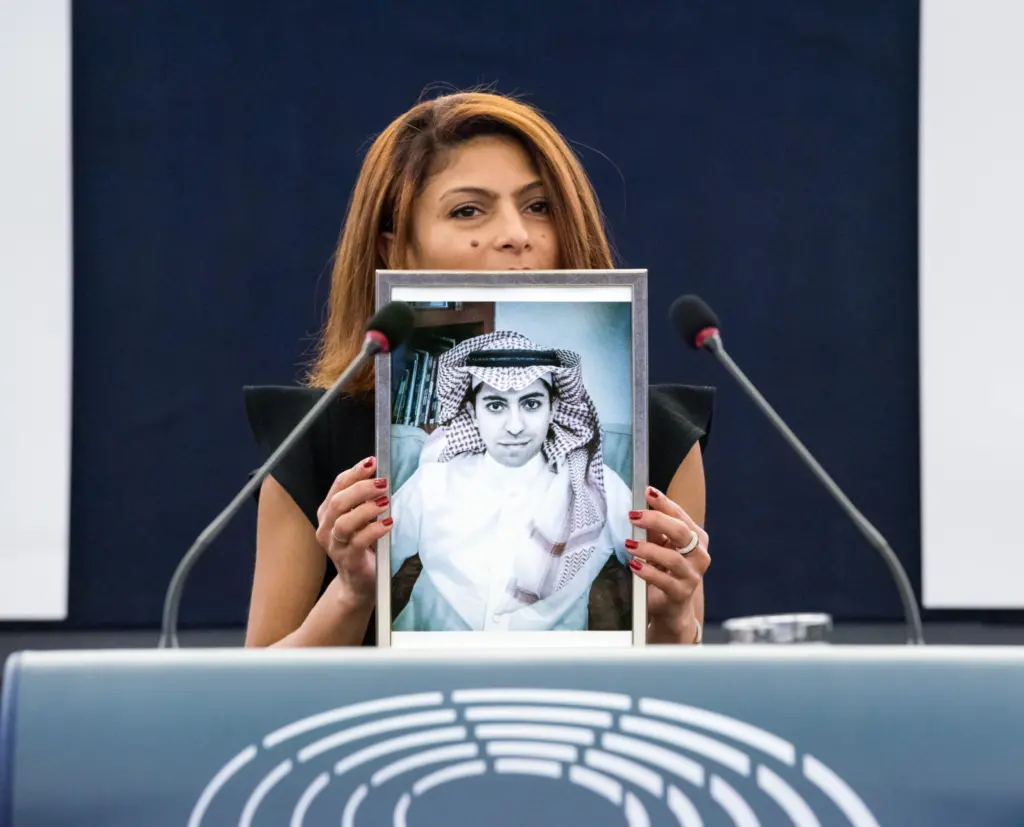

Despite a flurry of releases in 2021, many of the dissident Saudi writers and intellectuals released then and in the past several years continue to face significant conditions on their speech and movement that have prevented them from enjoying full freedom or returning to their writing or professional life. Threats of significant repercussions hang over them, should they breach the often-broad conditions of their freedom.57Arwa Youssef, “Saudi Women’s Rights Defenders Released, But Not Free,” Human Rights Watch, February 12, 2021, hrw.org/news/2021/02/12/saudi-womens-rights-defenders-released-not-free Many also face lingering legal charges or ongoing trials. These cases include many women who have advocated for women’s rights through their writings, such as academic Hatoon Al-Fassi and professor and columnist Eman Al-Nafjan, both released in 2019, as well as writer-activists Loujain Al-Hathloul, Nouf Abdulaziz, and Nassima Al-Sadah, released in early 2021 after being jailed for nearly three years.58“Saudi journalist Hatoon al-Fassi freed provisionally,” Reporters Without Borders, May 10, 2019, rsf.org/en/news/saudi-journalist-hatoon-al-fassi-freed-provisionally; Stephen Kalin and Sarah Dadouch, “Saudi Arabia temporarily frees three women activists,” Reuters, March 28, 2019, reuters.com/article/us-saudi-arrests/saudi-arabia-temporarily-frees-three-women-activists-idUSKCN1R91S6; Nadda Osman, “Loujain al-Hathloul: Saudi activist released from prison,” Middle East Eye, February 10, 2021, middleeasteye.net/news/saudi-arabia-loujain-hathloul-activist-returns-home-prison; “Saudi Arabia releases two prominent women’s rights activists,” Al Jazeera, June 27, 2021, aljazeera.com/news/2021/6/27/saudi-arabia-releases-two-prominent-womens-rights-activists Al-Hathloul, who had been detained since May 2018, was denied her request to appeal her conviction.59“Saudi appeals court rejects rights activist claim she was tortured in jail, family says,” Reuters, February 9, 2021, reuters.com/article/saudi-rights-women-justice-int/saudi-appeals-court-rejects-rights-activist-claim-she-was-tortured-in-jail-family-says-idUSKBN2A91X0 Upon release, she was placed under strict travel restrictions as well as what amounted to a gag order prohibiting her from speaking about the case or celebrating her release publicly.60“Saudi travel ban on activists and their families stirs unease even as detainees are released,” The Straits Times, February 24, 2021, straitstimes.com/world/middle-east/saudi-travel-bans-on-activists-and-families-stir-unease-as-detainees-released; “Saudi court upholds rights activist al-Hathloul’s sentence at appeals hearing,” Reuters, March 10, 2021, reuters.com/article/uk-saudi-rights-women-idUKKBN2B20QW; “Saudi court confirms Loujain al-Hathloul sentence,” Deutsche Welle, March 10, 2021, dw.com/en/saudi-court-confirms-loujain-al-hathloul-sentence/a-56826103 In March 2021, local human rights groups confirmed the release of journalist and blogger Ali Al-Saffar, journalist and blogger Thumar Al-Marzouqi, novelist Moqbel Al-Saqqar, and scholar and journalist Redha Al-Boori, all of whom had been arrested in an April 2019 sweep.61“Saudi Arabia releases prisoners of conscience not known to public,” Middle East Monitor, March 6, 2021, middleeastmonitor.com/20210306-saudi-arabia-releases-prisoners-of-conscience-not-known-to-public; ALQST for Human Rights (@ALQST_En), “ALQST has news of further releases of those detained in April 2019,” Twitter status, March 12, 2021, twitter.com/alqst_en/status/1370353985719271427; “Saudi Arabia: New wave of arrests targeting human rights community must stop,” The Gulf Center for Human Rights, April 4, 2019, gc4hr.org/news/view/2111 In July, writer and professor Aql Al-Bahili and writer and economist Abdulaziz Al-Dukhail, two of the three writers detained in April 2020 after expressing condolences online for deceased activist Abdullah Al-Hamid, were released, but it was unclear if any conditions were placed on their freedom.62ALQST for Human Rights (@ALQST_En), “Aql al-Bahili, detained since April 2020 for expressing sympathy over the death of rights activist Abdullah al-Hamid, has been released,” Twitter status, July 14, 2021, twitter.com/alqst_en/status/1415366553525174273; “Saudi official released after year-long detention over tweet,” Middle East Eye, July 9, 2021, middleeasteye.net/news/saudi-arabia-official-released-after-year-long-detention-over-tweet
Many of the Saudi writers and intellectuals released during 2021 and in the past several years remain subject to conditions on their speech and movement. Threats of significant repercussions hang over them, should they breach the often-broad conditions of their freedom.
In general, the environment for free expression in Saudi Arabia remains extremely poor, with little movement on some longstanding cases of political prisoners; continued efforts to intimidate Saudi commentators based abroad through online trolling and threats, surveillance, and hacking; and ongoing impunity for past cases of grave abuse perpetrated by the Saudi state, such as the murder of exiled journalist and columnist Jamal Khashoggi.63Stephanie Kirchgaessner, “US finds Saudi crown prince approved Khashoggi murder but does not sanction him,” The Guardian, February 26, 2021, theguardian.com/world/2021/feb/26/jamal-khashoggi-mohammed-bin-salman-us-report
Myanmar
The environment for free expression in Myanmar dramatically worsened in 2021 as a result of the February 1 coup, during which the military seized power; prevented the elected parliament from forming; cut off communications channels and banned media outlets; and arrested dozens of senior politicians, including National League for Democracy (NLD) leadership Senior Counselor Aung San Suu Kyi and President Win Myint, as well as influential cultural figures and creative artists.64“Internet disrupted in Myanmar amid apparent military uprising,” NetBlocks, January 31, 2021, netblocks.org/reports/internet-disrupted-in-myanmar-amid-apparent-military-uprising-JBZrmlB6; “Aung San Suu Kyi and other leaders arrested, party spokesman says,” Reuters, February 1, 2021, news.trust.org/item/20210131230656-kkg7f; “Stolen Freedoms: Creative Expression, Historic Resistance, and the Myanmar Coup,” PEN America, accessed March 21, 2022, pen.org/report/stolen-freedoms-creative-expression-historic-resistance-and-the-myanmar-coup During the year, as part of a broad-based crackdown in which thousands of protesters were jailed and hundreds killed, the number of jailed writers and creative artists increased from 8 in 2020 to 26 in 2021, catapulting Myanmar from ninth place in last year’s Index to third this year. In addition to detentions, which in most cases have been followed eventually by legal charges and sentences under Myanmar’s restrictive laws, writers and public intellectuals have also faced violence, threats, and surveillance, all of which have served to chill expression and the ability to write freely.65“Stolen Freedoms: Creative Expression, Historic Resistance, and the Myanmar Coup,” PEN America, accessed March 21, 2022, pen.org/report/stolen-freedoms-creative-expression-historic-resistance-and-the-myanmar-coup
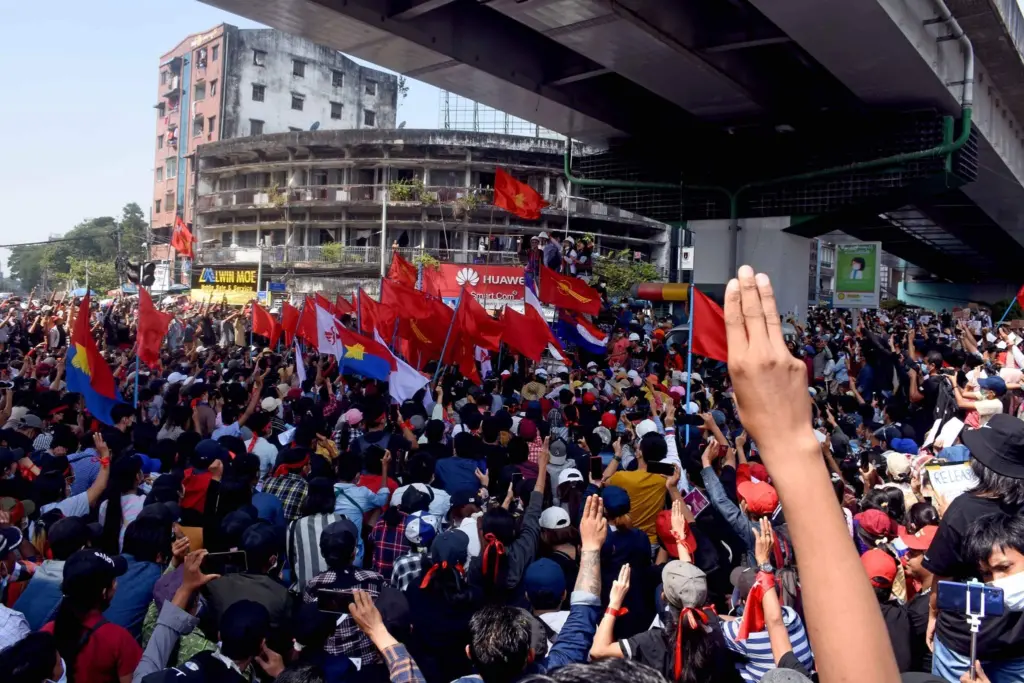
Arrests of influential writers and cultural luminaries started as soon as the military junta took over, likely because of their consistent support for human rights, as well as the NLD government and opposition to the military: filmmaker Min Htin Ko Ko Gyi, previously detained in 2019, was detained on the first night of the coup, alongside singer-songwriter Saw Phoe Khwar and writers Htin Lin Oo, Maung Thar Cho, Mya Aye, and Than Myint Aung.66“Recent Arrest List Last Updated Feb 4,” Assistance Association for Political Prisoners, February 4, 2021, aappb.org/wp-content/uploads/2021/02/Recent-Arrest-List-Last-Updated-on-Feb-4.pdf; “Statement on Recent Detainees in Relation to the Military Coup,” Assistance Association for Political Prisoners, February 4, 2021, aappb.org/?p=12997; “Three Saffron Revolution monks among those detained in February 1 raids,” Myanmar Now, February 3, 2021, myanmar-now.org/en/news/three-saffron-revolution-monks-among-those-detained-in-february-1-raids; “Recent Arrest List CSOs Last Updated Feb 4,” Assistance Association for Political Prisoners, February 4, 2021, aappb.org/wp-content/uploads/2021/02/Recent-Arrest-List-CSOsLast-Updated-on-Feb-4.pdf Min Htin Ko Ko Gyi had been released from prison less than one year earlier, sentenced on charges related to social media posts critical of the military’s constitutional role in politics.67“How Myanmar’s junta used a coup to settle old scores,” Myanmar Now, September 12, 2021, myanmar-now.org/en/news/how-myanmars-junta-used-a-coup-to-settle-old-scores He and Htin Lin Oo, who also had a history of organizing against the army’s political participation, were both able to post warnings on social media prior to their arrests.68Mon Mon Myat, “Myanmar Making Noises for Democracy,” The Irrawaddy, February 8, 2021, irrawaddy.com/opinion/myanmar-making-noises-democracy.html The latter wrote on Facebook, “Now our country is under a military coup for the third time. The democracy we arduously built has been crushed.”69“Aung San Suu Kyi Urges Protests to Reject Myanmar Military Coup, 1-Year State of Emergency,” Radio Free Asia, January 31, 2021, rfa.org/english/news/myanmar/military-arrests-01312021195220.html Police staked out Maung Thar Cho’s home for hours before detaining him, promising his family that he would only be taken for a short time.70How Myanmar’s junta used a coup to settle old scores,” Myanmar Now, September 12, 2021, myanmar-now.org/en/news/how-myanmars-junta-used-a-coup-to-settle-old-scores; Mon Mon Myat, “Myanmar Making Noises for Democracy,” The Irrawaddy, February 8, 2021, irrawaddy.com/opinion/myanmar-making-noises-democracy.html; Helen Regan and Sandi Sidhu, “By day, Myanmar’s protesters are defiant dissenters. By night, they’re terrified of being dragged from their beds by the junta,” CNN, February 20, 2021, edition.cnn.com/2021/02/19/asia/myanmar-protest-voices-coup-intl-dst-hnk/index.html Instead he was held on unknown charges for over 10 months, including periods of solitary confinement, and in May 2021, he underwent a military interrogation in which he was forced to renounce his public remarks in support of the NLD.71“Stolen Freedoms: Creative Expression, Historic Resistance, and the Myanmar Coup,” PEN America, accessed March 11, 2022, pen.org/report/stolen-freedoms-creative-expression-historic-resistance-and-the-myanmar-coup; “In Military-Ruled Myanmar, Political Detainees Mark 100 Days Behind Bars,” The Irrawaddy, May 11, 2021, irrawaddy.com/news/burma/in-military-ruled-myanmar-political-detainees-mark-100-days-behind-bars.html Prominent ’88 Generation activist Mya Aye and writer and NLD representative Than Myint Aung were similarly arrested early in the morning on February 1, 2021.72“How Myanmar’s junta used a coup to settle old scores,” Myanmar Now, September 12, 2021, myanmar-now.org/en/news/how-myanmars-junta-used-a-coup-to-settle-old-scores; Aditi Bhandari, Wa Lone, and Poppy McPherson, “Politicians, doctors and a fortune-teller: Myanmar’s new wave of detainees,” Reuters, March 1, 2021, graphics.reuters.com/MYANMAR-POLITICS/DETENTIONS/jbyvrdaznve Mya Aye was held incommunicado for months before his location and charges were revealed.73“How Myanmar’s junta used a coup to settle old scores,” Myanmar Now, September 12, 2021, myanmar-now.org/en/news/how-myanmars-junta-used-a-coup-to-settle-old-scores All of them remained behind bars at year’s end and have since been handed various charges in retaliation for their writing. For example, Min Htin Ko Ko Gyi was charged with incitement, while Mya Aye was sentenced to two years in prison under Section 505(c) of the penal code for “inciting hate towards an ethnicity or a community,” a charge related to a 2014 email criticizing ethno-nationalism in Myanmar.74“Myanmar Junta Jails Celebrity for Anti-Coup Protests,” The Irrawaddy, December 28, 2021, irrawaddy.com/news/burma/myanmar-junta-jails-celebrity-for-anti-coup-protests.html; Esther J, “Democracy activist Mya Aye receives two-year prison sentence on his birthday,” Myanmar Now, March 10, 2022, myanmar-now.org/en/news/democracy-activist-mya-aye-receives-two-year-prison-sentence-on-his-birthday; Esther J, “Jailed 1988 veteran admitted to hospital with ‘life-threatening’ infection from wound,” Myanmar Now, November 5, 2021, myanmar-now.org/en/news/jailed-1988-veteran-admitted-to-hospital-with-life-threatening-infection-from-wound Than Myint Aung and Htin Lin Oo were sentenced in December and the following February, respectively, to three years in prison under Section 505(a) of the penal code for allegedly opposing the coup online and inciting anti-military sentiments.75Han Thit, “Junta hits author and model with three-year prison sentences,” Myanmar Now, December 29, 2021, myanmar-now.org/en/news/junta-hits-author-and-model-with-three-year-prison-sentences; Esther J, “Writer Htin Lin Oo sentenced to three years in prison,” Myanmar Now, February 22, 2022, myanmar-now.org/mm/news/10532 In February 2022, Maung Thar Cho was sentenced to two years in prison with hard labor, also under Section 505(a), reportedly stemming from two articles that were published a year before the coup took place.76“Writers Maung Thar Cho and Htin Lin Oo sentenced to hard labor,” The Irrawaddy, February 22, 2022, burma.irrawaddy.com/news/2022/02/22/250081.html
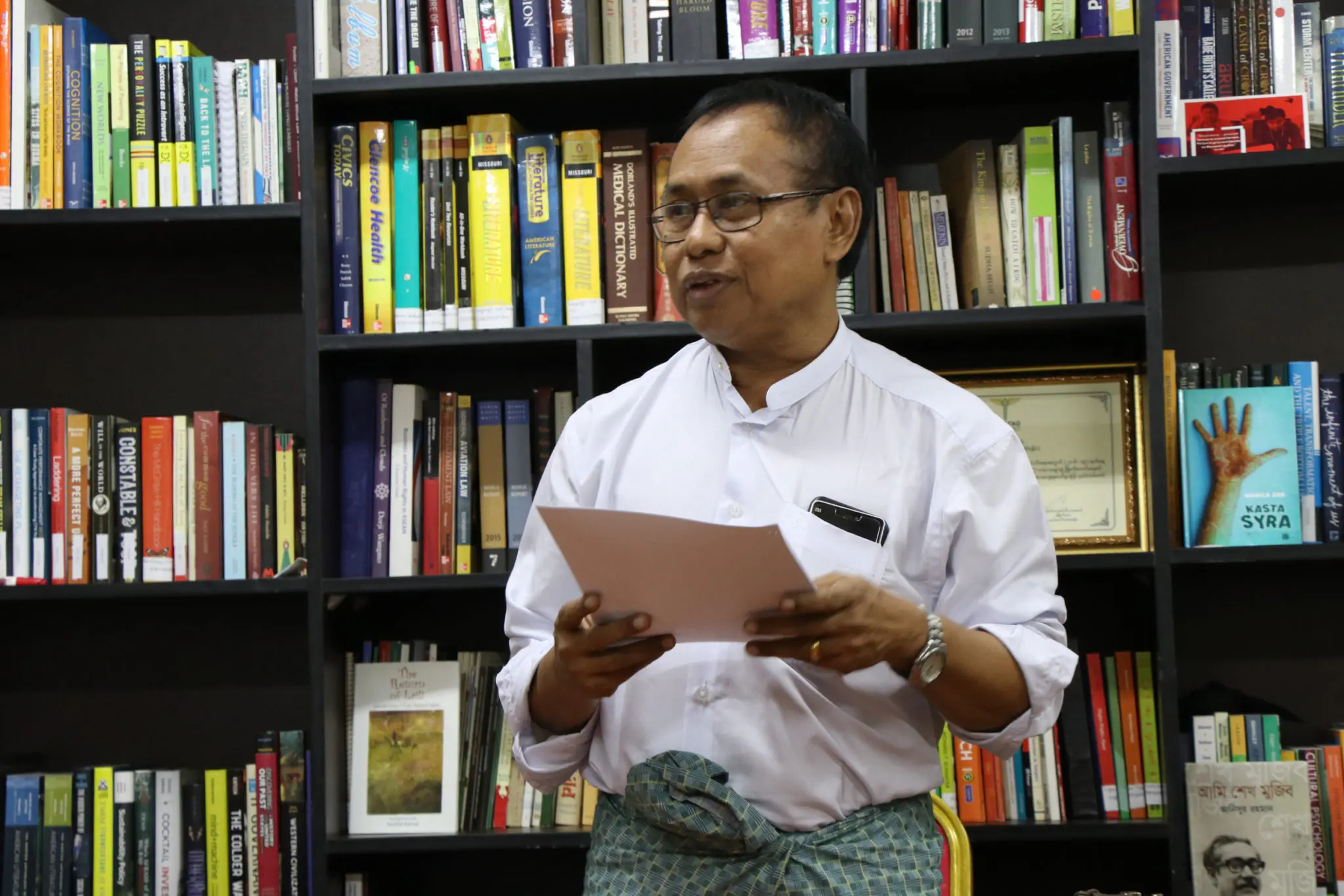
Poet, political satirist, and professor Maung Thar Cho has been detained since day one of the military coup in Myanmar.
Within weeks of the coup, a broad-based, countrywide civil disobedience movement (known as the CDM) emerged involving thousands of protesters, who continue to challenge the military’s illegal takeover and fight for their country’s future. As writers’ groups and other creative artists have played a key role in the CDM, they have been targeted for arrest and legal charges—and in some cases, they have been killed—for their civic activism and for inspiring others to join the movement.77The leading role of writers and creative artists in the CDM can be explored further in PEN America’s December 2021 report, Stolen Freedoms: Creative Expression, Historic Resistance, and the Myanmar Coup, available at: pen.org/report/stolen-freedoms-creative-expression-historic-resistance-and-the-myanmar-coup At least six poets were arrested and detained for their participation in poet-led protests in downtown Yangon on Pansodan Road, where they held poetry recitals and sold art to support civil resistance in the weeks immediately after the coup.78Mon Mon Myat, “Is Civil Disobedience Myanmar’s New Normal?,” The Irrawaddy, February 15, 2021 irrawaddy.com/opinion/civil-disobedience-myanmars-new-normal.html; Tommy Walker, “How Myanmar’s Civil Disobedience Movement Is Pushing Back Against the Coup,” Voice of America, February 27, 2021, voanews.com/a/east-asia-pacific_how-myanmars-civil-disobedience-movement-pushing-back-against-coup/6202637.html; “PEN America Condemns Myanmar Military Regime’s Deadly Use of Force,” PEN America, March 4, 2021, pen.org/press-release/pen-america-condemns-myanmar-military-regimes-deadly-use-of-force Wai Moe Naing, a writer and activist also known as Monywa Panda, was attacked and then arrested at a protest in April, and later charged with incitement under Section 505(a) of the penal code, and nine other serious charges, including treason, armed robbery, and murder.79“Wai Moe Naing, prominent leader of anti-coup movement, detained in Monywa,” Myanmar Now, April 15, 2021, myanmar-now.org/en/news/wai-moe-naing-prominent-leader-of-anti-coup-movement-detained-in-monywa; “Detained protest leader Wai Moe Naing meets with his lawyer for the first time, says mother,” Myanmar Now, May 29, 2021, myanmar-now.org/en/news/detained-protest-leader-wai-moe-naing-meets-with-his-lawyer-for-the-first-time-says-mother Poet Khet Thi, who had rallied protesters with his words and writings, was detained and reportedly tortured to death after being taken into custody in central Myanmar.80“Torture Suspected in Death of Myanmar Poet Called a Voice of Resistance,” Radio Free Asia, May 11, 2021, rfa.org/english/news/myanmar/poet-05112021185408.html According to his wife, after his detention his body was returned to his family with missing organs.81“Body of arrested Myanmar poet Khet Thi returned to family with organs missing,” The Guardian, May 9, 2021, theguardian.com/world/2021/may/10/body-of-arrested-myanmar-poet-khet-thi-returned-to-family-with-organs-missing
Civil resistance to the coup continued despite the military’s violent repression, which escalated after the first few weeks following the coup; reactive and preemptive arrests of writers continued as well. Maung Yu Py, a well-known poet from Myeik, was detained on March 9 alongside several dozen activists amid widespread reports of torture in custody.82Mark Frary, “Myanmar keeps it poets locked up despite prisoner release,” Index on Censorship, July 2, 2021, indexoncensorship.org/2021/07/myanmar-keeps-it-poets-locked-up-despite-prisoner-release; “More than 30 youth sentenced in closed court hearing inside Myeik Prison,” Myanmar Now, June 10, 2021, myanmar-now.org/en/news/more-than-30-youth-sentenced-in-closed-court-hearing-inside-myeik-prison On April 6, the prominent satirist and film director Zarganar was arrested under unknown charges; like Htin Lin Oo, Zarganar had also written critically about the coup on Facebook after the military first seized power in February.83“Comedian Zarganar arrested by junta,” Myanmar Now, April 6, 2021, myanmar-now.org/en/news/comedian-zarganar-arrested-by-junta On April 24, fiction writer and journalist Tu Tu Tha was arrested in a home raid by at least 10 military soldiers.84“Myanmar’s Junta Continues to Arrest Journalists,” The Irrawaddy, April 26, 2021, irrawaddy.com/news/burma/myanmars-junta-continues-arrest-journalists.html Both Tu Tu Tha and Zarganar were released in a general amnesty in October 2021, just days after the announcement of the exclusion of coup leader Min Aung Hlaing from the ASEAN summit.85“Senior NLD Official, Prominent Myanmar Comedian Freed Alongside Activists, Journalists,” The Irrawaddy, October 19, 2021, irrawaddy.com/news/burma/senior-nld-official-prominent-myanmar-comedian-freed-alongside-activists-journalists.html Despite being released by the military, political prisoners in Myanmar remain at risk of being rearrested any moment; many of those freed in the October general amnesty were swiftly detained once more, while others—including Zarganar—report continued restrictions on their liberties.86“Myanmar Amnesty Ends in Tears as Regime Rearrests Political Prisoners,” The Irrawaddy, October 21, 2021, irrawaddy.com/news/burma/myanmar-amnesty-ends-in-tears-as-regime-rearrests-political-prisoners.html Maung Yu Py, however, was sentenced in a makeshift prison court for unlawful assembly and spreading false news under Section 505A to two years in prison, later reduced to one year.87Mark Frary, “Myanmar keeps it poets locked up despite prisoner release,” Index on Censorship, July 2, 2021, indexoncensorship.org/2021/07/myanmar-keeps-it-poets-locked-up-despite-prisoner-release; “More than 30 youth sentenced in closed court hearing inside Myeik Prison,” Myanmar Now, June 10, 2021, myanmar-now.org/en/news/more-than-30-youth-sentenced-in-closed-court-hearing-inside-myeik-prison This vague provision of “spreading false news” was added as Section 505A of the penal code within several weeks of the coup and was used to charge a number of writers, public intellectuals, and journalists in 2021, including Maung Yu Py and American journalist Danny Fenster.88The Penal Code amendment adds a new crime under Section 505A of “causing fear” or “spreading false news” with a maximum sentence of three years in prison and a fine. “Myanmar Ruling Council Amends Treason, Sedition Laws to Protect Coup Makers,” The Irrawaddy, February 16, 2021, irrawaddy.com/news/burma/myanmar-ruling-council-amends-treason-sedition-laws-protect-coup-makers.html; Han Thit, “Detained American journalist Danny Fenster hit with new charge under Immigration Act,” Myanmar Now, November 4, 2021, myanmar-now.org/en/news/detained-american-journalist-danny-fenster-hit-with-new-charge-under-immigration-act
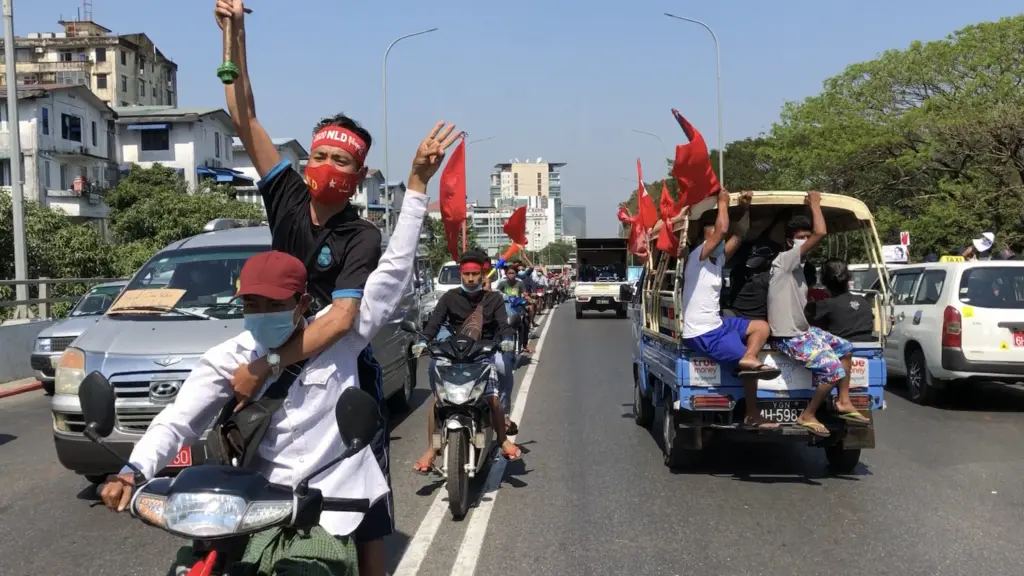
Six members of the satirical poetry troupe Peacock Generation made up the bulk of Myanmar’s cases counted in the Index prior to 2021, having been charged with incitement against the military and online defamation in 2019.89“Freedom to Write Index 2020,” PEN America, accessed March 21, 2022, pen.org/report/freedom-to-write-index-2020; “Peacock Generation: Satirical poets jailed in Myanmar,” BBC News, October 30, 2019, bbc.com/news/world-asia-50238031 Three were released in 2020, and in a wave of pardons traditionally undertaken to mark Thingyan (the Burmese Buddhist New Year festival), Paing Pyo Min, Zay Yar Lwin, and Paing Ye Thu were released along with hundreds of other political prisoners in April 2021.90Zaw Zaw Htwe, “Jailed Satirical Performer Faces Extra Charge from Myanmar’s Military,” The Irrawaddy, December 16, 2020, irrawaddy.com/news/burma/jailed-satirical-performer-faces-extra-charge-myanmars-military.html; “Nine activists among more than 23,000 freed as part of Thingyan amnesty,” Myanmar Now, April 17, 2021, myanmar-now.org/en/news/nine-activists-among-more-than-23000-freed-as-part-of-thingyan-amnesty Regardless of this show of amnesty, even those previously released faced continued harassment: troupe member Zaw Lin Htut, released in October 2020, was arrested again in December 2021 and faces new charges of incitement.91Han Thit, “Two Yangon activists charged and sent to Insein Prison,” January 17, 2022, myanmar-now.org/en/news/two-yangon-activists-charged-and-sent-to-insein-prison
Though I have different views than you, I’ll lay down my life for you all.
K Za Win
Apart from targeted arrests, lengthy detentions, and legal charges, writers and other prominent creative voices faced myriad threats in the fraught post-coup environment. After the first few weeks, as the police and military escalated their use of lethal violence against the public during street demonstrations, at least three poets were killed as they were caught up in protests during the spring of 2021.92“Cities terrorised as junta escalates lethal violence against public on Armed Forces Day,” Myanmar Now, March 27, 2021, myanmar-now.org/en/news/cities-terrorised-as-junta-escalates-lethal-violence-against-public-on-armed-forces-day; Hannah Beech, “Where Poets Are Being Killed and Jailed After a Military Coup,” The New York Times, May 25, 2021, nytimes.com/2021/05/25/world/asia/myanmar-poets.html Poets K Za Win and Myint Myint Zin were murdered in March when the military opened fire on protests in which they were taking part, while poet, politician, and charity fundraiser Sein Win was doused in gasoline and burned to death by an unknown perpetrator in May.93Rebecca Ratcliffe, “‘Revolution dwells in the heart’: Myanmar’s poets cut down by the military,” The Guardian, May 16, 2021, theguardian.com/global-development/2021/may/17/revolution-dwells-in-the-heart-myanmars-poets-cut-down-by-the-miltary In the years preceding the coup, Monywa poet and former Buddhist monk K Za Win was a land rights activist who was critical of the NLD; in 2015 he spent a year in prison for taking part in a rally for education reform.94Joe Freeman, “Poets Are Among the ‘Martyrs’ in Myanmar Coup Protests,” Vice News, March 10, 2021, vice.com/en/article/xgzj94/poets-are-among-the-martyrs-in-myanmar-coup-protests In the wake of the coup, K Za Win was a leading figure in protests, defending the election results. Prior to his death, he wrote on Facebook, “Though I have different views than you, I’ll lay down my life for you all.”95Joe Freeman, “Poets Are Among the ‘Martyrs’ in Myanmar Coup Protests,” Vice News, March 10, 2021, vice.com/en/article/xgzj94/poets-are-among-the-martyrs-in-myanmar-coup-protests Dozens more writers have had to flee into hiding within Myanmar, or into temporary exile outside the country, for their safety and to ensure they remain free to continue their writing and anti-coup activism.
Broad restrictions on free expression and the ability to access and share information and commentary, particularly online, have cast a chill on public discourse since the coup. Widespread and lengthy internet and communications shutdowns, coupled with increased surveillance and the ramped up use of laws criminalizing online activity, were also used to silence influential voices. The military demonstrated its willingness to wield internet shutdowns as a means of control the first day of the coup, on February 1, implementing a nationwide shutdown just as the news of the military coup started to break.96“Internet disrupted in Myanmar amid apparent military uprising,” NetBlocks, January 31, 2021, netblocks.org/reports/internet-disrupted-in-myanmar-amid-apparent-military-uprising-JBZrmlB6 The junta then blocked social media platforms and websites, including widely used platforms such as Facebook and Twitter; took control of telecommunications infrastructure, including mobile service operators; and dramatically ramped up its surveillance capabilities.97“Myanmar: Freedom on the Net 2021,” Freedom House, accessed March 15, 2022, freedomhouse.org/country/myanmar/freedom-net/2021 Many of these restrictions remained in place at year’s end, with plans in place to further criminalize the use of applications to evade censorship and surveillance.
Iran
In Iran, the number of jailed writers in 2021 increased from 19 to 21, but there was movement in a number of cases, with the releases—either temporary or permanent—of a number of political prisoners, while other writers and intellectuals were either newly detained or summoned to start serving sentences already imposed previously. PEN America’s 2011 Freedom to Write Award honoree Nasrin Sotoudeh, who undertook a grueling hunger strike in late 2020 to protest poor prison conditions, was released on medical parole on July 21, 2021, and remained out of prison at year’s end due to her precarious health condition, though this dispensation is subject to regular review.98“PEN Honors Nasrin Sotoudeh with the 2011 PEN/Barbara Goldsmith Freedom to Write Award,” PEN America, October 26, 2012, pen.org/multimedia/pen-honors-nasrin-sotoudeh-with-the-2011-penbarbara-goldsmith-freedom-to-write-award; “Jailed Iran human rights lawyer hospitalised after hunger strike,” Al Jazeera, September 20, 2020, aljazeera.com/news/2020/9/20/jailed-iran-human-rights-lawyer-hospitalised-after-hunger-strike; “Iran Releases Rights Lawyer Sotoudeh For Five-Day Health Treatment Leave,” Radio Free Europe, July 22, 2021, rferl.org/a/iran-sotoudeh-health-release/31371837.html Prison also remains a revolving door for prominent critical voices such as journalist and activist Narges Mohammadi, who was released on October 8, 2020, after enduring eight and a half years in prison for “forming an illegal group.”99“Iran rights activist Narges Mohammadi freed from jail,” Al Jazeera, October 8, 2020, aljazeera.com/news/2020/10/8/iran-rights-activist-mohammadi-freed-after-sentence-cut An Iranian court again convicted Mohammadi not six months later, in late May 2021, on new propaganda and defamation charges, and sentenced her to 30 months in prison, 80 lashes, and a fine.100“Iran sentences activist to 30 months jail, flogging,” France 24, May 27, 2021, france24.com/en/live-news/20210527-iran-sentences-activist-to-30-months-jail-flogging Nevertheless, she continued to speak out at public virtual events facilitated by organizations based overseas, as well as engaging in activism in Iran.101“White Torture: The Infamy of Solitary Confinement in Iran,” Stanford University Iranian Studies Program, accessed March 22, 2022, iranian-studies.stanford.edu/events/lecture-series/white-torture-infamy-solitary-confinement-iran She was arrested while attending a peaceful commemoration in November and held in Evin Prison in solitary confinement through year’s end; additional charges were levied against her in December.102“Narges Mohammadi Arrested by Security Forces in Karaj During Ceremony Honoring Ebrahim Ketabdar,” Human Rights Activist News Agency, November 16, 2021, en-hrana.org/narges-mohammadi-arrested-by-security-forces-in-karaj-during-ceremony-honoring-ebrahim-ketabdar; “Iranians Launch Twitter Campaign For Activist In Solitary Confinement,” Iran International, December 28, 2021, iranintl.com/en/202112288671 After being transferred to Qarchak Prison in January 2022, Mohammadi was handed down an additional sentence of eight years in prison and 70 lashes.103“Narges Mohammadi Transferred to Qarchak Prison,” Human Rights Activist News Agency, January 20, 2022, en-hrana.org/narges-mohammadi-transferred-to-qarchak-prison; “Rights Activist Narges Mohammadi Sentenced to Another Eight Years in Prison,” Center for Human Rights in Iran, January 24, 2022, iranhumanrights.org/2022/01/rights-activist-narges-mohammadi-sentenced-to-another-eight-years-in-prison

Arash Ganji was targeted for his membership in the Iranian Writers’ Association and imprisoned for translating a Kurdish history book.
Throughout the year, the crackdown on the independent Iranian Writers’ Association (IWA) continued; the IWA has been targeted in the past due to their insistence on upholding the rights to free expression and association, as well as standing in solidarity with other writers under threat. IWA leaders Baktash Abtin, a poet and filmmaker, writer Keyvan Bajan, and writer Reza Khandan Mahabadi, were convicted of threatening national security in May 2019 and summoned into prison in September 2020.104“Three Writers Tried in Iran on ‘National Security’ Charges,” Center for Human Rights in Iran, May 3, 2019, iranhumanrights.org/2019/05/three-writers-tried-in-iran-on-national-security-charges; “Three Iranian Authors Imprisoned In Tehran’s Notorious Jail,” Radio Farda, September 27, 2020, en.radiofarda.com/a/three-iranian-authors-imprisoned-in-tehran-s-notorious-jail/30860892.html They remained in Evin prison throughout the year, battling COVID-19 infections and medical maltreatment.105Niloufar Rostami, “Weekly Review of Censorship: Jailed Writers Denied Medical Help,” IranWire, February 15, 2021, iranwire.com/en/features/68946; PEN America, “After COVID-19 Infection, PEN America Demands Iran Release Imprisoned Writers,” December 9, 2021, pen.org/press-release/after-covid-19-infection-pen-america-demands-iran-release-imprisoned-writers In September 2021 PEN America awarded the 2021 PEN/Barbey Freedom to Write Award to these three writers, calling attention to their unjust imprisonment and increasingly dangerous prison conditions. Iran refused to release these writers, and after Abtin contracted COVID-19 in early December, authorities refused him urgently needed medical care.106“Open Letter to Supreme Leader of Iran on Baktash Abtin,” PEN America, January 7, 2022, pen.org/open-letter-supreme-leader-iran-baktash-abtin That delay would prove fatal; Abtin was hospitalized and battling for his life on a ventilator by year’s end, and died in the hospital—but still in state custody—on January 8, 2022, his death a tragic testament to the costs of the Iranian state’s callous repression.107PEN America, “PEN America Mourns ‘Utterly Preventable Death’ of Baktash Abtin,” January 8, 2022, pen.org/press-release/pen-america-mourns-utterly-preventable-death-of-baktash-abtin Writer and translator Arash Ganji, also an IWA member, was sentenced in December 2020 to 11 years in prison on national security charges related to his translation of a book on a Kurdish-led uprising in northern Syria.108“Arash Ganji, a Member of the Iranian Writers’ Association, was Sentenced to 11 Years in Prison,” The Campaign to Defend Political and Civil Prisoners, January 1, 2021, kampain.info/archive/52050.htm He was summoned to begin his prison term in October 2021.109PEN America, “Writer and Translator Arash Ganji Summoned to Serve Prison Sentence in Latest Assault on Free Expression in Iran,” October 19, 2021, pen.org/press-release/arash-ganji-summoned-serve-prison-sentence-iran Alireza Nouri, an IWA member sentenced in 2017 on a blasphemy charge for his poetry, was arrested by police in the city of Hamedan in February 2021 to start serving his two-year sentence.110“Alireza Nouri,” Journalism Is Not a Crime, accessed March 22, 2022, journalismisnotacrime.com/en/wall/alirezanouri Meanwhile, IWA members and poets Milad Jannat and Amin Moradi were conditionally released in July and December 2020, respectively.111“Milad Jannat, a member of the Writers’ Association, was released on bail,” The Campaign to Defend Political and Civil Prisoners, July 29, 2020, kampain.info/archive/47806.htm; Niloufar Rostami, “Weekly Review of Censorship: Jailed Writers Denied Medical Help,” IranWire, February 15, 2021, iranwire.com/en/features/68946
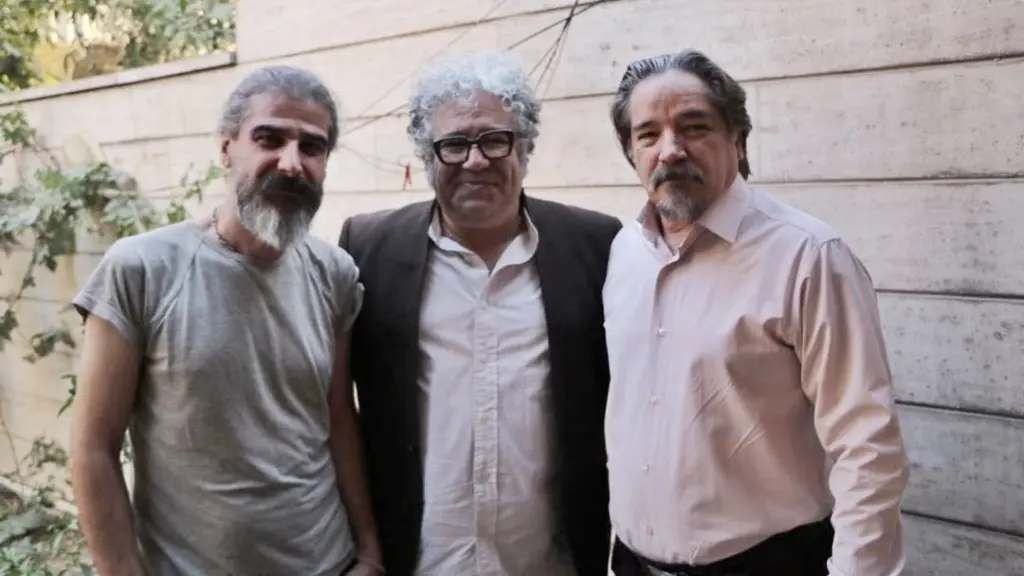

Writers who focus on advocating for ethnic or religious minority rights continue to be particularly targeted in Iran. Examples include Akbar Azad, a poet, journalist, and advocate for Azeri language and culture, who was arrested in August 2021 after attempting to renew his bail on a previous charge; he was eventually conditionally released after posting a 500 million tomans (US$118,300) bail in September.112“Akbar Azad was sent on leave from Greater Tehran Prison,” Human Rights Activist News Agency, September 25, 2021, hra-news.org/2021/hranews/a-31479 Meanwhile, the courts upheld a five-year sentence on national security charges against Zahra Mohammadi, a Kurdish-language rights advocate, in February 2021; she was summoned to prison to begin serving this sentence in January 2022.113“Zara Mohammadi’s 5 Year Sentence Upheld for Teaching Kurdish Language,” Iran Human Rights, February 14, 2021, iranhr.net/en/articles/4620; “Kurdish language teacher Zahra Mohammadi, civil activist Shadi Gilak taken to prison,” The Women’s Committee of the National Council of Resistance of Iran, January 8, 2022, women.ncr-iran.org/2022/01/08/kurdish-language-teacher-zahra Religious minorities were also targeted. Touraj Amini, a Baha’i writer and scholar sentenced on charges of “propaganda against the regime” in June 2020, was summoned to serve his six-month sentence in January 2021 and served his time in Karaj Prison before being released in July.114“Baha’i researcher and writer Touraj Amini sentenced to imprisonment and exile,” Human Rights Activist News Agency, June 24, 2020, hra-news.org/2020/hranews/a-25104; Niloufar Rostami, “Weekly Review of Censorship: A Baha’i Historian Jailed Because of His Faith,” IranWire, February 1, 2021, iranwire.com/en/features/68792; “With the end of the sentence period; Touraj Amini was released from Karaj Central Prison,” Human Rights Activist News Agency, July 28, 2021, hra-news.org/2021/hranews/a-31114 Yasin Qasemi Bajd, a Sunni Muslim writer and scholar, was arrested in Zahedan in February and held for about a month before being released on bail, facing a slew of charges that included blasphemy and also propaganda against the state.115“Sunni writer Yasin Qasemi Bajd was released on bail after a court hearing,” IranWire, February 8, 2021, iranwire.com/az/special-features-1/68869; “Announcing the date of Yasin Ghasemi Bejd’s trial,” Rissmaan, accessed March 22, 2022, rissmaan.com/fa/id-18487/?lang=en His trial started in May, and by September he had been acquitted of some of the pending charges, while others remained.116“Daily Brief of Human Rights Violation in Iran May 11, 2021,” Javanehha, May 11, 2021, en.javanehha.com/2021/05/daily-brief-of-human-rights-violation-in-iran-may-11-2021; Human Rights Activist News Agency (@hra_news), “#یاسین_قاسمی_بجد , writer, poet and translator, was acquitted by Branch 102 of the Criminal Court,” Twitter status, twitter.com/hra_news/status/1433397471074467842?s=20&t=4zmhDhVHZs7X9WmpZVnRlQ
Criticism of Iranian authorities or government policies can also bring about harsh penalties; the charges most commonly brought in such cases are of threatening national security or “propaganda against the state.” Toomaj Salehi, a songwriter and rapper known for his songs protesting state repression and injustice, was arrested in September 2021 and detained for a week before being charged with propaganda and then released on bail.117“Protest rapper Tomaj Salehi ‘arrested at home,’” Radio Farda, September 23, 2021, radiofarda.com/a/iranian-rapper-toumaj-salehi-arrest/31459906.html; Golnaz Esfandiari, “’We Are The Dead Who Can’t Think Of Dying’: Iranian Rapper Charged For Criticizing Regime,” Radio Free Europe, September 22, 2021, rferl.org/a/iran-rapper-charged-propaganda/31473007.html; “Iran Releases Dissident Rapper On Bail After Social Media Outcry,” Iran International, September 22, 2021, old.iranintl.com/en/iran-in-brief/iran-releases-dissident-rapper-bail-after-social-media-outcry In January, he was handed a fine and six months’ imprisonment, suspended for a year.118“Dissident rapper Toomaj Salehi sentenced to prison and fine,” Iran Human Rights Monitor, January 25, 2022, iran-hrm.com/2022/01/25/dissident-rapper-toomaj-salehi-sentenced-to-prison-and-fine Similarly, Aram Fathi, a writer, poet, and activist who had previously faced harassment from the authorities, was arrested in June 2021, reportedly because he called for a boycott of the presidential elections.119“Aram Fathi,” Journalism Is Not a Crime, accessed March 22, 2022, journalismisnotacrime.com/en/wall/aramfathi; “Kurdish poet and writer, Aram Fathi from Marivan arrested by Iranian Security Services,” Hengaw Organization for Human Rights, June 17, 2021, hengaw.net/en/news/kurdish-poet-and-writer-aram-fathi-from-marivan-arrested-by-iranian-security-services He was subject to mistreatment and denied a lawyer while in detention, but was released on bail after 11 days; he still faces trial on charges of national security and propaganda against the state.120“Iranian Poet Aram Fathi Tortured in Custody,” Journalism Is Not a Crime, June 19, 2021, journalismisnotacrime.com/en/news/4940; “Kurdish activists Aram Fathi and Soraya Haghdoust Released on Bail,” Iran Human Rights, June 28, 2021, iranhr.net/en/articles/4782 Nima Ghasemi, a writer and scholar, was arrested in February 2021 and held in solitary confinement for just over a month before being released on bail.121“Nima Ghasemi,” Journalism Is Not a Crime, accessed March 22, 2022, journalismisnotacrime.com/en/wall/nimaghasemi; “Nima Ghasemi was released on bail,” IranWire, March 14, 2021, iranwire.com/fa/jinac/47066 In November he was handed down a sentence of four years and eight months on charges of propaganda against the state, for his articles on sensitive political and social themes, including foreign policy and economic corruption.122“Writer and Philosophy Researcher Nima Ghasemi Sentenced to Four years and Eight Months,” Human Rights Activists News Agency, November 5, 2021, en-hrana.org/writer-and-philosophy-researcher-nima-ghasemi-sentenced-to-four-years-and-eight-months
A number of dissident voices, such as Narges Mohammadi and members of the Iranian Writers’ Association, were seemingly penalized for expressing solidarity. Their only apparent “crime” was commemorating the actions and words of other writers and activists.
A common pattern across many cases in Iran involves an initial period of detention before being charged, during which an individual is often held incommunicado and without access to legal counsel or their family members; in a number of cases, there is also a lag between a sentence being handed down by a judge and the convicted individual being summoned to serve their sentence in prison. Those serving prison terms remained at high risk to their health due to poor prison conditions, ongoing COVID-19 outbreaks inside Iran’s jails in which many political prisoners have been infected, and inadequate medical care being given to prisoners, even those with serious existing health conditions such as Baktash Abtin and Arash Ganji.123“The Writers’ Association of Iran demanded the release of Arash Ganji,” Human Rights Activists News Agency, December 25, 2019, hra-news.org/statements/a-447; “Baktash Abtin went to ‘artificial coma’; Iranian Writers Association: The government is responsible for his life,” BBC News, January 2, 2022, bbc.com/persian/iran-59850987 A number of dissident voices, such as Narges Mohammadi and the IWA, were seemingly penalized for expressing their solidarity with other activists, including those killed during street protests, or those who had died in prison.124“Narges Mohammadi Arrested by Security Forces in Karaj During Ceremony Honoring Ebrahim Ketabdar,” Human Rights Activists News Agency, November 16, 2021, en-hrana.org/narges-mohammadi-arrested-by-security-forces-in-karaj-during-ceremony-honoring-ebrahim-ketabdar In these cases, their only “crime” was seemingly commemorating the actions and words of other writers and activists. As the year came to an end and into early 2022, movement on the talks to resurrect the Iran nuclear agreement led to new threats against writers and scholars, as political prisoners who are dual nationals and who had previously been conditionally released were summoned back to prison.125“Nuclear deal unlikely unless Iran releases US prisoners: Report,” Al Jazeera, January 24, 2022, aljazeera.com/news/2022/1/24/iran-nuclear-deal-unlikely-without-us-prisoner-release-report; “Iran: French academic Fariba Adelkhah back to jail, supporters say, as Paris urges immediate release,” The New Arab, January 12, 2022, english.alaraby.co.uk/news/french-academic-adelkhah-back-iran-jail-supporters
The decreased number of detentions of writers in Turkey during 2021 is welcomed, but the figure represents a change in tactics to punish and threaten writers for their work.
Turkey
In Turkey, 18 writers were detained or imprisoned during 2021—a decrease from 2020, when the government imprisoned 25 writers—making Turkey the fifth-worst jailer of writers and public intellectuals in 2021.126“Freedom to Write Index 2020,” PEN America, accessed March 21, 2022, pen.org/report/freedom-to-write-index-2020 This drop in detentions represents a change in tactics to punish writers for their work, as writers and artists still reported a closed space for free expression during 2021.127To read testimonials and interviews with writers and artists on the situation for free expression in Turkey, see: “Cracking Down on Creative Voices: Turkey’s Silencing of Writers, Intellectuals, and Artists Five Years After the Failed Coup,” PEN America, accessed March 22, 2022, pen.org/cracking-down-creative-voices-turkey Turkish authorities remain highly litigious, frequently retrying cases previously acquitted or slapping defendants with additional charges. While legal defense and court appearances are costly, these retrials have thankfully proceeded without detentions. However, as illuminated in the leak of an alleged “hit list” discovered by German police, Turkish writers and columnists have reason to fear physical threats orchestrated by the Turkish government.128Mitchell Prothero, “German Prosecutors Launch Investigation After ‘Hit List’ of Turkish Dissidents Discovered,” VICE News, July 30, 2021, vice.com/en/article/k78k39/german-prosecutors-investigate-organised-criminals-after-hit-list-of-turkish-dissidents-discovered
In a large part, the writers jailed in Turkey during 2021 were those first targeted five years ago in the crackdown on academics, writers, journalists, and human rights activists that followed the failed July 2016 coup against President Recep Tayyip Erdoğan.129“Cracking Down on Creative Voices: Turkey’s Silencing of Writers, Intellectuals, and Artists Five Years After the Failed Coup,” PEN America, accessed March 22, 2022, pen.org/wp-content/uploads/2021/06/cracking-down-creative-voices-turkey-FINAL.pdf Writers and columnists from the newspapers Zaman and Taraf continue to face accusations of association with the U.S.-based religious leader Fethullah Gülen, a former ally of Erdoğan who Erdoğan has systematically blamed for the coup attempt.130See e.g., Dexter Filkins, “Turkey’s Thirty-Year Coup,” The New Yorker, October 10, 2016, newyorker.com/magazine/2016/10/17/turkeys-thirty-year-coup At least eight writers and columnists spent time in jail during 2021 as part of these accusations. In June, PEN America released Cracking Down on Creative Voices: Turkey’s Silencing of Writers, Intellectuals, and Artists Five Years After the Failed Coup, exploring the ongoing repression of writers and the creative community in the country. Even five years after the coup attempt, Turkish writers and artists reported a continued environment of looming threats and uncertainty, in which they are forced to wonder if their current writing—or even years-old social media posts—will suddenly land them in jail.131“Cracking Down on Creative Voices: Turkey’s Silencing of Writers, Intellectuals, and Artists Five Years After the Failed Coup,” PEN America, accessed March 14, 2022, pen.org/wp-content/uploads/2021/06/cracking-down-creative-voices-turkey-FINAL.pdf
Despite the Turkish government denying imprisoning any journalist for their writing or opinions, a leaked government document from May 2021 contained a list of journalists imprisoned in the country during the year.132“In a secret document, Turkey admitted jailing dozens of journalists while sticking to policy of denial in public,” Stockholm Center for Freedom, May 12, 2021, stockholmcf.org/in-a-secret-document-turkey-admitted-jailing-dozens-of-journalists-while-sticking-to-policy-of-denial-in-public Former Bugün columnist Gültekin Avcı remained behind bars serving a 2020 sentence of life imprisonment, and columnists associated with the newspaper Zaman continued to serve their sentences handed down in 2018, including Ali Ünal.133“Gültekin Avcı,” Committee to Protect Journalists, accessed March 22, 2022, cpj.org/data/people/gultekin-avci; “Ali Ünal,” Committee to Protect Journalists, accessed March 22, 2022, cpj.org/data/people/ali-unal Other Zaman columnists completed their prison sentences in 2021 and were released, including writers Emre Soncan, Hanım Büşra Erdal, and Mustafa Erkan Acar.134“Freedom of Expression and the Press in Turkey – 312,” Expression Interrupted, accessed March 22, 2022, expressioninterrupted.com/freedom-of-expression-and-the-press-in-turkey-312; “Hanım Büşra Erdal,” Expression Interrupted, accessed March 22, 2022, expressioninterrupted.com/hanim-busra-erdal; “Mustafa Erkan Acar,” Committee to Protect Journalists, accessed March 22, 2022, cpj.org/data/people/mustafa-erkan-acar Still other writers have been caught in protracted trials extending into their fifth year, with retrials and hearing dates repeatedly rescheduled in order to harass the writers in court and impede their ongoing writing. Two columnists Cemal Azmi Kalyoncu and Gökçe Fırat Çulhaoğlu, who were released in 2020 after an Istanbul High Court overturned their convictions for a lack of evidence, continue to face retrials into 2022.135“Turkey releases 6 journalists after top appeals court overturns sentences,” Stockholm Center for Freedom, June 15, 2020, stockholmcf.org/turkey-releases-6-journalists-after-top-appeals-court-overturns-sentences; “Court decides to remove judicial supervision measures on 7 journalists,” Turkish Minute, October 26, 2021, turkishminute.com/2021/10/26/rt-decides-to-remove-judicial-supervision-measures-on-7-journalists One author was able to escape this yearslong vicious cycle after an external intervention: when the European Court of Human Rights (ECHR) ruled that the detention of writer and journalist Ahmet Altan, first arrested in 2016, violated his right to free expression, Turkey’s Court of Cassation immediately overturned Altan’s guilty verdict and released him the next day, on April 14, 2021.136Ahmet Hüsrev Altan v. Turkey, European Court of Human Rights, April 13, 2021, hudoc.echr.coe.int/eng?i=002-13215; Expression Interrupted (@ExInt24), “Turkey’s Court of Cassation just ordered the release of journalist and novelist Ahmet Altan from prison after nearly 4.5 years behind bars,” Twitter status, April 14, 2021, twitter.com/ExInt24/status/1382365051055702029 Despite this, Altan has had to appear for hearings during 2021 in a separate case: he faces charges for “insulting a public official” in his 2008 column article published in now-defunct Taraf.137“Freedom of Expression and the Press in Turkey – 298,” Expression Interrupted, accessed March 16, 2022, expressioninterrupted.com/freedom-of-expression-and-the-press-in-turkey-298
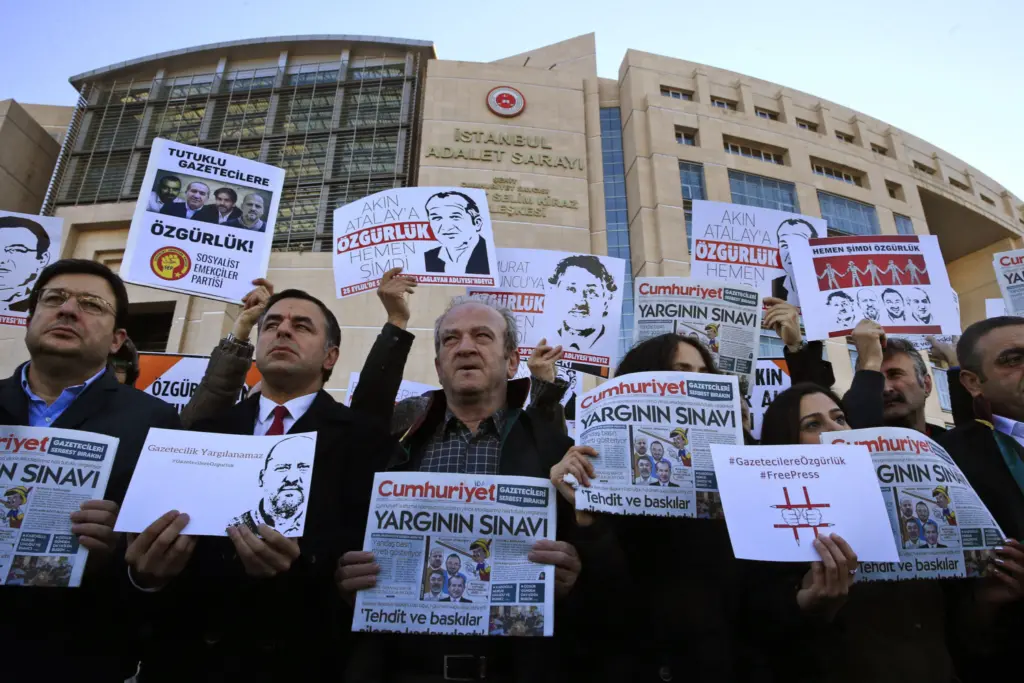
A number of other Turkish writers and public intellectuals have been targeted for their work and writings on cultural exchange. Prominent philanthropist and publisher Mehmet Osman Kavala has been detained since late 2017, when he was arrested while setting up a cultural center for integrating Syrian refugees into the local community.138“Public Outcry as Leading Cultural Figure Detained at Turkish Airport,” Artnet, October 20, 2017, news.artnet.com/art-world/osman-kavala-arrested-1122659 His trial extended through 2021, despite international condemnation of Kavala’s ongoing persecution escalating since 2019.139Carlotta Gall, “Turkish Philanthropist Goes to Trial Again in a Widely Condemned Case,” The New York Times, October 8, 2021, nytimes.com/2021/10/08/world/middleeast/osman-kavala-turkey.html; Agence France Presse, “Europe Rights Body Warns Turkey Over Failure To Free Philanthropist,” Barron’s, June 10, 2021, barrons.com/news/europe-rights-body-warns-turkey-over-failure-to-free-philanthropist-01623322812; “The Court finds a violation of Articles 5 and 18 of the Convention and calls for the immediate release of Mr Kavala, a businessman and human-rights defender who is detained in prison,” European Court of Human Rights, press release, December 10, 2019, hudoc.echr.coe.int/eng-press?i=003-6587080-8727102 By December 2021, the Council of Europe voted to launch infringement proceedings against Turkey for ignoring their 2019 ruling demanding Kavala’s release.140“Execution of the judgment of the European Court of Human Rights: Kavala against Turkey,” European Court of Human Rights, December 2, 2021, rm.coe.int/0900001680a4b3d4 Another author targeted for her work on cultural heritage, Kurdish writer and poet Meral Şimşek, has written about the social realities for Kurds in Turkey in four published works and, most notably, her short story “Arzela.”141Zeynep Kuray, “Meral Şimşek: I will not remain silent,” September 18, 2021, Firat News Agency, anfenglish.com/culture/meral-Simsek-i-will-not-remain-silent-54964 This short story is part of the Kurdistan + 100 anthology exploring how contemporary Kurdish writers envision what a Kurdish state could look like in 2046.142Orsola Casagrande and Mustafa Gundogdu, Kurdistan + 100, trans. Amy Spangler, Nicholas Glastonbury, Andrew Penny, Mustafa Gundogdu, Rojin Hamo, Harriet Paintin & Kate Ferguson, (Manchester: Comma Press, 2022), commapress.co.uk/books/kurdistan-100/ Turkish authorities sentenced Şimşek to 15 months in prison for this short story, calling it “terrorist propaganda.”143“Turkey: Verdict expected in trial of writer and Kurdish PEN member Meral Şimşek,” PEN International, October 5, 2021, pen-international.org/news/turkey-verdict-expected-in-trial-of-meral-simsek While on trial, Şimşek attempted to flee Turkey to escape the inevitable prison sentence, and was caught at the border.144Evrim Kepenek, “Kurdish writer Meral Şimşek tortured with strip search by police in Greece,” Bianet, July 8, 2021, bianet.org/english/migration/246938-kurdish-writer-meral-simsek-tortured-with-strip-search-by-police-in-greece She was detained for eight days and now faces a possible additional five years in prison.145“Turkey: Verdict expected in trial of writer and Kurdish PEN member Meral Şimşek,” PEN International, October 5, 2021, pen-international.org/news/turkey-verdict-expected-in-trial-of-meral-simsek Şimşek was the only writer in Turkey newly detained in 2021, and her case reflects Turkey’s ongoing focus on criminalizing Kurdish heritage. As a target for such repression, she joins journalist Nedim Türfent, imprisoned over 2,000 days for writing about Kurdistan Workers’ Party (PKK) clashes with the Turkish army in 2016.146International Press Institute, “Turkey: Global appeal marks 2000 days in prison for Nedim Türfent,” IFEX, November 3, 2021, ifex.org/turkey-global-appeal-marks-2000-days-in-prison-for-nedim-turfent
Opening an investigation because of articles that can’t be elements of a crime is a threat against all journalists. This means, “We can put you on trial here because of an article that is published in Germany, France, the US.”
Deniz Yücel, interview with Bianet
Writers in Turkey have also been caught up in the increasing numbers of people targeted for crimes of insult.147“Erdoğan sued 38,581 people for ‘insulting the president’ in six years,” Bianet, August 27, 2021, bianet.org/5/94/249380-erdogan-sued-38-581-people-for-insulting-the-president-in-six-years It is illegal in Turkey to insult the president, public officials, the Turkish nation, the Turkish people, Turkish government institutions, or Turkish national heroes.148“Penal Code of Turkey,” European Commission for Democracy through Law, February 15, 2016, legislationline.org/download/id/6453/file/Turkey_CC_2004_am2016_en.pdf As PEN America’s recent report Cracking Down on Creative Voices explains, the European Court of Human Rights has explicitly held that affording special protection to heads of state for “insult” crimes contravenes the European Convention on Human Rights.149Colombani et al v. France, Pakdemirli v. Turkey, Otegi Mondragon v. Spain; see also Cem Tecimer, “The Curious Case of Article 299 of the Turkish Penal Code: Insulting the Turkish President,” Verfassungsblog, July 20, 2018, verfassungsblog.de/the-curious-case-of-article-299-of-the-turkish-penal-codeinsulting-the-turkish-president; “Cracking Down on Creative Voices: Turkey’s Silencing of Writers, Intellectuals, and Artists Five Years After the Failed Coup,” PEN America, accessed March 22, 2022, pen.org/wp-content/uploads/2021/06/cracking-down-creative-voices-turkey-FINAL.pdf In 2016, however, Turkey’s Constitutional Court upheld the law in denial of its obligations under the European Convention.150“Annual Report 2016,” The Constitutional Court of the Republic of Turkey, 2016, ayam.anayasa.gov.tr/media/2742/annualreport2016.pdf, p. 109–112; Ümit Kardaş, “Insulting the Turkish President: Article 299 and why Europe says its illegal,” Ahval News, November 16, 2018, ahvalnews.com/turkey-democracy/ insulting-turkish-president-article-299-and-why-europe-says-its-illegal; see also Cem Tecimer, “The Curious Case of Article 299 of the Turkish Penal Code: Insulting the Turkish President,” Verfassungsblog, July 20, 2018 verfassungsblog.de/the-curious-case-of-article-299-of-the-turkish-penal-code-insultingthe-turkish-president In 2021, two authors faced these charges of insult in increasingly stretched-out trials. After three years of hearings over charges of insulting the President over social media, prolific author Mustafa Sönmez was finally acquitted in June 2021.151“Journalist Mustafa Sönmez acquitted of ‘insulting the president’,” Bianet, June 23, 2021 bianet.org/english/freedom-of-expression/246192-journalist-mustafa-sonmez-acquitted-of-insulting-the-president Author-columnist Ahmet Sever has been on trial since 2019 over charges of insulting a public official and the president in his book My Testimony, which was published that year.152“Ahmet Sever – trial for ‘insulting the President of the Republic’,” Bianet Media Monitoring Database, last updated December 23, 2021, mediamonitoringdatabase.org/the-lawsuit-against-ahmet-sever-the-author-at-t24-and-the-then-chief-advisor-of-the-11th-president-abdullah-gul-for-allegedly-insulting-the-president-of-the-republic; “Ankara investigates over terrorism ex-Gul advisor, author of book on AKP,” Alarabiya, December 22, 2018, english.alarabiya.net/News/world/2018/12/22/Ankara-investigates-over-terrorism-ex-senior-official-who-wrote-a-book-on-AKP- Journalist and publisher Deniz Yücel is also on trial for allegedly insulting the president, Turkish nation, and Turkish people in three articles he wrote in 2016.153“New lawsuit against journalist Deniz Yücel for ‘insulting Erdoğan,’” Bianet, June 15, 2021, bianet.org/english/law/245705-new-lawsuit-against-journalist-deniz-yucel-for-insulting-erdogan He was first arrested in 2017, but was able to escape to Germany in 2018, and he was sentenced in absentia.154“Deniz Yücel elected as the President of PEN Germany,” Bianet, October 27, 2021, bianet.org/english/world/252430-deniz-yucel-elected-as-the-president-of-pen-germany
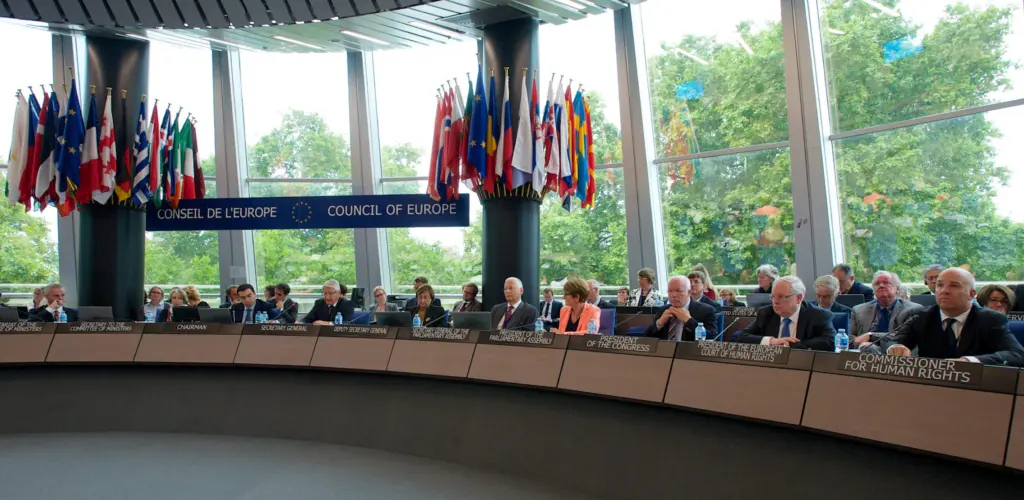

Yücel is one of numerous writers forced to flee Turkey to escape prosecution or abuse—and the Turkish government continues to persecute them outside of its borders. Physical threats and lengthy trials against Turkish journalists, both in the country and in exile, are intensifying. Despite the decrease from 25 writers detained in 2020 to 18 writers detained in 2021, free expression is under ever-escalating attack in the country, in defiance of both international human rights laws and pressure from the international community. On February 2, 2022, the Council of Europe began infringement procedures against Turkey for breaching its obligation to implement European Court of Human Rights judgments in Mehmet Osman Kavala’s case—making it the second country in history to be subjected to the sanction process.155“Turkey: Council of Europe Votes for Infringement Process,” Human Rights Watch, February 2, 2022, hrw.org/news/2022/02/02/turkey-council-europe-votes-infringement-process Disregarding the international body, Turkish court ruled less than three weeks later to keep Kavala in detention.156“Turkish court rules to keep Osman Kavala in jail,” Al Jazeera, February 21, 2022, aljazeera.com/news/2022/2/21/turkish-court-keeps-kavala-in-jail-despite-council-of-europe-move
Egypt
Egypt remains the sixth-highest detainer of writers and public intellectuals globally, with 14 detained in 2021 as the regime of Abdel Fattah El-Sisi continues its brutal crackdown on free expression. The regime’s intolerance for dissent and its penchant for pushing the bounds of its own criminal justice system has resulted in some 60,000 political prisoners since 2013.157“Egypt: ‘What do I care if you die?’: Negligence and denial of health care in Egyptian prisons,” Amnesty International, January 25, 2021, amnesty.org/en/documents/mde12/3538/2021/en; ““We Are in Tombs” Abuses in Egypt’s Scorpion Prison,” Human Rights Watch, September 28, 2016, hrw.org/report/2016/09/28/we-are-tombs/abuses-egypts-scorpion-prison The release-reimprisonment cycle in Egypt is so common that it has its own nickname: Tadweer, or “the recycling.”158“The re-cycling of political prisoners ‘Tadweer’: the Judiciary in Egypt is injustice,” EgyptWatch, January 2, 2021, egyptwatch.net/2021/01/02/the-re-cycling-of-political-prisoners-tadweer-the-judiciary-in-egypt-is-injustice
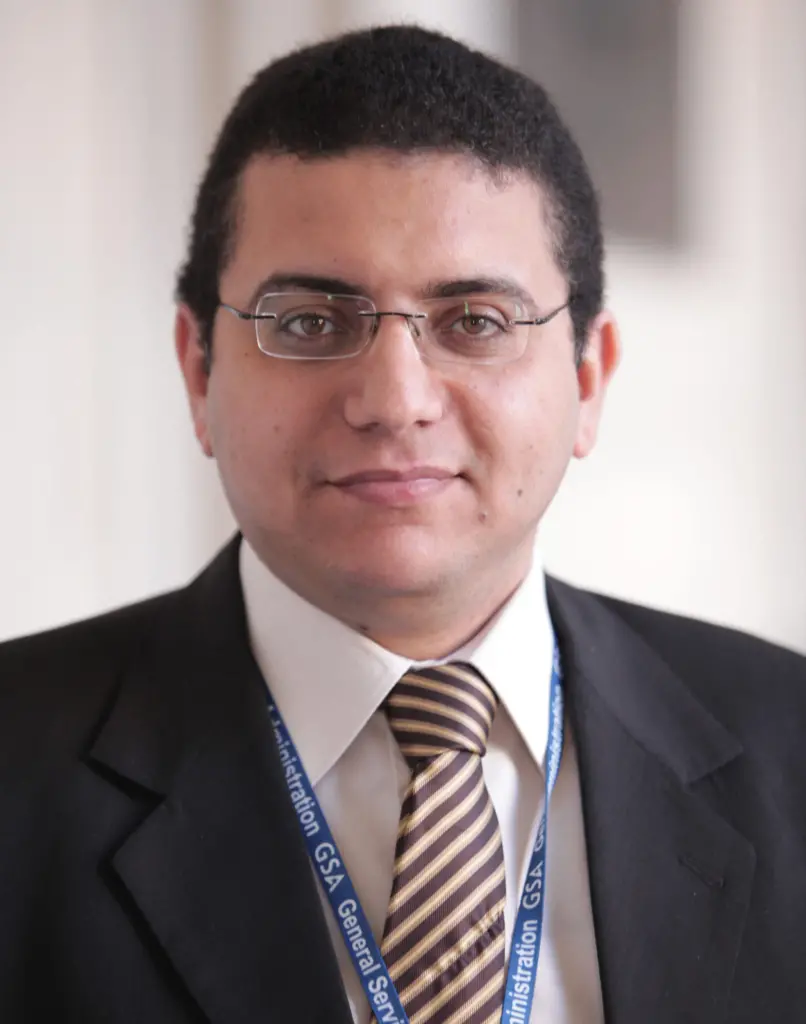
Ismail Alexandrani has been jailed since 2015 for researching topics the Egyptian government wanted to keep under wraps.
With dissent quashed and Egyptians subjected to a harsh surveillance program that monitors their social media usage and doles out associated criminal penalties, a number of the 2021 cases involve people whose engagement in civic debate, writing about El-Sisi, and/or commenting on issues of policy led to their detention or imprisonment.159“Egyptian authorities detain journalist Abdel Naser Salama on terrorism and false news charges,” Committee to Protect Journalists, July 19, 2021, cpj.org/2021/07/egyptian-authorities-detain-journalist-abdel-naser-salama-on-terrorism-and-false-news-charges; “Egypt: Detained journalist on hunger strike must be released immediately,” International Federation of Journalists, October 1, 2021, ifj.org/media-centre/news/detail/category/press-freedom/article/egypt-detained-journalist-on-hunger-strike-must-be-released-immediately.html These cases include that of Ashraf Hamdi, who was arrested on January 25, 2021, after reposting a video to his original political cartoon channel, Egyptoon, marking the 10-year anniversary of the 2011 uprising which led to the overthrow of Hosni Mubarak.160“Egyptian police arrest cartoonist on 10th anniversary of uprising,” Al Jazeera, January 25, 2021, aljazeera.com/news/2021/1/25/egyptian-police-arrest-cartoonist-on-10th-anniversary-of-uprising Hamdi was charged with misusing social networking sites and spreading false news.161“Egypt arrests cartoonist on 10th anniversary of uprising, sources say,” Reuters, January 25, 2021, reuters.com/article/uk-egypt-uprising-anniversary-arrests/egypt-arrests-cartoonist-on-10th-anniversary-of-uprising-sources-say-idUSKBN29U1NI He spent at least 150 days in prison, and was quietly released in the fall of 2021.162“Alert Egypt – Ashraf Hamdi,” Cartooning for Peace, June 24, 2021, cartooningforpeace.org/en/alert-egypt-ashraf-hamdi; Ashraf Hamdi, “I love you,” Facebook post, October 3, 2021, facebook.com/Dr.AshrafHamdi2/posts/1527484930942486 As a political commentator and cartoonist, Hamdi continues to be active on social media.163See Ashraf Hamdi’s personal Facebook account, accessed March 22, 2022, facebook.com/Dr.AshrafHamdi2 A well-known critic of President El-Sisi’s policies, freelance columnist Gamal Al-Gamal was arrested at the Cairo International Airport on February 22, 2021, upon returning from Turkey, where he had been living since 2017.164“Egyptian columnist Gamal al-Gamal arrested, charged with terrorism, false news,” Committee to Protect Journalists, March 1, 2021, cpj.org/2021/03/egyptian-columnist-gamal-al-gamal-arrested-charged-with-terrorism-false-news Al-Gamal was detained and charged with spreading false news, joining a terrorist organization, and inciting public opinion against the state. Released on bail on July 17, 2021, prior to Eid Al-Adha celebrations, Al-Gamal’s health deteriorated while jailed.165“CPJ calls for immediate release of seriously ill Egyptian journalist Gamal al-Gamal,” Committee to Protect Journalists, May 26, 2021, cpj.org/2021/05/cpj-calls-for-immediate-release-of-seriously-ill-egyptian-journalist-gamal-al-gamal; “Leading Egyptian activists freed after nearly two years without trial,” Middle East Eye, July 18, 2021, middleeasteye.net/news/egypt-esraa-abdel-fattah-activist-freed-two-years-without-trial
Egyptian authorities continue to detain writers critical of El-Sisi and his policies in long, repeated cycles of pretrial detention. Well-known columnist and online writer Abdel Nasser Salama, the former editor-in-chief of the Egyptian daily Al Ahram, is reportedly in solitary confinement in the notorious Tora Prison in Cairo, where his medical conditions—high blood pressure, high cholesterol, muscle cramps—go untreated.166“Abdel Naser Salama,” Committee to Protect Journalists, last accessed March 14, 2022, cpj.org/data/people/abdel-naser-salama Salama has been particularly outspoken about the El-Sisi regime’s handling of a highly contentious land and water dispute with Ethiopia.167“Sisi must step down over Ethiopia dam crisis, ex-editor of Al-Ahram says,” Middle East Eye, July 13, 2021, middleeastmonitor.com/20210713-sisi-must-step-down-over-ethiopia-dam-crisis-ex-editor-of-al-ahram-says His most recent arrest, on July 19, 2021, took place six days after publishing a Facebook post called “Do It, President,” which harshly criticized El-Sisi and called for him to step down due to the dispute.168“Egypt detains former al-Ahram editor after he called on Sisi to step down,” Middle East Eye, July 19, 2021, middleeasteye.net/news/egypt-ahram-nasser-salama-sisi-criticism-ethiopia-dam-detained
The release-reimprisonment cycle in Egypt is so common that it has its own nickname: Tadweer, or “the recycling.”
The ongoing crackdown on freedom of thought and artistic expression in Egypt also manifests in increased penalties under military and emergency courts, which operate to extend both detention and imprisonment. As noted in the 2020 Index, political opinion writer and deputy newspaper editor Amer Abdel Moneim was detained at the end of 2020 and placed in pretrial detention, where he remained throughout 2021.169“Two more arrests in Egypt,” Reporters Without Borders, December 23, 2020, rsf.org/en/news/two-more-arrests-egypt; “Freedom to Write Index 2020,” PEN America, accessed March 10, 2022, pen.org/report/freedom-to-write-index-2020/ In a continuous cycle, the court has repeatedly ordered the renewal of his pretrial detention, extending it for another 45 days.170“Criminal Court renews Journalist Amer Abdel-Moneim’s detention for 45 days, despite the deterioration of his health conditions,” Association for Freedom of Thought and Expression, June 10, 2021, afteegypt.org/en/legal-updates-en/legal-news-en/2021/06/10/22877-afteegypt.html Moneim suffers from an untreated viral eye infection, which threatens his vision, as well as from diabetes; he has been denied medically necessary hygienic items, including the sterilizer necessary for his insulin injector pens.171الشبكة المصرية لحقوق الانسان Egyptian Network For Human Rights ENHR, “بطانية واحدة لا تكفى …..,” Facebook, October 14, 2021, facebook.com/106524561326800/posts/277193777593210/?d=n Blogger Alaa Abd El Fattah had been on conditional release for only six months, after serving a previous five-year sentence for organizing a political protest, when he was again arrested on September 29, 2019.172“Egyptian activist Alaa Abdel Fattah rearrested amid crackdown,” Al Jazeera, September 29, 2019, aljazeera.com/news/2019/9/29/egyptian-activist-alaa-abdel-fattah-rearrested-amid-crackdown; “Egyptian activist Alaa Abdel Fattah released after five-year prison term,” Straits Times, March 30, 2019, straitstimes.com/world/middle-east/egyptian-activist-alaa-abdel-fattah-released-after-five-year-prison-term Abd El Fattah was tortured repeatedly and held for over two years in pretrial detention, with the courts rubber-stamping 45-day renewals of his detention all the while.173“Egyptian activist Alaa Abdel Fattah beaten and threatened in prison, say lawyers,” Middle East Eye, October 10, 2019, middleeasteye.net/news/egypt-activist-alaa-abdel-fattah-beaten-and-threatened-prison-say-lawyers; “Egyptian activist Alaa Abdel Fattah has detention extended, says could commit suicide,” New Arab, September 14, 2021, english.alaraby.co.uk/news/egyptian-activist-alaa-abdel-fattah-has-detention-extended On December 20, 2021, he was convicted of “false news” charges stemming from his sharing of a social media post in 2019 about the torture and death of another Egyptian prisoner, and sentenced to five years in prison.174“Egypt jails leading activist Alaa Abdel Fattah for five years,” Al Jazeera, December 20, 2021, aljazeera.com/news/2021/12/20/egypt-jails-leading-activist-alaa-abdel-fattah-for-five-years The sentence does not include the 27 months Abd El Fattah spent in pretrial detention, and cannot be appealed.175Mona Seif (@Monasosh), “بقالي شهور باحاول اروح للدكتور النفسي، شهور مش عارفة استجمع طاقتي ,” Twitter status, February 22, 2022, twitter.com/Monasosh/status/1496096534332645384

A similar timeline befell press freedom advocate and Mada Masr columnist Hisham Fouad. Fouad was detained in June 2019, tortured, and held in arbitrary detention.176“Arrests target political figures involved in new coalition to run in 2020 parliamentary elections,” Mada Masr, June 25, 2019, madamasr.com/en/2019/06/25/feature/politics/arrests-target-political-figures-involved-in-new-coalition-to-run-in-2020-parliamentary-elections; Freedom for Hisham Fouad (@FreeHisham), “Quoting Madiha Hussein, wife of Hisham Fouad,” Facebook, July 14, 2019, facebook.com/FreeHisham/posts/2335853260007574; Ekram Yousef, “خرجنا حالا من زيارة زياد في سجن طرة..,” Facebook, July 9, 2019, facebook.com/ekram.yousef.77/posts/10156026672411331 In July 2021, after beginning a hunger strike, he was moved to solitary confinement and denied medical treatment for his deteriorating health; he was sentenced to four years in prison on November 17, 2021, stemming from conspiracy charges and allegations he had participated in a Muslim Brotherhood plot to overthrow the El-Sisi regime.177International Federation of Journalists, “Egypt: Health of detained journalist Hisham Fouad deteriorates following hunger strike,” August 6, 2021, ifj.org/media-centre/news/detail/category/press-releases/article/egypt-health-of-detained-journalist-hisham-fouad-deteriorates-following-hunger-strike.html; “Egyptian ex-lawmaker and journalists get prison sentences,” Associated Press, November 17, 2021, apnews.com/article/middle-east-africa-religion-egypt-cairo-820d9bdbd57f31cc562c4c9ba62f6523 Fouad’s sentence was handed down by an emergency court and may not be appealed.178“Egyptian ex-lawmaker and journalists get prison sentences,” Associated Press, November 17, 2021, apnews.com/article/middle-east-africa-religion-egypt-cairo-820d9bdbd57f31cc562c4c9ba62f6523 Military courts in Egypt require that a sentence be ratified before it may be appealed, but provide no required timeframe for ratification. In practice, then, courts can circumvent the appeals process by simply failing to ratify their decisions.179“Egypt: Wave of Unjust ‘Emergency’ Trials Prosecutions Fast-Tracked Despite End to State of Emergency,” Human Rights Watch, December 19, 2021, hrw.org/news/2021/12/19/egypt-wave-unjust-emergency-trials Thus, researcher and journalist Ismail Alexandrani, currently serving a 10-year sentence after being detained and held since 2015, may not appeal his sentence, as it has yet to be ratified by the military court.180“Ismail Alexandrani,” Committee to Protect Journalists, accessed March 22, 2022, cpj.org/data/people/ismail-alexandrani Alexandrani’s sentence was handed down on or about May 22, 2018.181“Military court sentences journalist Ismail Alexandrani to 10 years in prison,” Mada Masr, May 22, 2018, madamasr.com/en/2018/05/22/news/u/military-court-sentences-journalist-ismail-alexandrani-to-10-years-in-prison
Belarus
In Belarus, at least 10 writers and public intellectuals spent time behind bars during 2021. This number decreased from 18 in 2020, when mass protests and crackdowns on civil society broke out in response to the illegitimate election of Alexander Lukashenka.182Ivan Nechepurenko, “‘You Cannot Say No’: The Reign of Terror That Sustains Belarus’s Leader,” The New York Times, November 11, 2021, nytimes.com/2020/11/14/world/europe/belarus-lukashenko-protests-crackdown.html In 2020, the Belarusian government represented the single largest increase by country during the year.183“Freedom to Write Index 2020,” PEN America, accessed March 21, 2022, pen.org/report/freedom-to-write-index-2020 The comparatively smaller number of writers detained or imprisoned during 2021, however, does not reflect a freer space for expression in Belarus.

Many writers, artists, and other members of civil society who were arrested during 2020 were released after periods of one- to two-week-long sentences of administrative detention. Some writers have since been jailed again or have been targeted with rearrest following an initially short detention. For example, blogger, author, and political analyst Mikola Dziadok was sentenced in November 2021 to five years in a penal colony on spurious national security crimes related to his writings.184“Pillow-stifling, tear gas, threats of rape: Mikalai Dzyadok gives statement about torture by police,” Belsat, July 1, 2021, belsat.eu/en/news/01-07-2021-pillow-stifling-tear-gas-threats-of-rape-mikalai-dzyadok-gives-statement-about-torture-by-police Dziadok was detained throughout his trial, despite testifying to being tortured by Belarusian authorities.185“Pillow-stifling, tear gas, threats of rape: Mikalai Dzyadok gives statement about torture by police,” Belsat, July 1, 2021, belsat.eu/en/news/01-07-2021-pillow-stifling-tear-gas-threats-of-rape-mikalai-dzyadok-gives-statement-about-torture-by-police Ihar Bancer, a lyricist and singer for punk rock band Mister X, was sentenced to over a year of hard labor in an open-type penal colony in early 2021.186Orlando Crowcroft, “Belarus punk rocker faces 1.5 years hard labour for semi-naked dance protest,” Euronews, June 4, 2021, euronews.com/my-europe/2021/04/05/meet-belarus-most-notorious-punk-who-faces-hard-labour-sentence-after-semi-naked-dance-pro The court later claimed that Bancer had violated the parameters of the penal colony—which reportedly included his falling asleep in a chair—and ordered Bancer’s transfer to a more restricted penal colony.187“Political prisoner Ihar Bantser put in disciplinary cell again. He spent 70 days there since summer,” Belsat, July 12, 2021, belsat.eu/en/news/07-12-2021-political-prisoner-ihar-bantser-put-in-disciplinary-cell-again-he-spent-70-days-there-since-summer; “‘Violating rules’: Court orders to transfer activist Ihar Bantser from correctional facility to penal colony,” Belsat, September 30, 2021, belsat.eu/en/news/30-09-2021-violating-rules-court-orders-to-transfer-activist-ihar-bantser-from-correctional-facility-to-penal-colony Bancer was forced to spend his final days in prison in solitary confinement, and was released in December 2021.188“Hrodna activist and musician Ihar Bantser goes at large,” Belsat, December 17, 2021, belsat.eu/en/news/17-12-2021-hrodna-activist-and-musician-ihar-bantser-goes-at-large
In the year following Belarus’s stolen 2020 election, the authorities have taken severe and preemptive actions to jail prominent writers and civil society figures who have been critical of Alexander Lukashenka in the past. Writer, journalist, and minority Polish activist Andrzej Poczobut was arrested in March 2021 in a home raid and crackdown on the Union of Poles in Belarus, a rights organization that Lukashenka has targeted and of which Poczobut is a prominent member.189“Andrzej Poczobut,” Viasna, accessed March 15, 2022, prisoners.spring96.org/en/person/andrei-paczobut; Maria Wilczek, “Lukashenko plays the Poland card and ratchets up tensions with Warsaw,” Politico, March 30, 2021, politico.eu/article/alexander-lukashenko-belarus-poland-activists-arrests-tension Poczobut remains in detention for “inciting ethnic hatred,” a farcical charge seeming to scapegoat the minority Polish community in Belarus.190“Criminal Case Opened Against Head Of Union of Poles In Belarus Andżelica Borys,” Charter’97, March 25, 2021, charter97.org/en/news/2021/3/25/416102 Poczobut also has a history of critically analyzing and writing about Lukashenka: he was prosecuted for criminal “insult” and “libel” charges back in 2011 for his critical columns, and he is the author of The Belarus System, a book about Lukashenka’s presidency and his impact on the country.191“Andrzej Poczobut presents his book ‘System Belarus’ in Warsaw (photo),” Euroradio, October 24, 2013, euroradio.fm/en/andrzej-poczobut-presents-his-book-system-belarus-warsaw-photo; “Andrzej Poczobut has trial today 2,” Charter’97, September 23, 2013, charter97.org/en/news/2013/9/23/76147; “Information Hero: Andrzej Poczobut,” Reporters Without Borders, accessed March 15, 2022, rsf.org/en/hero/andrzej-poczobut In April 2021, political commentator, author, and literary critic Alexander Feduta was arrested in Moscow for “suspicion of committing a crime” on allegations that he plotted to assassinate Lukashenka and stage a coup.192“Belarus: Two men accused of planning coup arrested in Moscow,” Deutsche Welle, April 17, 2021, dw.com/en/belarus-two-men-accused-of-planning-coup-arrested-in-moscow/a-57241861 Thousands of international writers and several PEN Centers have written open letters supporting his innocence.193Sergei Kuznetsov, “Russia alleges assassination plot against Belarus leader Lukashenko,” Politico, April 18, 2021, politico.eu/article/russia-alleges-assassination-plot-against-belarus-leader-lukashenko-putin-tkhanovskaya; Елизавета Фомина, “‘Режим дошел до полного озверения’: филологи – в защиту Федуты,” Deutsche Welle, May 5, 2021, dw.com/ru/rezhim-doshel-do-polnogo-ozvereniya-filologi-v-zashchitu-feduty/a-57420101; “Statement of PEN Ukraine in support of Belarusian literary scholar Aliaksandr Fiaduta,” PEN Ukraine, April 20, 2021, pen.org.ua/en/zayava-ukrayinskogo-pen-na-pidtrymku-biloruskogo-literaturoznavtsya-alyaksandra-fyaduty Feduta is a former member of Lukashenka’s 1994 political campaign and was briefly head of government media policy before resigning in 1994 and renouncing his support after Lukashenka twice unilaterally censored the press.194Emil Filtenborg and Stefan Weichert, “’He stopped listening… and became cruel’: Lukashenko remembered by former campaign manager,” Euronews, September 28, 2020, euronews.com/my-europe/2020/09/24/he-stopped-listening-and-became-cruel-lukashenko-remembered-by-former-campaign-manager Though he was imprisoned in 2010 for supporting opposition candidates, Feduta has continued to vocally oppose Lukashenka’s rule and has written critically about the crackdown on protesters of the 2020 election. In the month following the initial crackdown, Feduta wrote, “The yearning for freedom always looks insane. Lukashenka truly does not understand why anyone would care about freedom.”195Alexander Feduta, “The Insanity of Freedom: Aleksandr Feduta on Belarus,” Culture.pl, September 23, 2020, culture.pl/en/article/the-insanity-of-freedom-aleksandr-feduta-on-belarus
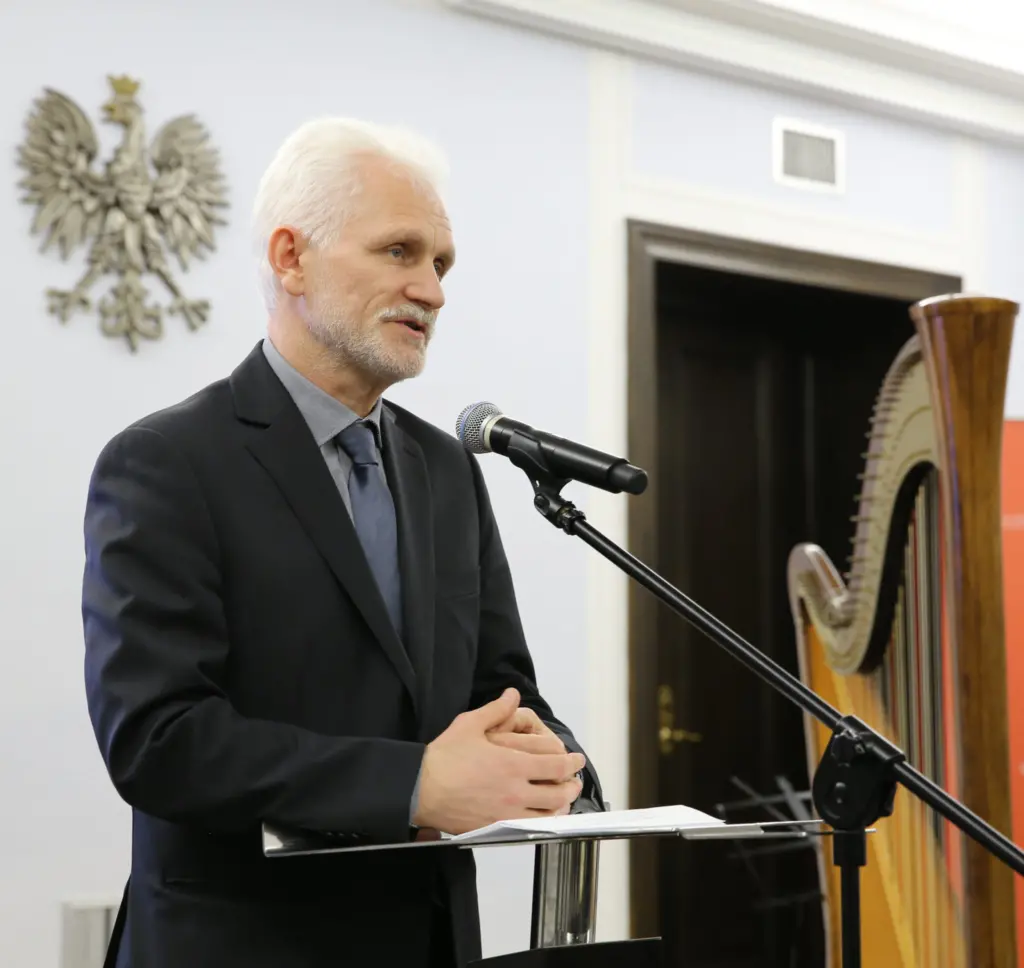
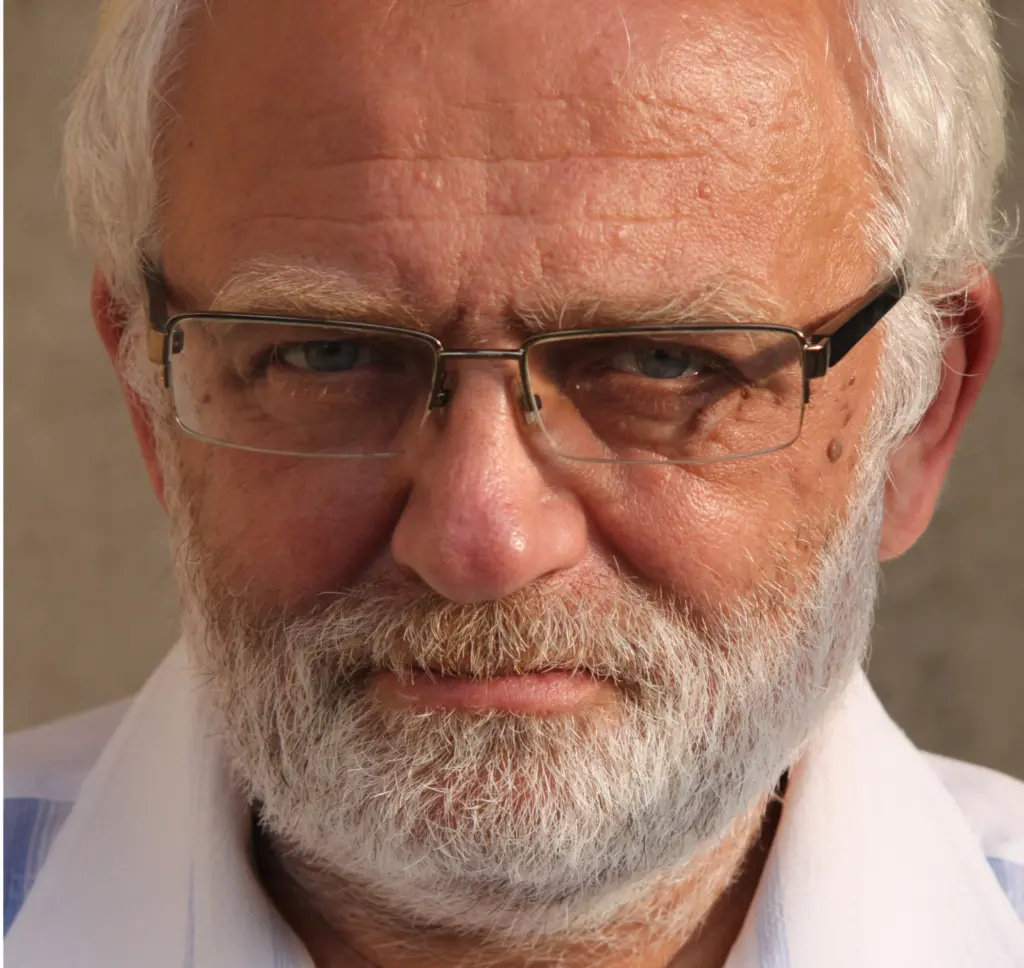
Whereas in 2020, those who joined protests or spoke out about the electoral fraud were often swept up en masse, in 2021 there were more targeted arrests seemingly intended to silence dissidents, analysts, and critics of Lukashenka’s rule. On June 30, KGB officers unexpectedly raided the apartment of political analyst Valeria Kostyugova in an attempt to “mop up the space of producing ideas and thoughts,” according to Kostyugova’s colleague.196“Minsk: Reputed political analyst Valeryia Kastsyuhova placed in pre-trial detention centre,” Belsat, July 2, 2021, belsat.eu/en/news/02-07-2021-minsk-reputed-political-analyst-valeryia-kastsyuhova-placed-in-pre-trial-detention-centre Kostyugova has been a longtime moderator of Our Opinion, a website for political experts to post and share commentary, and has written scholarly works with the Belarusian Institute for Strategic Studies.197“Valeria Kostiugova,” Belarusian Institute for Strategic Studies, accessed March 15, 2022, belinstitute.com/en/author/valeria-kostiugova And in July 2021, the police raided the offices of human rights groups, NGOs, their founders, and independent public intellectuals in what many commentators have described as “black week” and a “total purge of civil society.”198Andrew Roth, “Belarus NGOs condemn government crackdown after ‘black week’ of raids,” The Guardian, July 23, 2021, theguardian.com/world/2021/jul/23/belarus-ngos-condemn-government-crackdown-after-black-week-of-raids The offices of the leading human rights organization Viasna were raided on July 14, 2021, and its founder, also a prominent writer and literary critic, Ales Bialacki was arrested and later charged with retaliatory tax evasion charges in connection with Viasna’s financials.199“Belarus police raid activists’ offices, homes, rights groups say,” Reuters, July 14, 2021, reuters.com/world/europe/belarusian-police-raid-offices-homes-rights-activists-groups-say-2021-07-14; “Court dismisses complaint of Ales Byaliatski about his detention,” Belsat, January 29, 2022, belsat.eu/en/news/29-01-2022-court-dismisses-complaint-of-ales-byaliatski-about-his-detention Three weeks later, on August 4, noted philosopher, essayist, and political analyst Uladzimir Matskevich was arrested in a spurious national security case; Matskevich has described the charges against him as akin to a “thoughtcrime.”200“Public figure Uladzimir Matskevich to be tried for Orwellian ‘thoughtcrime,’” Belsat, August 27, 2021, belsat.eu/en/news/27-08-2021-public-figure-uladzimir-matskevich-to-be-tried-for-orwellian-crimes Matskevich, a well-known political commentator in Belarus who also founded the independent Flying University, was later charged with “organizing actions that grossly violate public order.”201Paula Borowska, “Non-Formal Education in Belarus: Unleashing the Civil Society Potential,” Belarus Digest, November 18, 2014, belarusdigest.com/story/non-formal-education-in-belarus-unleashing-the-civil-society-potential; “Charge brought against philosopher Uladzimir Matskevich,” Belsat, August 18, 2021, belsat.eu/en/news/18-08-2021-charge-brought-against-philosopher-uladzimir-matskevich; See e.g., “Scores detained after defying Belarus protest ban,” Al Jazeera, March 25, 2017, aljazeera.com/news/2017/3/25/scores-detained-after-defying-belarus-protest-ban; “Who is Uladzimir Matskevich?,” Лятучы ўніверсітэт, accessed March 15, 2022, fly-uni.org/who-is-uladzimir-matskevich These deliberate arrests differ from the authorities’ more chaotic, reactive response to mass protests in 2020. Over a year later, Lukashenka and Belarusian authorities appear to have further systematized efforts to stamp out dissent by jailing thought leaders and criminalizing their work.
I understand that I was arrested because of my articles, statements, ideas, and thoughts, that is, I’m going to be tried for ‘malice’ according to Orwell. This is what best characterizes the current regime in Belarus.
Uladzimir Matskevich
Vietnam
The number of writers detained in Vietnam fell only slightly—from 11 in 2020 to 10 in 2021—although the government continues to tighten restrictions on freedom of expression. The country saw manipulation of discourse and increased censorship of anti-government commentary online ahead of the January 2021 congress of the ruling Communist Party of Vietnam, in addition to authorities conducting politically motivated investigations into writers, journalists, and human rights defenders.202Elizabeth Dwoskin, Tory Newmyer, and Shibani Mahtani, “The case against Mark Zuckerberg: Insiders say Facebook’s CEO chose growth over safety,” The Washington Post, October 25, 2021, washingtonpost.com/technology/2021/10/25/mark-zuckerberg-facebook-whistleblower; “Persecution of Activists and Journalists Continues Following Rubber Stamp Elections,” CIVICUS, July 14, 2021, monitor.civicus.org/updates/2021/07/14/persecution-activists-and-journalists-continues-following-rubber-stamp-elections-vietnam Although the expanded freedom of one imprisoned writer in Vietnam was a welcome development in 2021, freedom came at the cost of going into exile; meanwhile, others who spoke out against the government continued to face police intimidation, harassment, and arbitrary arrest and detention.
The majority of writers and public intellectuals jailed in Vietnam are serving lengthy sentences of over 10 years in prison for their free expression.
An ongoing trend over the last several years has involved informal negotiations or formal agreements between the United States and Vietnamese governments in which jailed writers were released in exchange for exile after enduring several years of arbitrary detention. Formerly imprisoned blogger Ho Van Hai was forced to leave his homeland in 2021 after serving three years and five months in prison over a series of blog posts criticizing the government.203“Ho Van Hai,” Freedom Now, accessed March 10, 2022, freedom-now.org/cases/ho-van-hai He was released to a two-year house arrest in 2020, then in May 2021, he left Vietnam for exile in the United States following U.S. State Department negotiations.204“Dissident doctor Ho Hai left Vietnam for the US,” Voice of America Vietnamese, May 26, 2021, voatiengviet.com/a/bac-si-bat-dong-chinh-kien-roi-viet-nam-den-my/5904962.html The situation mimics similar examples in recent years, as in the case of Tran Thi Nga, a writer and activist forced into exile in January 2020 thanks to an agreement between the U.S. and Vietnamese governments. Blogger Nguyen Ngoc Nhu Quynh—better known as Mother Mushroom—has been living in exile since 2018, her sudden release secured shortly after the U.S. Defense Secretary met with top government officials in Vietnam.205Shawn W. Crispin, “Freedom at a high cost for Vietnamese blogger Tran Thi Nga,” Committee to Protect Journalists, February 24, 2020, cpj.org/2020/02/vietnam-blogger-jail-exile-tran-thi-nga; Paul Eckert, “Vietnamese Blogger Mother Mushroom Released, Exiled to US,” Radio Free Asia, October 17, 2018, rfa.org/english/news/vietnam/mushroom-exile-10172018085458.html; “U.S. Secretary of Defense Makes Second Visit to Vietnam in 2018, Highlights Growing U.S.-Vietnam Partnership,” U.S. Embassy and Consulate in Vietnam, October 17, 2018, usembassy.gov/u-s-secretary-of-defense-makes-second-visit-to-vietnam-in-2018-highlights-growing-u-s-vietnam-partnership/
At the same time, Vietnam continued to detain writers in 2021, often handing out lengthy sentences under Article 117 of the country’s criminal code, an overly broad law frequently used to criminalize criticism of the government’s authoritarian rule. For instance, Pham Chi Thanh, an author and a member of the Independent Journalists’ Association of Vietnam, was arrested on May 21, 2020, for his book criticizing the Communist Party General Secretary Nguyen Phu Trong.206“Vietnamese Dissident Writer Arrested on Subversion Charge,” Radio Free Asia, May 21, 2020, rfa.org/english/news/vietnam/writer-05212020135521.html He was held in pretrial detention for over a year before he was allowed to meet with a lawyer for the first time.207“Vietnam: Free Prominent Novelist,” Human Rights Watch, July 8, 2021, hrw.org/news/2021/07/08/vietnam-free-prominent-novelist On July 9, 2021, under Article 117, a Hanoi court sentenced him to five years and six months in prison, plus five years of probation.208“Writer Pham Thanh was sentenced to 5 years and 6 months in prison,” BBC News Vietnamese, July 9, 2021, bbc.com/vietnamese/vietnam-57774093
I’ve worked in a number of organizations, and I recognize that people will speak up, and only speak up, when they see themselves as part of the organization. People only strongly attach themselves to the nation when they feel they have shared visions for the future; only then will they feel inspired to turn these visions into reality.
Pham Doan Trang on her blog, translated by The Vietnamese
Vietnam’s prosecution of dissidents consistently fell short of fair trial standards, jettisoning defendants’ rights to due process during notably hasty trials. In December 2021, in a span of three days, four Vietnamese human rights defenders were sentenced to prison for alleged anti-state propaganda, including celebrated writer Pham Doan Trang.209Ravina Shamdasani, “Press briefing notes on Vietnam,” United Nations Office of the High Commissioner for Human Rights, December 17, 2021, previous.ohchr.org/en/newsevents/pages/DisplayNews.aspx?NewsID=27977&LangID=E A leading voice for human rights and democracy, Pham Doan Trang has been in prison since October 2020, when authorities arrested her for the alleged dissemination of anti-state propaganda.210RFA Vietnamese, “Rights Groups Deplore Arrest of Vietnam Writer and Activist Pham Doan Trang,” Voice of America, October 8, 2020, voanews.com/press-freedom/rights-groups-deplore-arrest-vietnam-writer-and-activist-pham-doan-trang Charged under Articles 88 and 117 of Vietnam’s criminal code, she was held incommunicado for over a year, until finally being allowed to meet with one of her lawyers for the first time in October 2021.211“Viet Nam: Immediately release independent journalist and human rights defender Pham Doan Trang,” Human Rights Watch, October 26, 2021, hrw.org/news/2021/10/26/vietnam-immediately-release-independent-journalist-and-human-rights-defender-pham-0 Also that month, the UN Working Group on Arbitrary Detention (WGAD) released an opinion deeming her detention arbitrary and calling for her immediate release.212“Viet Nam: release writer held on ‘propaganda’ charges – UN experts,” United Nations Office of the High Commissioner for Human Rights, October 28, 2021, previous.ohchr.org/en/NewsEvents/Pages/DisplayNews.aspx?NewsID=27734&LangID=E; Chris Humphrey, “Vietnam jails its ‘most famous activist’ for nine years,” The Washington Post, December 14, 2021, washingtonpost.com/world/asia_pacific/vietnam-press-freedom-pham-doan-trang/2021/12/14/8ed0f008-57e4-11ec-8396-5552bef55c3c_story.html On December 14, 2021, Pham Doan Trang was sentenced to nine years in prison—two years longer than requested by the prosecutor. She was only notified of her trial date one day before it took place, and the hearing lasted only a few hours. Her writing on human rights themes and interviews with international media used as evidence of her alleged crimes.213”Vietnamese journalist who is RSF laureate gets nine years in prison,” Reporters Without Borders, December 14, 2021, rsf.org/en/news/vietnamese-journalist-who-rsf-laureate-gets-nine-years-prison; “Viet Nam: Crackdown on dissent continues with ‘egregious’ nine-year sentence for Pham Doan Trang,” Amnesty International, December 14, 2021, amnesty.org/en/latest/news/2021/12/vietnam-pham-doan-trang-conviction/ In February 2022, she was named as a recipient of the 2022 Martin Ennals Award for Human Rights Defenders—the first activist from Vietnam to receive the award.214“Jailed Vietnamese journalist wins human rights award,” Radio Free Asia, January 20, 2022, rfa.org/english/news/vietnam/award-01202022155751.html
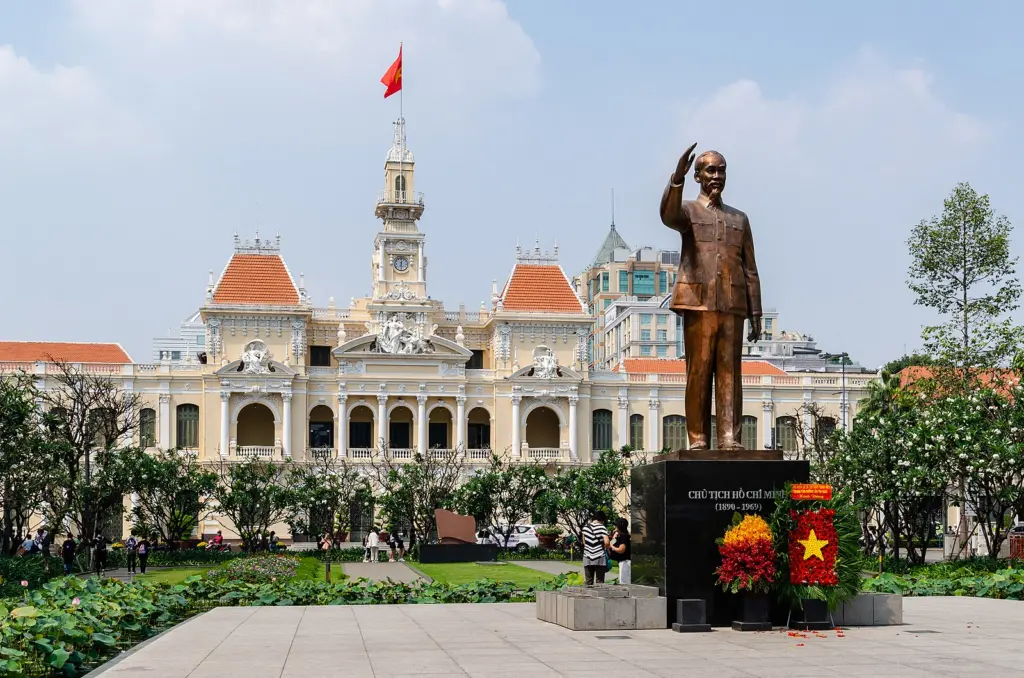
Other key cases include that of Huynh Thuc Vy, a blogger and women’s rights activist who was arrested after she posted a photo online of herself with a Vietnamese flag defaced with spray paint. Sentenced to nearly three years in prison in November 2018, the execution of her imprisonment was postponed until her infant child was no longer nursing.215“Vietnamese Blogger to Serve Almost Three Years For Defacing Flag,” Radio Free Asia, November 30, 2018, rfa.org/english/news/vietnam/flag-11302018141521.html On December 1, 2021, she was arrested to fulfill her sentence—a few months later, prison officials transferred her to Gia Trung prison, hundreds of kilometers away from her home, without notifying her family.216“Activist Huynh Thuc Vy was arrested by the police after announcing the cancellation of the decision to postpone serving the sentence,” Radio Free Asia, December 1, 2021, rfa.org/vietnamese/news/vietnamnews/activist-huynh-thuc-vy-arrested-after-3-years-stay-of-execution-12012021071654.html; “Prisoner of conscience Huynh Thuc Vy was transferred to a prison away from home right after Tet,” Radio Free Asia, February 18, 2022, rfa.org/vietnamese/news/vietnamnews/poc-huynh-thuc-vy-was-transferred-to-another-prison-away-from-home-02182022025002.html Nguyen Tuong Thuy is another critic who blogged about civil rights and press freedom issues in Vietnam until his arrest in May 2020.217“Vietnamese Blogger Nguyen Tuong Thuy Arrested For Holding ‘Anti-State’ Documents,” Radio Free Asia, May 23, 2020, rfa.org/english/news/vietnam/blogger-arrest-05232020112257.html On January 5, 2021, he was convicted of disseminating “anti-state propaganda,” along with journalists Le Huu Minh Tuan and Pham Chi Dung.218“US, EU Demand Release of Vietnamese RFA Blogger and Others Jailed For ‘Peaceful Expression’ of Views,” Radio Free Asia, January 6, 2021, rfa.org/english/news/vietnam/demand-01062021170023.html All three writers were given heavy sentences as punishment for their critical views—both Nguyen Tuong Thuy and Le Huu Minh Tuan were sentenced to 11 years in prison, and Pham Chi Dung was handed 15 years behind bars.219“Viet Nam: Arrests send chilling message before key Party meeting – UN experts,” United Nations Office of the High Commissioner for Human Rights, January 14, 2021, ohchr.org/EN/NewsEvents/Pages/DisplayNews.aspx?NewsID=26661 Such extreme sentences for writers are distressingly common; essayist Tran Anh Kim and author Tran Huynh Duy Thuc were both accused and convicted on politically-motivated charges of attempting to overthrow the state for their pro-democracy views. They are each currently serving sentences of 13 years and 16 years in prison, respectively.220“Viet Nam: Serious health concerns for prisoner of conscience: Trần Anh Kim,” Amnesty International, May 16, 2018, amnesty.org/en/documents/asa41/8432/2018/en/; “Jailed Vietnamese Democracy Advocate Vows Hunger Strike to His Death,” Radio Free Asia, August 2, 2021, rfa.org/english/news/vietnam/strike-08022021144250.html Tran Duc Thach, a poet and novelist who will likely reach his 70th birthday in jail, is imprisoned on a 12-year sentence, recently upheld on appeal in March 2021.221“Vietnamese Dissident Writer Sent Back to Serve 12-Year Term After Losing Appeal,” Radio Free Asia, March 24, 2021, rfa.org/english/news/vietnam/writer-03242021165252.html The consistent execution of lengthy sentences in Vietnam sent a chilling message to writers in 2021, as authorities carried on with their systematic approach to extinguishing dissent through intimidation and fear tactics.
India
In the context of continued threats to free expression in the country, the number of writers behind bars in India in 2021 declined marginally, with eight cases counted in the Index for 2021.222“Freedom to Write Index 2020,” PEN America, accessed March 21, 2022, pen.org/report/freedom-to-write-index-2020 The majority of these individuals are connected to the ongoing Elgar Parishad case, which concerned a deadly inter-caste altercation in the village of Bhima Koregaon in 2018. In the aftermath of the violence—in which one person was killed and five injured—both state- and national-level authorities detained and aggressively pursued charges against a broad swathe of leftist writers and intellectuals, accusing them of inciting the violence and of links to banned groups.223Sukanya Shantha, “Bhima Koregaon: In 5,000-Page Chargesheet, Pune Police Say Activists Incited Violence,” The Wire, November 16, 2018, thewire.in/rights/bhima-koregaon-case-pune-police-chargesheet In August 2021, after years of delay, the National Investigation Agency (NIA) finally submitted 17 charges under the penal code and sections of the Unlawful Activities (Prevention) Act (UAPA) in the case.224Vidya, “NIA submits 17 draft charges against accused in Elgar Parishad case. Here are the details,” India Today, August 23, 2021, indiatoday.in/india/story/nia-charges-bhima-koregaon-elgar-parishad-accused-mumbai-1844058-2021-08-22 Health concerns have beset a number of the detained writers, and they have been subjected to restrictions on sending and receiving letters and on accessing reading materials while in prison.225Sukanya Shantha, “Jail Authorities Are Blocking Letters From Elgar Parishad Arrested to Their Loved Ones,” The Wire, October 6, 2021, thewire.in/rights/jail-authorities-are-blocking-letters-from-elgar-parishad-arrested-to-their-loved-ones; Sonam Saigal, “NIA court reject medical bail pleas of four Bhima-Koregaon case accused,” The Hindu, September 21, 2021, thehindu.com/news/national/nia-court-rejects-medical-bail-of-shoma-sen-anand-teltumbde-gautam-navlakha-and-vernon-gonsalves/article36598726.ece The majority remain detained and are awaiting trial, including writers Hany Babu, Arun Ferreira, Vernon Gonsalves, Gautam Navlakha, and Anand Teltumbde.226“Elgar Parishad case: NIA court rejects bail pleas of Prof Hany Babu, 3 other accused,” The News Minute, February 15, 2022, thenewsminute.com/article/elgar-parishad-case-nia-court-rejects-bail-pleas-prof-hany-babu-3-other-accused-160984; “Elgar Parishad: Bombay HC Grants NIA, Maha Govt 2 Weeks to Respond to Activists’ Bail Review Plea,” The Wire, February 10, 2022, thewire.in/law/elgar-parishad-bombay-hc-grants-nia-maha-govt-2-weeks-to-respond-to-activists-bail-review-plea; Sonam Saigal, “NIA court reject medical bail pleas of four Bhima-Koregaon case accused,” The Hindu, September 21, 2021, thehindu.com/news/national/nia-court-rejects-medical-bail-of-shoma-sen-anand-teltumbde-gautam-navlakha-and-vernon-gonsalves/article36598726.ece
During the course of the year, courts rejected repeated bail requests for Gonsalves and Teltumbde—including one request made by Teltumbde for a 15-day reprieve following the death of his brother—although Babu was released once very briefly on the grounds of poor health before being pulled back into jail.227“Anand Teltumbde denied bail,” The Hindu, December 1, 2021, thehindu.com/news/cities/mumbai/anand-teltumbde-denied-bail/article37796340.ece; “Elgar Parishad: Bombay HC Grants NIA, Maha Govt 2 Weeks to Respond to Activists’ Bail Review Plea,” The Wire, February 10, 2022, thewire.in/law/elgar-parishad-bombay-hc-grants-nia-maha-govt-2-weeks-to-respond-to-activists-bail-review-plea; “Elgar Parishad case: Hany Babu to be shifted back to Navi Mumbai jail, says HC,” Hindustan Times, August 18, 2021, hindustantimes.com/cities/mumbai-news/elgar-parishad-case-hany-babu-to-be-shifted-back-to-navi-mumbai-jail-says-hc-101629228339713.html A letter written by Teltumbde, Ferreria, and other activists was confiscated by prison authorities in August 2021, and authorities mounted a concerted effort to restrict Teltumbde and Gonsalves from sending and receiving certain communications, including with their lawyers, throughout 2021.228“Bhima Koregaon: Letters to families, lawyers scanned by jail official, allege 10 arrested activists,” Scroll, August 27, 2021, scroll.in/latest/1003876/bhima-koregaon-letters-to-families-lawyers-scanned-by-jail-official-allege-10-arrested-activists; “Dr Anand Teltumbde writing suspicious content in letters: NIA affidavit in HC,” Hindustan Times, August 17, 2021, hindustantimes.com/cities/mumbai-news/dr-anand-teltumbde-writing-suspicious-content-in-letters-nia-affidavit-in-hc-101634916102045.html Poet P. Varavara Rao, elderly and in very fragile health after testing positive for COVID-19 in 2020, in addition to incurring a head injury while in state custody, won a six-month release on bail in February 2021.229Srinivasa Rao Apparasu, “Can’t afford Mumbai rent, says Varavara Rao’s family on court’s bail condition,” Hindustan Times, February 22, 2021, hindustantimes.com/india-news/where-in-mumbai-varavara-rao-s-family-as-court-declines-hyderabad-return-101613996269475.html Rao’s temporary release has since been extended in repeated small increments, but he had to remain in Mumbai, hundreds of miles away from his family in Hyderabad, and was not allowed to have contact with the others accused in the case.230K A Y Dodhiya, “Varavara Rao fell from bed, unable to do anything on his own; allow us to help: Family to state,” Hindustan Times, July 21, 2020, hindustantimes.com/mumbai-news/give-us-updates-on-health-allow-kin-to-help-him-varavara-rao-s-family-to-state/story-a2Mv5dYQTma8tokaPVQVeK.html After numerous attempts, Sudha Bharadwaj managed to win a conditional release in December 2021; she was released from pretrial detention, but the terms of her bail include no travel outside the jurisdiction of the Mumbai court without permission, no statements online or in print about the case, and no communication with her co-accused.231“Elgaar Parishad case: 3 years after arrest, Sudha Bharadwaj out on bail,” Indian Express, December 10, 2021, indianexpress.com/article/cities/mumbai/elgaar-parishad-case-3-years-after-arrest-sudha-bharadwaj-out-on-bail-7664911
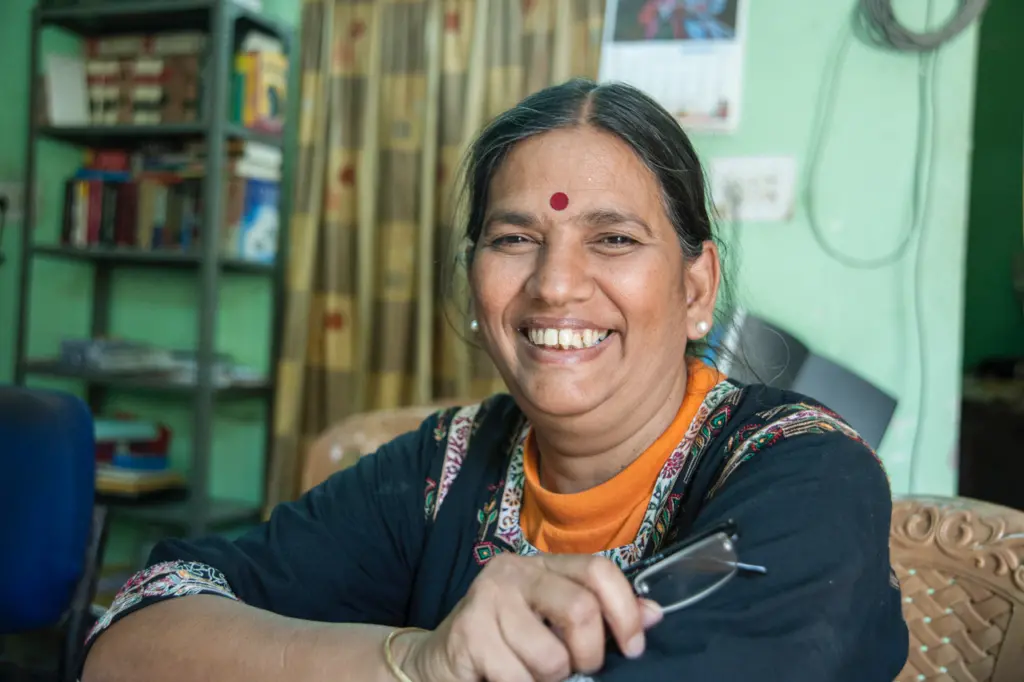
In a new case that is illustrative of the heightened threats against religious minorities, and particularly Muslims, under the Modi government, Munawar Faruqui, a comedian, was arrested after a police report was filed alleging that he had “insulted Hindu deities.”232Prachi Sibal, “We Spoke with the Indian Comedian Who Was Arrested for Jokes He Didn’t Crack,” Vice News, March 19, 2021, vice.com/en/article/g5baa3/interview-with-munawar-faruqui-indian-comedian-arrested Despite a lack of evidence, he was held in jail for just over a month before being released on bail by India’s Supreme Court after earlier appeals failed.233“Supreme Court Grants Interim Bail to Comedian Munawar Faruqui,” The Wire, February 5, 2021, thewire.in/rights/supreme-court-grants-interim-bail-to-comedian-munawar-faruqui Rana Ayyub, an outspoken and critical columnist and opinion writer, has faced a range of threats during 2021, including the filing of legal charges as well as a sustained campaign of online harassment and trolling. Complaints have been filed against her in an attempt to discredit her fundraising for COVID and disaster relief, which UN experts have called “baseless.”234“UN experts say journalist Rana Ayyub facing legal harassment from the Indian government,” Scroll.in, February 21, 2022, scroll.in/latest/1017914/un-experts-say-journalist-rana-ayyub-facing-judicial-harassment Police also opened a criminal investigation into Ayyub and other journalists for a video they shared on social media.235“Indian police open criminal investigation into The Wire and 3 journalists,” Committee to Protect Journalists, June 16, 2021, cpj.org/2021/06/indian-police-open-criminal-investigation-into-the-wire-and-3-journalists Meanwhile, Ayyub struggled with misinformation attacks by right-wing groups and publications, allegedly to discredit her journalism work.236Rana Ayyub, “Opinion: The Indian government continues to harass journalists. I’m facing prison over a tweet,” The Washington Post, June 29, 2021, washingtonpost.com/opinions/2021/06/29/rana-ayyub-india-journalism-modi-harassment The fundraising debacle escalated through 2021: in September 2021, Ayyub was slapped with spurious charges of money laundering.237“ED attaches Rs 1.77 cr of Rana Ayyub in money laundering case,” Deccan Herald, February 10, 2022, deccanherald.com/national/ed-attaches-rs-177-cr-of-rana-ayyub-in-money-laundering-case-1080225.html She reflected on the harassment in an opinion piece later that month for The Washington Post, lamenting that, “I’ve barely written or reported, because all my energy has gone to battling the latest accusations and clearing my name.”238Rana Ayyub, “Opinion: The Indian government continues to harass journalists. I’m facing prison over a tweet,” The Washington Post, June 29, 2021, washingtonpost.com/opinions/2021/06/29/rana-ayyub-india-journalism-modi-harassment Her case is indicative of many others: in recent years, dozens of Indian writers and public intellectuals have faced spurious legal charges, other punitive administrative actions, and threats both on and offline in response to their expression of dissenting viewpoints. Those particularly at risk include those with a history of advocating on behalf of India’s marginalized and minority groups, challenging the caste system and promoting the rights of economically disadvantaged populations, and those who have spoken out against Prime Minister Narendra Modi’s increasingly virulent brand of Hindu nationalism.
More broadly, the environment for free expression in India continued to decline in 2021. Freedom House, which had downgraded India from “Free” to “Partly Free” in their annual Freedom in the World report for 2020, noted further worrying trends in 2021, including a February 2021 law restricting anonymity and encryption on social media applications, and the official use of Pegasus spyware against journalists and human rights activists.239“Draft rules: Social media firms to reveal first originator of message, OTT to self-regulate, digital media to have grievance officer,” The Indian Express, February 25, 2021, indianexpress.com/article/technology/tech-news-technology/new-social-media-rules-whatsapp-twitter-facebook-ott-7204309; “Anatomy of the Pegasus spyware in India,” IFEX, July 23, 2021, ifex.org/anatomy-of-the-pegasus-spyware-in-india; “India: Freedom in the World 2020,” Freedom House, accessed March 22, 2022, freedomhouse.org/country/india/freedom-world/2020; “India: Freedom in the World 2021,” Freedom House, accessed March 22, 2022, freedomhouse.org/country/india/freedom-world/2021 Modi’s government shut down the internet for 48 days over the course of the year.240“India’s war on the internet,” The Economic Times, February 18, 2022, economictimes.indiatimes.com/tech/newsletters/ettech-unwrapped/indias-war-on-the-internet/articleshow/89671072.cms The government restricted the internet to stifle news and communications about the farmer protests in the capital of New Delhi, which opposed laws intended to deregulate their industry. In Kashmir, the fiercely contested region in between Pakistan and India, where militant groups and security forces engage in regular skirmishes and dozens of civilians were killed during 2021, the government also continued to regulate internet speeds; Kashmir was previously under a dramatic, six-months-long blanket internet shutdown, the end of which was marked with continued restrictions on accessing social media.241Safwat Zargar, “Kashmir 2021: How the Valley changed after the killings of religious and ethnic minorities,” Scroll.in, December 30, 2021, scroll.in/article/1013919/kashmir-2021-how-the-valley-changed-after-the-killings-of-religious-and-ethnic-minorities; Anjana Pasricha, “India Restores Some Internet in Kashmir After Nearly Six Months,” Voice of America, January 25, 2020, voanews.com/a/south-central-asia_india-restores-some-internet-kashmir-after-nearly-six-months/6183159.html Dissident voices from the region continued to experience various types of pressure, with journalists and others subject to brief detentions, travel bans, and threats from Indian security forces to curb their criticism.242Junaid Kathju, “Summoned, Raided, Censored: Crackdown on Journalists Is the New Normal in Kashmir,” The Wire, September 22, 2021, thewire.in/media/summoned-raided-censored-crackdown-on-journalists-is-the-new-normal-in-kashmir; “Jammu and Kashmir authorities detain, question 5 journalists; hold Salman Shah, Suhail Dar,” Committee to Protect Journalists, October 15, 2021, cpj.org/2021/10/jammu-and-kashmir-authorities-detain-question-5-journalists-hold-salman-shah-suhail-dar/; “Indian police open criminal investigation into The Wire and 3 journalists,” Committee to Protect Journalists, June 16, 2021, cpj.org/2021/06/indian-police-open-criminal-investigation-into-the-wire-and-3-journalists/ The government also engaged in censorship of online criticism—including from opposition politicians—concerning the government’s response to the COVID-19 pandemic.243”PEN America Condemns Indian Government Attempts to Block COVID Criticism,” PEN America, April 28, 2021, pen.org/press-release/pen-america-condemns-indian-government-attempts-to-block-covid-criticism/
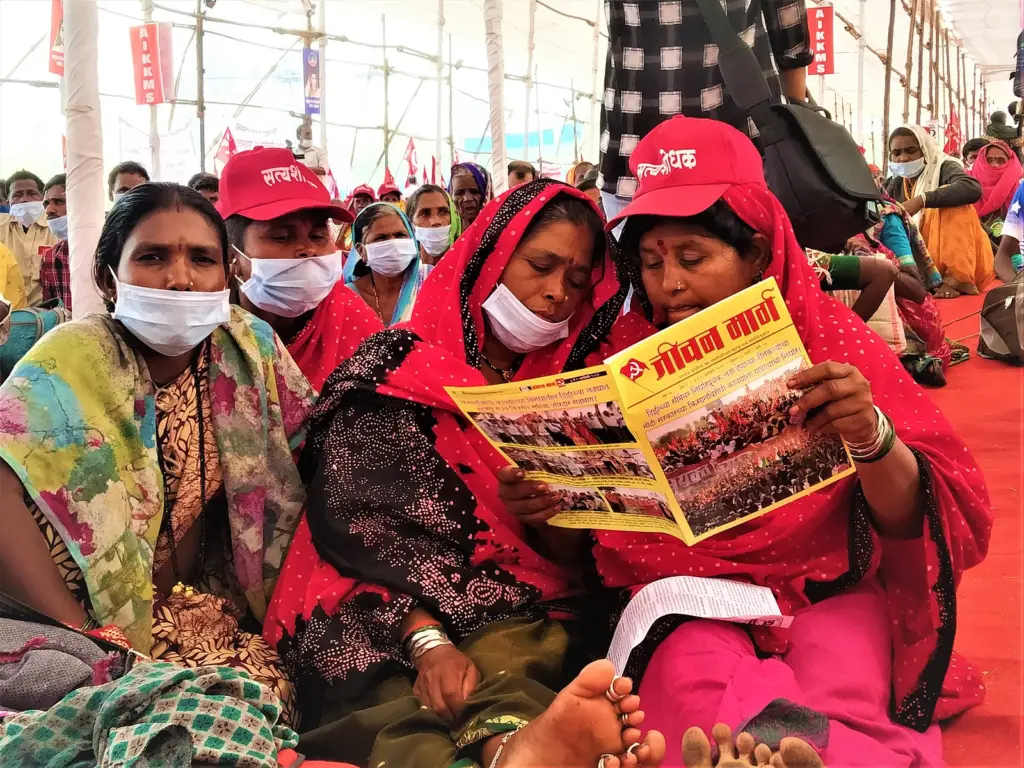
Political pressure is also mounting on Indian academics and scholars, both within the country and overseas. In March 2021, two professors resigned from a Delhi university following their vocal critiques of the country’s political leadership,244“Resignation of Two Professors Highlights Growing Academic Freedom Crisis in India,” PEN America, March 24, 2021, pen.org/press-release/resignation-of-two-professors-highlights-growing-academic-freedom-crisis-in-india/ and in September 2021, scholars and universities inside and outside India faced severe online harassment for their participation in Syracuse University’s “Dismantling Global Hindutva” conference.245“Threats to Participants in Hindu Nationalism Conference Risk Silencing Academic Freedom,” PEN America, September 10, 2021, pen.org/press-release/threats-to-participants-in-hindu-nationalism-conference-risk-silencing-academic-freedom/; Raqib Hameed Naik, “US academic conference on ‘Hindutva’ targeted by Hindu groups,” Al Jazeera, September 7, 2021, aljazeera.com/news/2021/9/7/us-academic-conference-dismantling-global-hindutva-hindu-right-wing-groups Hindutva is a political ideology supported by the ruling Bharatiya Janata Party (BJP) seeking hegemony of Hinduism in India, and Indian right-wing groups led an intimidation campaign against scholars and universities participating in the event. The 2021 Free To Think report by Scholars at Risk describes the shrinking space for academic freedom in the country, citing physical injuries to protesting students in February 2021, professors forced to resign for class or social media content, and an official inquiry launched over a master’s student’s thesis referring to “India Occupied Kashmir.”246“Free to Think 2021: India,” Scholars at Risk, accessed March 14, 2022, scholarsatrisk.org/wp-content/uploads/2021/12/Free-to-Think-2021-India.pdf India remains the only relatively free and democratic country in the Index’s top ten, an outlier, but also a warning sign that the jailing of writers and broader curbs on free expression represent but one element of the ruling party’s attempts to quash dissent and entrench political control.
Eritrea
Freedom of expression in Eritrea has remained completely closed in the 20 years since the government imposed its sweeping and opportunistic crackdown on journalists and writers in the wake of the September 11 attacks in 2001. Entering a third decade after the shuttering of all independent press and media, Eritrea detained a total of eight writers in 2021—the same eight included in the 2020 Freedom to Write Index, the majority of whom have been imprisoned without trial for over 20 years.247“Freedom to Write Index 2019,” PEN America, accessed March 10, 2022, pen.org/report/freedom-to-write-index-2019/; “Freedom to Write Index 2020,” PEN America, accessed March 10, 2022, pen.org/report/freedom-to-write-index-2020/
This past year, writers Dawit Isaak, Amanuel Asrat, Fessehaye Yohannes, Medhanie Haile, and Temesgen Ghebreyesus each marked the 20th anniversary of their arbitrary detention.248“Eritrea: Release journalists and politicians arrested 20 years ago,” Amnesty International, September 17, 2021, amnesty.org/en/latest/news/2021/09/eritrea-release-journalists-and-politicians-arrested-20-years-ago/ In the case of Amanuel Asrat—an Eritrean poet, songwriter, and critic—very little information has been made public about his condition ever since his arrest on September 23, 2001. In October 2020, Asrat received the PEN International Writer of Courage Prize, even as his whereabouts remain unknown.249Alison Flood, “Eritrean poet Amanuel Asrat named International Writer of Courage,” The Guardian, October 13, 2020, theguardian.com/books/2020/oct/13/eritrean-poet-amanuel-asrat-named-international-writer-of-courage Dawit Isaak, a playwright who holds dual Eritrean and Swedish citizenship, was recognized in May 2021 as one of the longest-detained journalists in the world.250Irwin Cotler, Shirin Ebadi, Christophe Deloire, “Opinion: The world’s longest-imprisoned journalist deserves justice,” Raoul Wallenberg Centre for Human Rights, May 3, 2021, raoulwallenbergcentre.org/en/news/opinion-the-world-s-longest-imprisoned-journalist-deserves-justice The UN Office of the High Commission for Human Rights issued a statement in August 2021 renewing its demands for his release from the infamous Eiraeiro Prison, citing the continued uncertainty over his condition.251“Eritrea: UN experts demand release of human rights defender held 20 years without charge,” United Nations Office of the High Commissioner for Human Rights, August 18, 2021, ohchr.org/EN/NewsEvents/Pages/DisplayNews.aspx?NewsID=27392 Of the 10 other journalists arrested alongside Isaak in 2001, seven are believed to have died in detention.252“Eritrea ended media freedom 15 years ago this month,” Reporters Without Borders, September 21, 2016, rsf.org/en/news/eritrea-ended-media-freedom-15-years-ago-month Other high-profile detainees include Berhane Abrehe, a former top government official and a critic of the president, who was arrested in September 2018, barely a week after publishing Eritrea My Country, a book criticizing the government’s autocracy.253“Eritrea: Release former finance minister immediately and unconditionally,” Amnesty International, September 19, 2018, amnesty.org/en/latest/news/2018/09/eritrea-release-former-finance-minister-immediately-and-unconditionally/ Like many others, Abrehe is being held without trial, and his conditions and whereabouts are unknown.254Jaclynn Ashly, “Call to release Eritrean political prisoners,” New Frame, June 8, 2020, newframe.com/call-to-release-eritrean-political-prisoners/
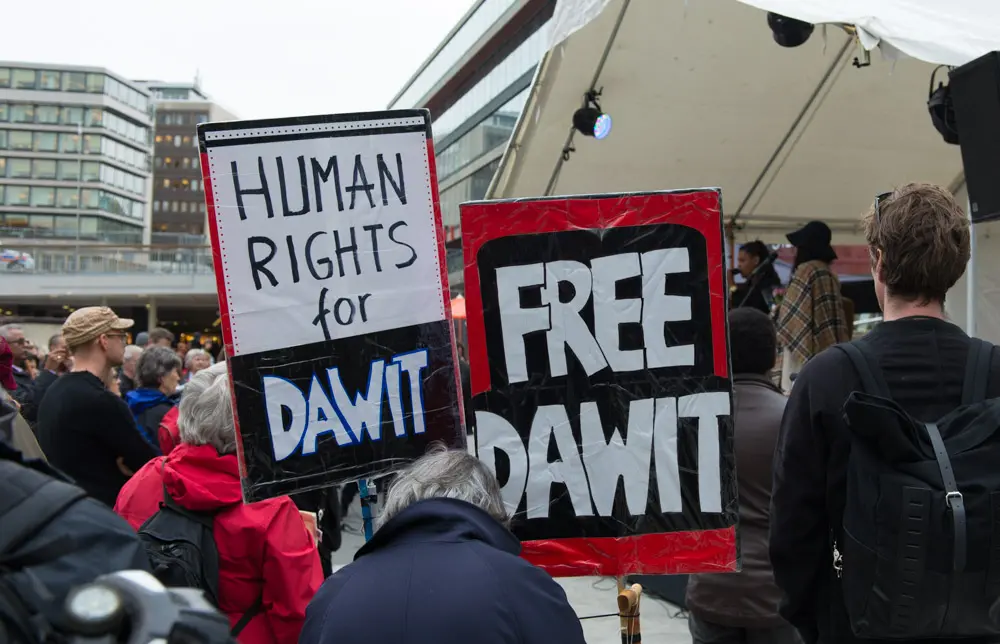
After the Eritrean government banned all non-state press and media outlets in 2001, the country saw an unprecedented wave of arrests, as journalists, writers, and media representatives were rounded up and detained without trial.255“Eritrea Archives: 2001,” Committee to Protect Journalists, accessed March 10, 2022, cpj.org/africa/eritrea/2001/ Since then, authorities have demonstrated a relentless commitment to upholding open-ended politically motivated detentions for writers, presumably arrested in retaliation for their criticism of the government, with no official charges being filed to justify their lengthy jailing, and no sign of any other resolution to their cases. All eight writers on PEN America’s list remain in incommunicado detention, and the government has ignored repeated calls to confirm the details and whereabouts of those in jail. Amidst other egregious human rights abuses exercised by Eritrean authorities and documented by the UN Commission of Inquiry on human rights in Eritrea—including enslavement, forced disappearances, and torture—Eritreans risk arbitrary arrest for any form of dissent, and many have chosen to flee the country in recent years.256Audrey Kawire Wabwire, “Interview: The Mass Exodus from Eritrea,” Human Rights Watch, July 17, 2019, hrw.org/news/2019/08/09/interview-mass-exodus-eritrea; “Detailed findings of the commission of inquiry on human rights in Eritrea,” United Nations Human Rights Council, June 8, 2016, ohchr.org/Documents/HRBodies/HRCouncil/CoIEritrea/A_HRC_32_CRP.1_read-only.pdf
New Threats Against Writers
In 2021, at least 60 writers and public intellectuals were newly detained. These detentions of first instance represent roughly one-fifth of the 2021 Index count. This represents a moderate decline from last year’s 79, when the COVID-19 pandemic intensified existing challenges for free expression in authoritarian states; new cases in 2020 were documented in China (12), Egypt (6), Iran (5), and Vietnam (5), and most notably, Belarus (5), where, as part of a broader crackdown, Alexander Lukashenka arrested writers, public intellectuals, and artists who used their writing and creative free expression to protest Belarus’s stolen 2020 presidential election.
This year, new detentions primarily took place in Myanmar (20), where the military detained a number of influential writers starting as soon as they launched their coup on February 1, and continued to crack down on those using creative expression to protest and speak out against their takeover and in support of human rights; this came against the backdrop of arrests of thousands of protesters and the killing of hundreds of civilians. At least six Myanmar poets who gathered in downtown Yangon were arrested and detained for taking part in a poets’ protest involving readings and art sales in support of civil resistance on Pansodan Road.257Thin Lei Win, “Young, creative and angry: Myanmar’s youth pushes back,” Nikkei Asia, February 19, 2021, asia.nikkei.com/Life-Arts/Young-creative-and-angry-Myanmar-s-youth-pushes-back; Mon Mon Myat, “Is Civil Disobedience Myanmar’s New Normal?,” The Irrawaddy, February 15, 2021 irrawaddy.com/opinion/civil-disobedience-myanmars-new-normal.html The second-highest source of new cases was Iran, where at least eight writers were newly detained for their free expression work and writing, ranging from poetry to philosophical and historical research. At least half of these eight were detained for writing considered “propaganda against the regime,” including author Yasin Qasemi Bajd, who writes about religion and society; rapper Toomaj Salehi, whose lyrics have criticized the government; religious historian Touraj Amini; and philosophy researcher Nima Ghasemi.

At least 32 other writers were also newly detained in Cuba, Nicaragua, Tunisia, Algeria, Sudan, Kuwait, Palestinian Territories, Qatar, Spain, United Kingdom, Azerbaijan, and Kazakhstan; in addition to in China, India, Egypt, Saudi Arabia, and Turkey, the more egregious jailers. In Algeria, Abdennour Abdesselam, a prominent cultural advocate of the Kabyle people—a Berber ethnic group indigenous to Kabylia in northern Algeria—as well as an author and linguist, was detained on September 13, 2021, in a government crackdown on dissent in the Kabliya region.258“Algerian journalist, others detained in growing crackdown,” Associated Press, September 15, 2021 apnews.com/article/africa-arrests-journalists-language-algiers-0288bed39fa8ece0320874ac94a2ea05 In Tunisia, where the democratic progress seen since the 2011 Arab Spring revolution suffered a devastating reversal this year after President Kais Saied suspended Parliament and dismissed the government, popular online satirist and blogger Salim Al-Jabali was detained, tried in front of a military court, and sentenced to six months in prison for Facebook posts in which he criticized President Saied.259“Tunisia arrests popular blogger for insulting president,” Middle East Eye, June 2, 2021, middleeasteye.net/fr/actu-et-enquetes/tunisie-blogueur-arrestation-liberte-expression-kais-saied-ben-ali; Mayara, “Le blogueur Slim Jebali condamné à 6 mois de prison,” Tunisie Numerique, November 13, 2021, tunisienumerique.com/le-blogueur-slim-jebali-condamne-a-6-mois-de-prison The name of Al-Jabali’s satirical Facebook page, “The Minister of Hypertension and Diabetes,” references the physical effects of stress.260“Tunisia condemned for trying an activist in military courts,” Monitor de Oriente, June 5, 2021, monitordeoriente.com/20210605-tunez-es-condenado-por-juzgar-a-un-activista-en-tribunales-militares/; “Tunisia arrests popular blogger over insulting President Kais Saied,” Middle East Eye, June 1, 2021, middleeasteye.net/news/tunisia-arrests-blogger-over-insulting-president-kais-saied Nicaraguan sports reporter turned critical blogger Miguel Mendoza Urbina was detained in June 2021 and later sentenced to nine years in prison for “conspiracy to undermine national integrity” and supposedly spreading false news for his online posts about President Daniel Ortega.261“Prosecutor’s Office used Twitter and Facebook posts to convict journalist Miguel Mendoza,” Article 66, February 8, 2022, articulo66.com/2022/02/08/fiscalia-utilizo-publicaciones-de-twitter-y-facebook-para-condenar-al-periodista-miguel-mendoza/ In late October 2021, the Hamas Internal Security Forces arrested Palestinian opinion writer and journalist Alaa Al-Mashrawi for unknown reasons and released him after 78 days in detention.262“Hamas security arrests journalist Alaa al-Mashrawi and confiscates 2 computers and 4 phones from his home,” Skeyes Media, October 31, 2021, skeyesmedia.org/ar/News/News/31-10-2021/9644; Alaa Al-Mashrawi, “Touching moments for the moment journalist Alaa Al-Masharawi met his family,” Facebook, January 16, 2022,facebook.com/alamashharawi/posts/2191296781024138
Like the poets in Myanmar, poets and songwriters around the world used their lyricism and incisive words to perform and share commentary and criticism with the public. Kuwaiti poet Jamal Al-Sayer was detained for his poem about corruption under the charge of “insulting the Emir,” spreading false news that could harm Kuwait’s image, and “misusing his mobile phone.”263“Kuwait arrests poet activist for ‘insulting’ emir, family says,” Reuters, July 7, 2021, reuters.com/world/middle-east/kuwait-arrests-poet-activist-insulting-emir-family-says-2021-07-07/ Sudanese poet Yousef El Dosh was interrogated and detained for five days in March 2021 on a complaint by the military-led Transitional Sovereignty Council for his recitation of his poem on television. The subject of El Dosh’s poem was a violent military shooting of protesters holding a sit-in in Khartoum in 2019, known as the June 3 Massacre.264“Khartoum poet released from prison,” Dabanga, March 11, 2021, dabangasudan.org/en/all-news/article/khartoum-poet-released-from-prison; “Sudanese poets: With Youssef El-Dosh against the ‘Transitional’,” Almayadeen, March 8, 2021, almayadeen.net/news/culture/1463274/%D8%B4%D8%B9%D8%B1%D8%A7%D8%A1-%D8%B3%D9%88%D8%AF%D8%A7%D9%86%D9%8A%D9%88%D9%86:-%D9%85%D8%B9-%D9%8A%D9%88%D8%B3%D9%81-%D8%A7%D9%84%D8%AF%D9%88%D8%B4-%D8%B6%D8%AF-%D8%A7%D9%84%D8%B9%D8%B3%D9%83%D8%B1; Zeinab Mohammed Salih, “Sudanese authorities raid offices of 2019 massacre tribunal,” Al Jazeera, March 9, 2022, aljazeera.com/news/2022/3/9/sudanese-authorities-raid-offices-of-2019-massacre-tribunal In Spain, Pablo Rivadulla began his nine-month imprisonment in February 2021 for his tweets and song lyrics that ostensibly “praised terrorism.”265Alfonso L. Congostrina, “Spanish rapper convicted over tweets arrested after ignoring prison deadline,” El Pais, February 16, 2021, english.elpais.com/society/2021-02-16/spanish-rapper-convicted-over-tweets-arrested-after-ignoring-prison-deadline.html Two Cuban songwriters and rappers Ramón Eusebio López Díaz and Richard Zamora—known as El Invasor and El Radikal respectively—were newly detained during the summer of 2021. Both rappers are known for their hip-hop songs that are often critical of the Cuban government’s repression and in support of free expression.266Santiago Pérez, “Cuba to Prosecute People Detained During Recent Protests,” The Wall Street Journal, July 20, 2021, wsj.com/articles/cuba-to-prosecute-people-detained-during-recent-protests-11626786827; “The regime frees rapper El Invasor, detained after forcibly removing him from his home,” Diario de Cuba, June 22, 2022, diariodecuba.com/derechos-humanos/1624313508_32078.html El Invasor, for example, has written songs about repression of free expression such as “Voy a hablar por mí” (I Will Speak for Myself) and “Suéltenlos” (Let Them Go). Both rappers were arrested the day after they joined major protests in Cuba on July 11.
Based on an examination of case data since the inaugural Freedom to Write Index 2019, nearly a dozen writers and public intellectuals have been subject to at least one further repeated arrest, detention, or reimprisonment following a prior release from prison. These situations of repeated jailings demonstrate the persistent intimidation and threats writers often face, especially if they continue to speak and write freely. Writer and academic Benny Tai Yiu-ting from Hong Kong had his bail revoked after authorities slapped him with another spurious case, charging him among a swath of pro-democracy figures under the National Security Law. While some in the case were granted bail, the court revoked Tai’s existing release conditions and kept him in custody.267Jasmine Siu, “Benny Tai sent back to jail to await Hong Kong court’s ruling in Occupy Central appeal,” South China Morning Post, March 4, 2021, scmp.com/news/hong-kong/law-and-crime/article/3124100/benny-tai-sent-back-jail-await-hong-kong-courts-ruling In most cases, these situations also underscore the precarious nature of being conditionally released from jail or prison, a status that dangles a sword of Damocles over those subject to it. Blogger Huynh Thuc Vy from Vietnam was abruptly rearrested in 2021 after the government sent a letter annulling the conditions of her bail, claiming that she negatively influenced security, order, and social safety during the postponement of her sentence.268My Hang, “Huynh Thuc Vy ‘peacefully received’ news of execution of prison sentence for ‘insulting the National Flag,’” BBC News, December 1, 2021, bbc.com/vietnamese/vietnam-59486915 Judicial controls imposed on writers who have been released from prison after serving their sentences, such as travel bans and formal state surveillance, have led to further detentions of Guo Quan, Yang Maodong, and Sophia Huang Xueqin in China since 2019. While the release of an individual from jail or prison is always welcome news and an essential first step towards fully restoring their freedom, conditions that limit writers’ speech or work amount to arbitrary, unwarranted punishments that place continued constraints on their freedom to write.

Rapper Maykel Castillo Pérez, known as Maykel Osorbo, was detained on May 18, 2021 for ‘resistance’ for co-writing the Grammy-winning song “Patria y Vida.” (Photo by Anyelo Troya)
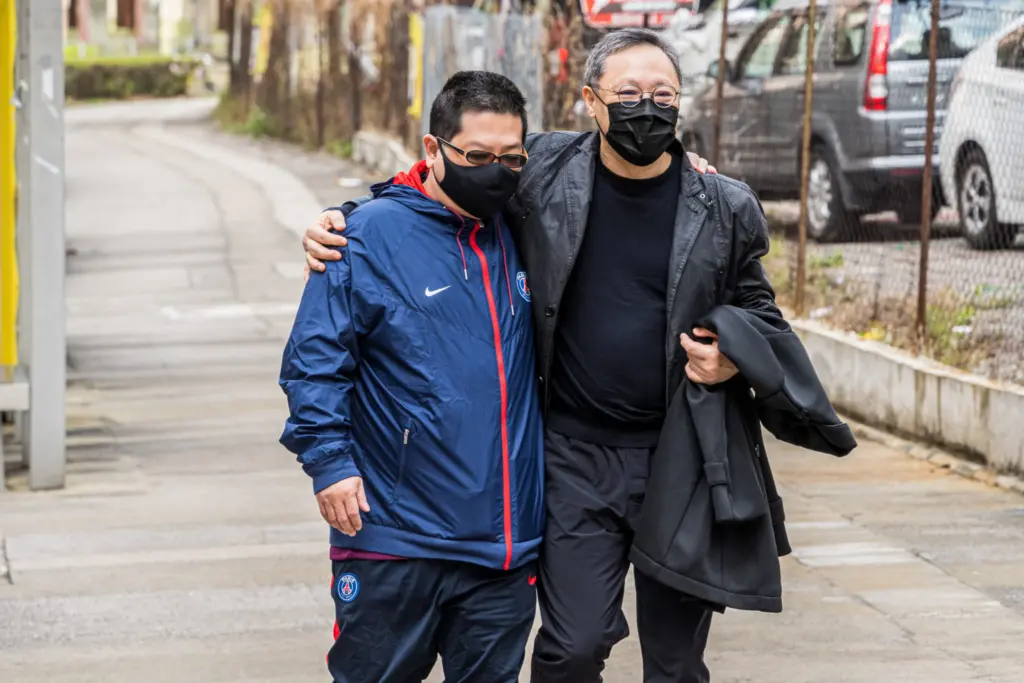
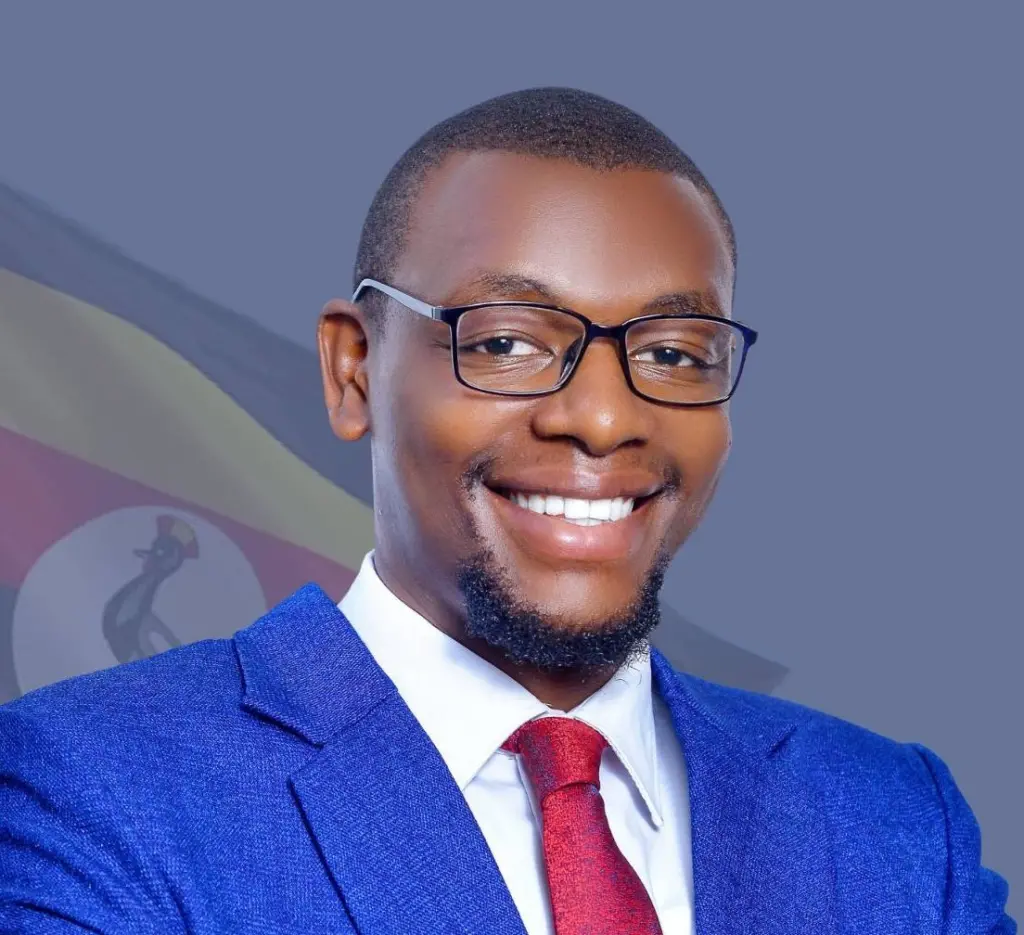
In a handful of these cases, repeated arrests appear intended to essentially tire out their target and force submission, especially when the individual persists in writing and speaking out. Cuban lyricist and rapper Maykel Castillo Pérez was released after serving a year in prison in 2019, but was then arbitrarily arrested at least four separate times in 2020 and at least three separate times in 2021. He was most recently detained on May 18, 2021 and has remained in jail since.269“Régimen cubano libera al rapero Maykel Osorbo,” ADN Cuba, April 18, 2020, adncuba.com/noticias-de-cuba/derechos-humanos/regimen-cubano-libera-al-rapero-maykel-osorbo; Lázaro Javier Chirino, “Policía cubana detiene al rapero Maykel Osorbo: No sabemos dónde lo tienen, aseguran sus amigos,” Ciber Cuba, April 8, 2020, cibercuba.com/noticias/2020-08-04-u199482-e199482-s27061-policia-cubana-detiene-al-rapero-maykel-osorbo-no-sabemos; “Rapero cubano Maykel Osorbo es detenido a golpes por 7 policías,” Periódico Cubano, September 28, 2020, periodicocubano.com/el-rapero-cubano-maykel-osorbo-detenido-a-golpes-por-7-agentes-de-la-policia/; “Directorio Democrático Cubano denuncia incremento de la represión en Cuba,” Martí, November 16, 2020, radiotelevisionmarti.com/a/directorio-democr%C3%A1tico-cubano-denuncia-incremento-de-la-represi%C3%B3n-en-cuba/279018.html; “Arrestan en Cuba a Maykel Osorbo, cantante de ‘Patria y vida,’” El Pitazo, March 9, 2021, elpitazo.net/internacional/arrestan-en-cuba-a-maykel-osorbo-cantante-de-patria-y-vida/; Karla Pérez, “ONU exige al régimen cubano dar a conocer paradero de Maykel Osorbo,” ADN Cuba, May 28, 2021, adncuba.com/noticias-de-cuba/derechos-humanos/onu-exige-conocer-paradero-de-osorbo Ugandan satirical novelist and fiction writer Kakwenza Rukirabashaija was arrested in 2021, after already enduring two separate detentions in 2020 for his fiction novel The Greedy Barbarians. Before his third arrest, he had published another book—Banana Republic—and received the PEN Pinter International Writer of Courage Award conferred by English PEN. In December 2021, he was abruptly arrested and charged with “offensive communication” for tweeting. In January 2022, after Rukirabashaija was finally released—and after he was tortured in custody and his lawfully ordered release was delayed—plainclothes state agents seized him mere hours after his release on bail and detained him in an unknown location.270“Ugandan novelist detained again despite release order: Lawyer,” Al Jazeera, January 25, 2022, aljazeera.com/news/2022/1/25/ugandan-novelist-detained-again-despite-release-order-lawyer; “Ugandan author Kakwenza Rukirabashaija flees the country: Lawyer,” Al Jazeera, February 9, 2022, aljazeera.com/news/2022/2/9/ugandan-author-flees-after-alleged-torture-says-lawyer Mohamed Tajadit, an Algerian poet and activist, was detained in April 2021, one week after he was released from a four-month sentence for participating in the Hirak (hirak meaning “movement” in Arabic) protests and speaking out against the president. This was the third time in three years Tajadit, who is affectionately known as the “poet of the Hirak”271“Three Algerian activists on hunger strike hospitalized in prison protest,” Al Arabiya News, January 6, 2021, english.alarabiya.net/News/north-africa/2021/01/06/Three-Algerian-activists-on-hunger-strike-hospitalized-in-prison-protest for reciting his verses during demonstrations, has been detained.272Jasper Hamann, “Algeria: Hirak Protesters Call For Ramadan Amnesty For Activists,” Morocco World News, April 10, 2021, moroccoworldnews.com/2021/04/339426/algeria-hirak-protesters-call-for-ramadan-amnesty-for-activists
Languishing Behind Bars: Long-term Imprisonments and Life Sentences
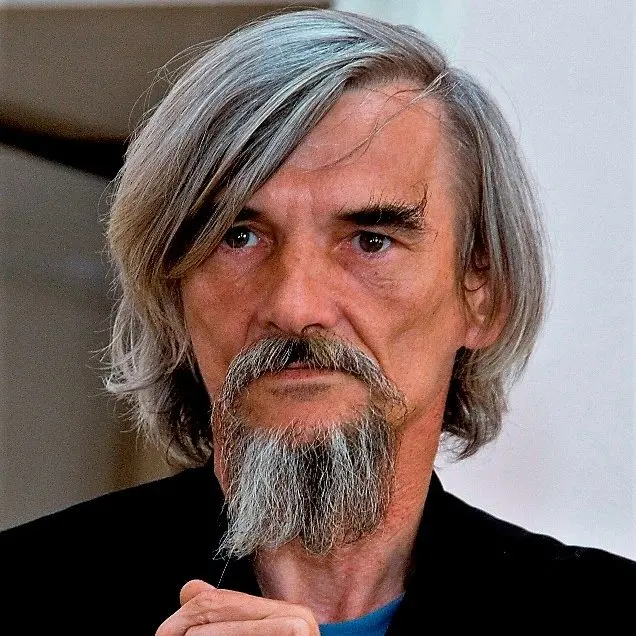
Russian historian Yury Dmitriev is serving 15 years in prison on retaliatory charges for his research and writing about Stalin-era atrocities. (Photo by Mediafond)
At least 62 of the writers included in the 2021 Freedom to Write Index are serving long-term sentences, ranging from 10 years to life in prison. Of these, at least 11 writers are serving sentences of life imprisonment—including the 7 Eritrean writers who have been detained incommunicado and without charge since the early 2000s after a crackdown on independent media and who are effectively condemned to de facto life sentences—and at least 34 writers had been serving sentences of more than 15 years. These 62 writers represent just over a fifth of the total number of writers behind bars, illustrating the extreme costs associated with free expression in many of the world’s most closed and repressive countries, where the legal system has been completely subverted to political prerogatives and delivers harsh penalties rather than upholding the rule of law.
Because these cases can go years without a significant development, they often get little international media or foreign government attention, which can inadvertently further the interests of the governments behind these detentions; they wish to make these “problematic” individuals go away, and long sentences, often combined with significant restrictions on access or communications with the detained individual, can effectively achieve that goal. It can also be understandably difficult for family and other advocates to sustain energy over such long periods, and governments enacting these long punishments rely on the likelihood of that fatigue. The Freedom to Write Index often focuses on new detentions and those individuals caught up in recent turmoil in places like Myanmar or Belarus. But it is also essential to shine a light on the writers and intellectuals whom governments are working hard to keep in the shadows.
Writers and public intellectuals serving long-term sentences, ranging from 10 years to life in prison, comprise just over one-fifth of the 2021 Index.
The majority of these cases are in China, although Vietnam and Eritrea also stand out for their high concentrations of lengthy sentences and long-term imprisonments. In Vietnam, 70 percent of jailed writers are serving sentences of 10 or more years in prison, while six of the eight imprisoned writers in Eritrea have been arbitrarily detained for over 20 years; and one Eritrean writer for over 15 years. While few imprisoned writers around the world currently face an official death penalty, the handing down of long sentences and open-ended detentions is often itself a “life sentence,” particularly in the cases of writers who are elderly or in poor health at the start of their sentence, and are frequently subjected to poor prison conditions, torture, and a lack of access to medical care. For example, the celebrated writer and publisher Haji Mirzahid Kerimi was said to have suffered from a serious health condition before passing away in Chinese custody at the age of 82.273“Prominent Uyghur Poet and Author Confirmed to Have Died While Imprisoned,” Radio Free Asia, January 25, 2021, rfa.org/english/news/uyghur/poet-01252021133515.html Known for his books and poems about Uyghur literature and history, Kerimi died in January 2021 while serving an 11-year prison sentence for his writing. Kazakh poet and author Aron Atabek was released on medical parole in October 2021 after serving most of his 18-year prison sentence in Kazakhstan.274“Kazakh Court Orders Release Of Jailed Dissident Poet, Reportedly In Poor Health,” Radio Free Europe, October 1, 2021, rferl.org/a/aron-atabek-release-prison-kazakhstan/31487474.html While incarcerated, he endured periods of solitary confinement, torture, and beatings, on top of already suffering from heart disease, diabetes, and arthritis. In November 2021, Atabek died while being treated in a Kazakh hospital for COVID-19, just one month after being released.275“Released After 18 Years In Prison, Dissident Kazakh Poet Dies After COVID-19 Hospitalization,” Radio Free Europe, November 24, 2021, rferl.org/a/kazakhstan-atabek-dissident-poet-dead/31577362.html
Abduljalil Al-Singace represents another case in which long-term detentions pose severe and life-threatening health risks. A Bahraini blogger, human rights activist, and engineer, Al-Singace is a decade into a lifetime prison sentence. Best known for his blog Al-Faseelah, where he published articles critical of Bahrain’s authoritarian governance, Al-Singace was first arrested in January 2009 for “inciting hatred against the regime,” and was later sentenced to life imprisonment for his peaceful role in Bahrain’s 2011 uprising.276“Abduljalil Al-Singace,” Bahrain Institute for Rights and Democracy, accessed March 10, 2022, birdbh.org/abduljalil-al-singace/; “Sick Human Rights Defender Must be Release,” Amnesty International, February 14, 2022, amnesty.org/en/wp-content/uploads/2022/02/MDE1152322022ENGLISH.pdf Since then, Al-Singace has been subjected to torture, denial of medical care, and long periods of incommunicado detention. In June 2021, United Nations experts called on Bahrain to immediately release Al-Singace, reporting that he had been forced to make confessions and that his religious books had been confiscated. Soon after, on July 8, 2021, he began a hunger strike to protest the conditions of his imprisonment, demanding the return of a book he had been writing about Bahraini language dialects that was confiscated by prison officials.277“Timeline: Dr Abduljalil Al-Singace’s Hunger Strike,” Bahrain Institute for Rights and Democracy, accessed March 10, 2022, birdbh.org/2021/01/timeline-dr-abduljalil-alsingaces-hunger-strike/; “Bahrain: UN expert alarmed by prolonged detention of human rights defenders,” UN Special Rapporteur on Human Rights Defenders, June 22, 2021, srdefenders.org/bahrain-un-expert-alarmed-by-prolonged-detention-of-human-rights-defenders; “Bahrain: Request for support to free imprisoned human rights defender Dr Abduljalil Al-Singace, on hunger strike since July 2021,” PEN International, January 17, 2022, pen-international.org/news/bahrain-request-for-support-to-free-imprisoned-human-rights-defender-dr-abduljalil-alsingace-on-hunger-strike-since-july-2021/ After more than 240 days of his hunger strike, his severely deteriorating health and lack of adequate medical treatment raise serious concerns that his life is at risk.278“Timeline: Dr Abduljalil Al-Singace’s Hunger Strike,” Bahrain Institute for Rights and Democracy, accessed March 10, 2022, birdbh.org/2021/01/timeline-dr-abduljalil-alsingaces-hunger-strike/
In the case of Russian historian Yury Dmitriev, an initial conviction and sentence of 3 and a half years opened the door for the court to increase his sentence twice, ultimately handing him 15 years in prison. Dmitriev is best known for his research and writing that has uncovered the burial places and mass graves of thousands of victims of Stalin-era mass executions. His work to uncover the truth behind these horrific atrocities have made him a target of the Putin regime, which has worked to rehabilitate the Soviet era and whitewash Stalin-era atrocities.279Alec Luhn, “Gulag grave hunter unearths uncomfortable truths in Russia,” The Guardian, August 3, 2017, theguardian.com/world/2017/aug/03/gulag-grave-hunter-yury-dmitriyev-unearths-uncomfortable-truths-russia In September 2020, 2 months after his initial sentencing of 3 and a half years—and in a closed-door hearing without his lawyer—two acquittals in Dmitriev’s case were overturned and his prison sentence was extended to 13 years. With time served, he was set to be released the next month; but in this extrajudicial move, his imprisonment was extended. In a cruel move, a court added two more years to Dmitriev’s sentence on December 27, 2021.280Kristina Safonova, “Unusual, even for Russia,” Meduza, September 30, 2020, meduza.io/en/feature/2020/09/30/unusual-even-for-russia; “Russian court extends jail term for Gulag historian to 15 years,” Reuters, December 27, 2021, reuters.com/world/europe/russian-court-extends-jail-term-gulag-historian-15-years-2021-12-27/ Dmitriev is also the head of the Karelian branch of Russia’s oldest and most prominent human rights organization, Memorial. On December 28, 2021, as part of the regime’s apparent campaign to obscure history, the Russian Supreme Court ordered Memorial to liquidate itself and close down.281Andrew E. Kramer and Ivan Nechepurenko, “Russian Court Orders Prominent Human Rights Group to Shut,” The New York Times, December 28, 2021, nytimes.com/2021/12/28/world/europe/russia-memorial-human-rights.html
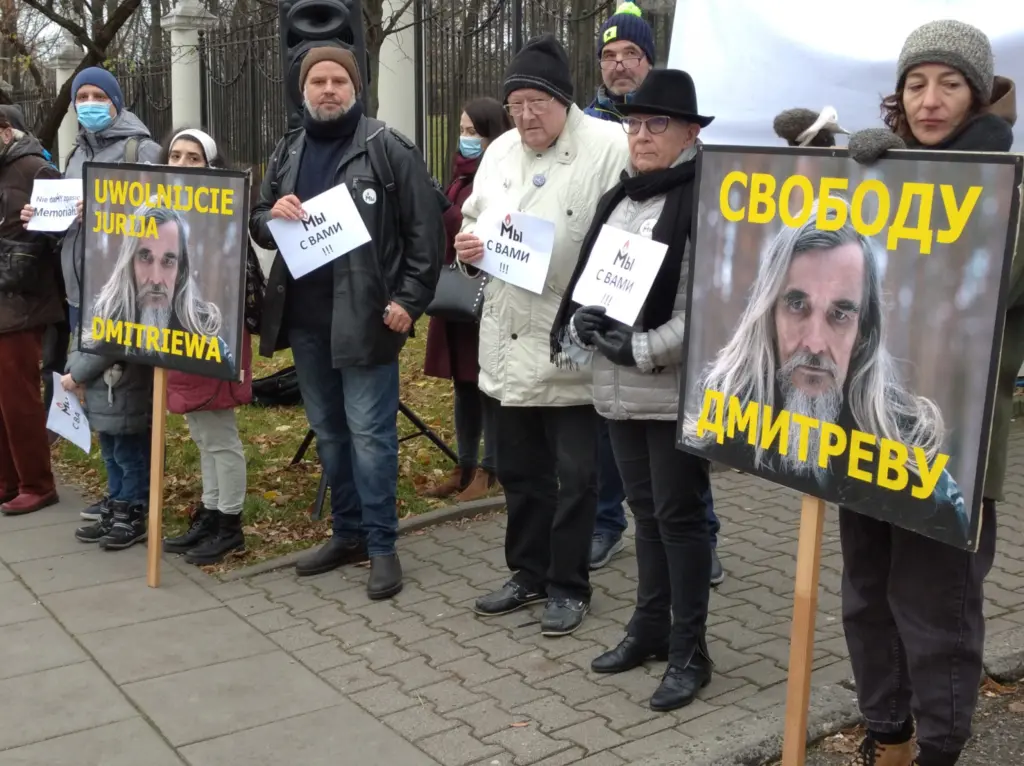
Scholars, authors, and activists who are members of ethnic or religious minority groups are often at an increased risk of forced disappearances, open-ended detentions, and long-term prison sentences. In Xinjiang, China, for example, Uyghur Muslim writers are commonly arrested and held incommunicado, only to resurface years later in Chinese-run detention centers, often hit with heavy sentences of more than 15 years in prison. Such is the case of poet Gulnisa Imin, a prolific writer and teacher of Uyghur literature. On December 4, 2015, Gulnisa Imin began her “One Thousand and One Nights” poetry project, writing and releasing one poem per night, often expressing anguish over China’s crackdown on Uyghur society.282Abdullah Qazanchi and Abduweli Ayup, “The Disappearance of Uyghur Intellectual and Cultural Elites: A New Form of Eliticide,” Uyghur Human Rights Project, December 7, 2021, uhrp.org/wp-content/uploads/2021/12/The-Disappearance-of-Uyghur-Intellectual-and-Cultural-Elites_2021-12-07-1.pdf; Shohret Hoshur, “Uyghur poet imprisoned on separatism charges in China’s Xinjiang,” Radio Free Asia, December 15, 2021, rfa.org/english/news/uyghur/gulnisa-emin-12152021171144.html In March 2018, on the 345th night of her poetry series, she was suddenly cut off from the internet and disappeared.283Shohret Hoshur, “Uyghur poet imprisoned on separatism charges in China’s Xinjiang,” Radio Free Asia, December 15, 2021, rfa.org/english/news/uyghur/gulnisa-emin-12152021171144.html Apparently arrested on the grounds that her poetry “spread thoughts of separatism,” it was not until December 2021 that her detention was confirmed, along with her sentence of 17 years and 6 months in prison.284“Gulnisa Emin, the author of ‘One Thousand and One Nights,’ was sentenced to 17 years and 6 months in prison,” Radio Free Asia, December 6, 2021, rfa.org/uyghur/xewerler/ming-bir-keche-12062021140942.html Ablikim Kalkun, a Uyghur comedian and creative artist, was also handed an 18-year sentence in late 2019 on similar charges, though once again, reports confirming his detention didn’t surface until fall 2020.285“Xinjiang Authorities Jail Prominent Uyghur Comedian Over ‘Extremist and Separatist’ Songs,” Radio Free Asia, October 6, 2020, rfa.org/english/news/uyghur/comedian-10062020124834.html
Two Uyghur writers on PEN America’s case list, Ilham Tohti and Nagyz Muhammed, are currently serving sentences of life imprisonment. Nagyz Muhammed is a poet who worked to preserve Uyghur culture and heritage before his arrest in 2018, during a period that saw a heightened wave of arbitrary arrests and disappearances of Uyghur activists and scholars.286Chris Buckley, “China’s Prisons Swell After Deluge of Arrests Engulfs Muslims,” The New York Times, August 31, 2019, nytimes.com/2019/08/31/world/asia/xinjiang-china-uighurs-prisons.html Muhammed was handed a lifetime prison sentence in September 2020.287“China: Further information: Life imprisonment for missing Kazakh writer: Nagyz Muhammed,” Amnesty International, October 29, 2020, amnesty.org/en/documents/asa17/3279/2020/en/ Likewise, Ilham Tohti, a world-renowned writer, economist, and professor, is serving a sentence of life in prison on charges of separatism.288Edward Wong, “China Sentences Uighur Scholar to Life,” The New York Times, September 23, 2014, nytimes.com/2014/09/24/world/asia/china-court-sentences-uighur-scholar-to-life-in-separatism-case.html?smid=url-share Detained by Chinese authorities in January 2014, Tohti has been called a “Uyghur Mandela” for his decades spent working to promote peace and understanding between Uyghurs and Han Chinese.289Helena Kennedy, “We Uyghurs Have No Say by Ilham Tohti review – a people ignored,” The Guardian, March 9, 2022, theguardian.com/books/2022/mar/09/we-uyghurs-have-no-say-ilham-tohti-review-background-genocide-china Since his arrest, he has been held incommunicado, with no access to family or lawyers since 2017, while allegations of his torture in custody continue to cause concern for his health and well-being.290“PEN Condemns the Denial of Family Visits or Support in Prison for Ilham Tohti,” PEN America, May 15, 2015, pen.org/pen-condemns-the-denial-of-family-visits-or-support-in-prison-for-ilham-tohti/; “China: Human rights defenders given long jail terms, tortured – UN expert,” United Nations Office of the High Commissioner for Human Rights, June 28, 2021, ohchr.org/en/NewsEvents/Pages/DisplayNews.aspx?NewsID=27221&LangID=E; “Ilham Tohti,” United States Commission on International Religious Freedom, accessed March 17, 2022, uscirf.gov/religious-prisoners-conscience/forb-victims-database/ilham-tohti In 2014, he was the recipient of PEN America’s Freedom to Write Award, and in December 2019, Tohti’s daughter accepted the Sakharov Prize for Freedom of Thought on his behalf.291“PEN Honors Ilham Tohti with PEN/Barbara Goldsmith Freedom to Write Award,” PEN America, March 31, 2014, pen.org/press-release/pen-honors-ilham-tohti-with-penbarbara-goldsmith-freedom-to-write-award/; Jonas Ekblom, “Daughter accepts EU Parliament prize on behalf of Uighur activist,” Reuters, December 18, 2019, reuters.com/article/us-eu-sakharov-prize/daughter-accepts-eu-parliament-prize-on-behalf-of-uighur-activist-idUSKBN1YM1GQ
In extreme cases, long-term imprisonments are compounded by capital punishment. In Iran, the writer and activist Arzhang Davoodi, detained since 2003, faces the death penalty for his peaceful political advocacy and writing. Since his initial arrest, Davoodi has suffered prolonged periods of solitary confinement, torture, and repeated transfers, while being denied access to his family and lawyers.292“Iran: A Renewed Call For Information About Political Prisoner Arzhang Davoodi And To Save His Life,” National Council of Resistance of Iran, June 2, 2021, ncr-iran.org/en/ncri-statements/iran-a-renewed-call-for-information-about-political-prisoner-arzhang-davoodi-and-to-save-his-life/ In 2014, he was sentenced to death after already enduring 11 years of detention.293“Iranian writer sentenced to death: Arzhang Davoodi,” Amnesty International, July 24, 2014, amnesty.org/en/documents/mde13/042/2014/en/ Junaid Hafeez, a writer and academic who lectured at Bahauddin Zakariya University in Pakistan, was arrested in March 2013 for allegedly insulting the Prophet Muhammad on social media.294“Junaid Hafeez: Academic sentenced to death for blasphemy in Pakistan,” BBC News, December 21, 2019, bbc.com/news/world-asia-50878432 He has been held in solitary confinement, since 2014, after his lawyer, Rashid Rehman, was murdered in retaliation for agreeing to defend his case.295“Pakistan ‘blasphemy lawyer’ shot dead in Multan office,” BBC News, May 7, 2014, bbc.com/news/world-asia-27319433 In 2019 Hafeez was found guilty of blasphemy and sentenced to death.296Asad Hashim, “Pakistani academic Junaid Hafeez sentenced to death for blasphemy,” Al Jazeera, December 21, 2019, aljazeera.com/news/2019/12/21/pakistani-academic-junaid-hafeez-sentenced-to-death-for-blasphemy
Many of these cases fall off the public radar as the years accumulate and the initial sense of outrage has waned. Such cases require sustained attention in order to draw media attention and to support lobbying efforts before governments and international organizations to work to secure their release.
Conclusion
On January 8, 2022, the Iranian poet, screenwriter, and filmmaker Baktash Abtin died of COVID-19 in a Tehran hospital, while still in state custody serving a six-year sentence in retaliation for his writing and his advocacy for free expression in Iran. Abtin, alongside his fellow members of the Iranian Writers’ Association, Reza Khandan Mahabadi and Keyvan Bajan, had received the PEN/Barbey Freedom to Write Award in October 2021.
Abtin’s devastating and preventable death highlights the severity of the conditions for prisoners in Iran, and the government’s callous disregard for those unjustly detained in its prisons. And it makes plain the heightened dangers facing those in prison around the world in the context of the COVID-19 pandemic; even as some of the world begins to emerge from the constraints of the worst stages of the pandemic, the risks to those behind bars remain high. Abtin’s death also illustrates the courage that writers exhibit when they speak up against repression, when they dare to dissent, and when they insist on continuing to create, no matter the potential cost.
Global solidarity for writers behind bars plays an essential role in sustaining them and their families, and in ensuring that government attempts to silence them do not succeed. Continuing to elevate their work and draw public and media attention to their plight can help to tip the scales for governments and make release more likely. This year’s Index includes many writers who have since been freed, reflecting the fact that such efforts can work, but also the reality that many of the writers released in 2021 still face conditions on their freedom that limit their ability to travel and, in some cases, to speak or write freely.
In videotaped remarks he made to accept the Freedom to Write award while on a brief furlough from prison last fall, Baktash Abtin said, “I hope for a day when no one in the world is imprisoned for their thoughts and for having such a beautiful demand as freedom.” His death must serve as a source of inspiration to continue to call for the freedom of all writers unjustly detained around the world.
About the Freedom to Write Index
The 2021 Freedom to Write Index provides a count of the writers, academics, and public intellectuals who were held in prison or detention during 2021 in relation to their writing or for otherwise exercising their freedom of expression. For the past century, PEN America and the global PEN network have defended the rights of writers and intellectuals to express themselves freely, and advocated on behalf of those who have faced threats as a result of their writing or other forms of expression. The criteria for inclusion in the Freedom to Write Index thus adhere closely to PEN International’s standards for selection for their annual Case List.
The Index is a count of individuals who primarily write literature, poetry, or other creative writing; essays or other nonfiction or academic writing; or online commentary. The Index includes journalists only in cases where they also fall into one of the former categories, or are opinion writers or columnists. To be included in the count, individuals must have spent at least 48 hours behind bars in a single instance of detention between January 1 and December 31, 2021.
For the purposes of the Index and the status designations used to classify cases, imprisonment is considered to be when an individual is serving a sentence following a conviction, while detention accounts for individuals held in custody pending charges, or those who have been charged and are being held prior to conviction. Writers are, of course, also subject to other types of threats, including censorship, harassment, legal charges without detention, or physical attacks, and these are also analyzed to a lesser degree in this report.
PEN America works closely with the PEN International Secretariat and Writers in Prison Committee (WiPC), as well as other members of the global PEN network. The Index and this report draw significantly from PEN International’s Case Lists, which in turn reflect input from PEN Centers around the world. The cases included in the Index are also based on PEN America’s own internal case list, the Writers at Risk Database, and PEN America’s Artists at Risk Connection (ARC) case list. Additionally, PEN America draws from press reports; reports from the families, lawyers, and colleagues of those in prison; and data from other international human rights, press freedom, academic freedom, and free expression organizations. The methodology behind the Index is explained in greater detail here.
The annual Freedom to Write Index has become an essential component of PEN America’s long-standing Writers at Risk Program, which encompasses support for and advocacy on behalf of writers under threat around the world. Another flagship component of PEN America’s year-round advocacy is the PEN/Barbey Freedom to Write Award, given annually to an imprisoned writer targeted for exercising their freedom of expression. Of the 51 jailed writers who have received the Freedom to Write Award from 1987 to 2021, 45 have been released due in part to the global attention and pressure the award generates. PEN America also publishes the Writers at Risk Database, a searchable catalog of the writers, journalists, artists, academics, and public intellectuals under threat around the world, including those counted in the 2019 Index and 2020 Index. This database offers researchers, rights advocates, and the public a wealth of actionable evidence of ongoing global threats to free expression.
Acknowledgments
PEN America is deeply grateful to the John Templeton Foundation for its generous support of the Freedom to Write Index and Writers at Risk Database. PEN America also extends its thanks to PEN International—both the Secretariat and the Writers in Prison Committee (WiPC)—for its collaboration on this project. The Freedom to Write Index report was written by PEN America Director of Free Expression at Risk Programs Dr. Karin Deutsch Karlekar and Free Expression Programs Coordinator Veronica Tien. Free Expression Programs interns Daria Locher and Rosy Fitzgerald provided essential support with research, data analysis, drafting, references, and fact-checking. Washington Director Nadine Farid Johnson provided support drafting and reviewing, and Legislative and Research Analyst Andy Gottlieb also provided essential review and support. Eurasia Program Director Polina Sadovskaya, Artists at Risk Connection (ARC) Director Julie Trébault, and Artists at Risk Connection Program Assistant Juliette Verlaque provided assistance on case research.
The report was reviewed and edited by James Tager, PEN America’s director of research, and by Summer Lopez, senior director of Free Expression Programs, who also provided guidance and oversight for the project.
PEN America offers special thanks to interns, volunteers, and fellows Ashley Arancibia, Jake Neuberger, Chiara Caremoli, D. Zhang, Violet Barton, Elizabeth Huang, Juan Fueyo-Gomez, Tala Semaan, and Dounia Benslimane for their support with research and fact-checking throughout the year.


